#what I really need to do is edit this one particular section so I can forget it exists
Explore tagged Tumblr posts
Text
IM WRITING MY FIC AND ITS HURTING MY BRAIN
#I haven’t had this problem since chapter 10#what I really need to do is edit this one particular section so I can forget it exists#otherwise the section I’m writing now doesn’t make sense#it’s so hard to keep everything consistent when ur writing a mindfuck fic#I think one reason it’s taking me so long to write this chapter is bc I’ve been debating whether or not to do X#based on so many other pieces of the fic#BUT AGAINST MY BETTER JUDGMENT#I’ve decided to do it#and now I have to make it work#uggghhhhh why can’t it just exist it’s already perfect in my brain#actually. lot of my problems with this originate in. chapter 10#curses myself from the past
3 notes
·
View notes
Text
autocrattic (more matt shenanigans, not tumblr this time)
I am almost definitely not the right person for this writeup, but I'm closer than most people on here, so here goes! This is all open-source tech drama, and I take my time laying out the context, but the short version is: Matt tried to extort another company, who immediately posted receipts, and now he's refusing to log off again. The long version is... long.
If you don't need software context, scroll down/find the "ok tony that's enough. tell me what's actually happening" heading, or just go read the pink sections. Or look at this PDF.
the background
So. Matt's original Good Idea was starting WordPress with fellow developer Mike Little in 2003, which is free and open-source software (FOSS) that was originally just for blogging, but now powers lots of websites that do other things. In particular, Automattic acquired WooCommerce a long time ago, which is free online store software you can run on WordPress.
FOSS is... interesting. It's a world that ultimately is powered by people who believe deeply that information and resources should be free, but often have massive blind spots (for example, Wikipedia's consistently had issues with bias, since no amount of "anyone can edit" will overcome systemic bias in terms of who has time to edit or is not going to be driven away by the existing contributor culture). As with anything else that people spend thousands of hours doing online, there's drama. As with anything else that's technically free but can be monetized, there are:
Heaps of companies and solo developers who profit off WordPress themes, plugins, hosting, and other services;
Conflicts between volunteer contributors and for-profit contributors;
Annoying founders who get way too much credit for everything the project has become.
the WordPress ecosystem
A project as heavily used as WordPress (some double-digit percentage of the Internet uses WP. I refuse to believe it's the 43% that Matt claims it is, but it's a pretty large chunk) can't survive just on the spare hours of volunteers, especially in an increasingly monetised world where its users demand functional software, are less and less tech or FOSS literate, and its contributors have no fucking time to build things for that userbase.
Matt runs Automattic, which is a privately-traded, for-profit company. The free software is run by the WordPress Foundation, which is technically completely separate (wordpress.org). The main products Automattic offers are WordPress-related: WordPress.com, a host which was designed to be beginner-friendly; Jetpack, a suite of plugins which extend WordPress in a whole bunch of ways that may or may not make sense as one big product; WooCommerce, which I've already mentioned. There's also WordPress VIP, which is the fancy bespoke five-digit-plus option for enterprise customers. And there's Tumblr, if Matt ever succeeds in putting it on WordPress. (Every Tumblr or WordPress dev I know thinks that's fucking ridiculous and impossible. Automattic's hiring for it anyway.)
Automattic devotes a chunk of its employees toward developing Core, which is what people in the WordPress space call WordPress.org, the free software. This is part of an initiative called Five for the Future — 5% of your company's profits off WordPress should go back into making the project better. Many other companies don't do this.
There are lots of other companies in the space. GoDaddy, for example, barely gives back in any way (and also sucks). WP Engine is the company this drama is about. They don't really contribute to Core. They offer relatively expensive WordPress hosting, as well as providing a series of other WordPress-related products like LocalWP (local site development software), Advanced Custom Fields (the easiest way to set up advanced taxonomies and other fields when making new types of posts. If you don't know what this means don't worry about it), etc.
Anyway. Lots of strong personalities. Lots of for-profit companies. Lots of them getting invested in, or bought by, private equity firms.
Matt being Matt, tech being tech
As was said repeatedly when Matt was flipping out about Tumblr, all of the stuff happening at Automattic is pretty normal tech company behaviour. Shit gets worse. People get less for their money. WordPress.com used to be a really good place for people starting out with a website who didn't need "real" WordPress — for $48 a year on the Personal plan, you had really limited features (no plugins or other customisable extensions), but you had a simple website with good SEO that was pretty secure, relatively easy to use, and 24-hour access to Happiness Engineers (HEs for short. Bad job title. This was my job) who could walk you through everything no matter how bad at tech you were. Then Personal plan users got moved from chat to emails only. Emails started being responded to by contractors who didn't know as much as HEs did and certainly didn't get paid half as well. Then came AI, and the mandate for HEs to try to upsell everyone things they didn't necessarily need. (This is the point at which I quit.)
But as was said then as well, most tech CEOs don't publicly get into this kind of shitfight with their users. They're horrid tyrants, but they don't do it this publicly.
ok tony that's enough. tell me what's actually happening
WordCamp US, one of the biggest WordPress industry events of the year, is the backdrop for all this. It just finished.
There are.... a lot of posts by Matt across multiple platforms because, as always, he can't log off. But here's the broad strokes.
Sep 17
Matt publishes a wanky blog post about companies that profit off open source without giving back. It targets a specific company, WP Engine.
Compare the Five For the Future pages from Automattic and WP Engine, two companies that are roughly the same size with revenue in the ballpark of half a billion. These pledges are just a proxy and aren’t perfectly accurate, but as I write this, Automattic has 3,786 hours per week (not even counting me!), and WP Engine has 47 hours. WP Engine has good people, some of whom are listed on that page, but the company is controlled by Silver Lake, a private equity firm with $102 billion in assets under management. Silver Lake doesn’t give a dang about your Open Source ideals. It just wants a return on capital. So it’s at this point that I ask everyone in the WordPress community to vote with your wallet. Who are you giving your money to? Someone who’s going to nourish the ecosystem, or someone who’s going to frack every bit of value out of it until it withers?
(It's worth noting here that Automattic is funded in part by BlackRock, who Wikipedia calls "the world's largest asset manager".)
Sep 20 (WCUS final day)
WP Engine puts out a blog post detailing their contributions to WordPress.
Matt devotes his keynote/closing speech to slamming WP Engine.
He also implies people inside WP Engine are sending him information.
For the people sending me stuff from inside companies, please do not do it on your work device. Use a personal phone, Signal with disappearing messages, etc. I have a bunch of journalists happy to connect you with as well. #wcus — Twitter I know private equity and investors can be brutal (read the book Barbarians at the Gate). Please let me know if any employee faces firing or retaliation for speaking up about their company's participation (or lack thereof) in WordPress. We'll make sure it's a big public deal and that you get support. — Tumblr
Matt also puts out an offer live at WordCamp US:
“If anyone of you gets in trouble for speaking up in favor of WordPress and/or open source, reach out to me. I’ll do my best to help you find a new job.” — source tweet, RTed by Matt
He also puts up a poll asking the community if WP Engine should be allowed back at WordCamps.
Sep 21
Matt writes a blog post on the WordPress.org blog (the official project blog!): WP Engine is not WordPress.
He opens this blog post by claiming his mom was confused and thought WP Engine was official.
The blog post goes on about how WP Engine disabled post revisions (which is a pretty normal thing to do when you need to free up some resources), therefore being not "real" WordPress. (As I said earlier, WordPress.com disables most features for Personal and Premium plans. Or whatever those plans are called, they've been renamed like 12 times in the last few years. But that's a different complaint.)
Sep 22: More bullshit on Twitter. Matt makes a Reddit post on r/Wordpress about WP Engine that promptly gets deleted. Writeups start to come out:
Search Engine Journal: WordPress Co-Founder Mullenweg Sparks Backlash
TechCrunch: Matt Mullenweg calls WP Engine a ‘cancer to WordPress’ and urges community to switch providers
Sep 23 onward
Okay, time zones mean I can't effectively sequence the rest of this.
Matt defends himself on Reddit, casually mentioning that WP Engine is now suing him.
Also here's a decent writeup from someone involved with the community that may be of interest.
WP Engine drops the full PDF of their cease and desist, which includes screenshots of Matt apparently threatening them via text.
Twitter link | Direct PDF link
This PDF includes some truly fucked texts where Matt appears to be trying to get WP Engine to pay him money unless they want him to tell his audience at WCUS that they're evil.
Matt, after saying he's been sued and can't talk about it, hosts a Twitter Space and talks about it for a couple hours.
He also continues to post on Reddit, Twitter, and on the Core contributor Slack.
Here's a comment where he says WP Engine could have avoided this by paying Automattic 8% of their revenue.
Another, 20 hours ago, where he says he's being downvoted by "trolls, probably WPE employees"
At some point, Matt updates the WordPress Foundation trademark policy. I am 90% sure this was him — it's not legalese and makes no fucking sense to single out WP Engine.
Old text: The abbreviation “WP” is not covered by the WordPress trademarks and you are free to use it in any way you see fit. New text: The abbreviation “WP” is not covered by the WordPress trademarks, but please don’t use it in a way that confuses people. For example, many people think WP Engine is “WordPress Engine” and officially associated with WordPress, which it’s not. They have never once even donated to the WordPress Foundation, despite making billions of revenue on top of WordPress.
Sep 25: Automattic puts up their own legal response.
anyway this fucking sucks
This is bigger than anything Matt's done before. I'm so worried about my friends who're still there. The internal ramifications have... been not great so far, including that Matt's naturally being extra gung-ho about "you're either for me or against me and if you're against me then don't bother working your two weeks".
Despite everything, I like WordPress. (If you dig into this, you'll see plenty of people commenting about blocks or Gutenberg or React other things they hate. Unlike many of the old FOSSheads, I actually also think Gutenberg/the block editor was a good idea, even if it was poorly implemented.)
I think that the original mission — to make it so anyone can spin up a website that's easy enough to use and blog with — is a good thing. I think, despite all the ways being part of FOSS communities since my early teens has led to all kinds of racist, homophobic and sexual harm for me and for many other people, that free and open-source software is important.
So many people were already burning out of the project. Matt has been doing this for so long that those with long memories can recite all the ways he's wrecked shit back a decade or more. Most of us are exhausted and need to make money to live. The world is worse than it ever was.
Social media sucks worse and worse, and this was a world in which people missed old webrings, old blogs, RSS readers, the world where you curated your own whimsical, unpaid corner of the Internet. I started actually actively using my own WordPress blog this year, and I've really enjoyed it.
And people don't want to deal with any of this.
The thing is, Matt's right about one thing: capital is ruining free open-source software. What he's wrong about is everything else: the idea that WordPress.com isn't enshittifying (or confusing) at a much higher rate than WP Engine, the idea that WP Engine or Silver Lake are the only big players in the field, the notion that he's part of the solution and not part of the problem.
But he's started a battle where there are no winners but the lawyers who get paid to duke it out, and all the volunteers who've survived this long in an ecosystem increasingly dominated by big money are giving up and leaving.
Anyway if you got this far, consider donating to someone on gazafunds.com. It'll take much less time than reading this did.
#tony muses#tumblr meta#again just bc that's my tag for all this#automattic#wordpress#this is probably really incoherent i apologise lmao#i may edit it
750 notes
·
View notes
Text
Werebear Halsin Headcanon
I have seen a couple other posts going around about werebear Halsin and wanted to make my own with some of my thoughts/evidence because I have been a werebear truther since I first saw the beefy elf daddy.
This doesn't really have spoilers in it, but I do touch on a couple plot points from the game. Fair warning! I also pull a lot from D&D itself, specifically 5th edition since that's what BG3 is built on.
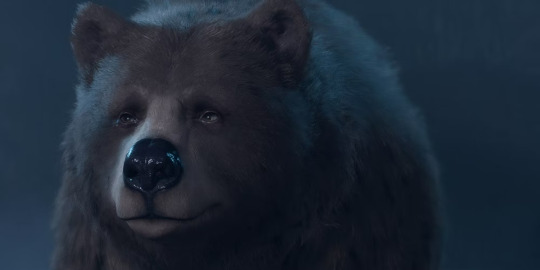
This ended up being long, so I split it into a few different categories, they are in no particular order:
Quite large for an elf
We all know, Halsin is big. Large even. In D&D, elves are described as being slender and slight. Even if they are athletic they are not muscular and are lighter than other races of the same size (as in a 5'5" human will weigh more than a 5'5" elf). They are a little shorter than humans on average.
This puts Halsin well outside the usual elf physiology. When this is addressed in game, Halsin says perhaps he has some orc ancestry or "conventional wisdom is too narrow about what someone can or cannot be" (beautiful sentiment Halsin, you're still big).
Being a werebear offers a simple explanation for his unusual size. Werebear in D&D are described as being large and muscular, even in their humanoid form.
It's a "Wildshape"
Sure buddy.
Halsin's bear form is explained away as one of his druid wildshapes, but there are a couple things that don't line up.
First is the UI itself. Halsin’s bear form is separate from wildshape. It’s in the general abilities section not the class features. This might be just for programming reasons, but I still think it’s interesting.
Second and more incriminating, Halsin stays in bear form for too long. ACT 1 Spoilers: When you find Halsin in the Goblin Camp, the Goblins don't know he's a dude, they just think he's a bear. Even if in the stories timeline you're supposed to reach him the same day as when he was kidnapped, that's still a long time to maintain a wildshape. As per DND 5e rules: "You can stay in a beast shape for a number of hours equal to half your druid level (rounded down)."
So even if Halsin is STARTING as a max BG3 level druid at level 12, he should only maintain wildshape for 6 hours. Even as a Circle of the Moon druid, the time doesn't increase.
"I...lost the run of myself"
Related to the idea that Halsin's bear form is a wildshape, I need to touch on the parts of the game that indicate Halsin can lose control of his bear form.
My main piece of evidence here is that wildshape in D&D has no indication that you lose any control of your impulses. In fact, wildshape describes the opposite: "Your game statistics are replaced by the statistics of the beast, but you retain your alignment, personality, and Intelligence, Wisdom, and Charisma scores."
The fact you retain your mental stats mean you are in total control. There is no mental difference between a druid in wildshape and a druid in their humanoid form. To be in wildshape is a CHOICE the druid makes.
This is in contrast to spells like Polymorph which indicate that you lose your mental stats AS WELL as your physical ones: "The target's game statistics, including mental ability scores, are replaced by the statistics of the chosen beast. It retains its alignment and personality."
I bring that up just to showcase that D&D does have that distinction, if wildshape was meant to be something that you could lose control of, or let the beast take over, they would have written it that way.
ACT 3 spoilers: This idea that he can be made to lose control is also hinted at if Orin kidnaps him from your camp. Orin's dialogue from the kidnapped victim usually indicates a deep-seated fear the victim has, or their worst case scenario. Having kidnapped Halsin describe himself losing control indicates to me that it's his biggest fear. Which makes sense as a werebear, as a druid…not so much.
In contrast to wildshape, which is a voluntary choice the druid makes, being a werebear is a curse. Halsin is obviously in good control of his werebear self (I discuss this later on), but it is still a curse and can affect him negatively, especially in impulse and instinct.
Alignment: Neutral Good
Now I've got to talk about the werebear curse a little more. And D&D lycanthropy in general.
When someone is afflicted with the curse and resists it, they maintain their normal alignment but struggle to contain the beast. If an afflicted person chooses to accept the beast they gain more control over their bestial form, but lose their alignment to the alignment of the kind of lycanthrope they are.
Both Halsin and the canon D&D werebear are Neutral Good. Which means Werebear Halsin is in alignment with his bestial side, offering some manner of control over his transformations.
Only you can prevent shadow curses.
Werebear are described as being lone hermits who guard their territories fiercely, protecting their habitat, and the flora and the fauna from any threat. Sounds like a werebear might get really obsessive trying to rid his territory of, say, a Shadow curse.
Halsin and Thaniel's relationship makes a lot more sense if Halsin is a werebear. They met when Halsin was a child, so Halsin wouldn't have been a druid yet. In D&D druids are a learned class, more like clerics. Certainly Halsin could been a child in touch with nature, but why did Thaniel single him out?
If Halsin was a werebear though, he would have already had a natural desire to protect the land, the land being personified as Thaniel.
The werebear curse is described in D&D as usually being passed on voluntarily, as in a werebear chooses who they want to bite, either a companion or an apprentice. Werefolk curses also pass through bloodlines (as in you can be born a werefolk). The general consensus is if you are born a werefolk you will naturally align with the curse's alignment so you will innately be in more control then a bitten werefolk. We already know Halsin is Neutral Good, like werebears usually are.
This is a more headcanon-y part, but I think Halsin’s family were probably all werebear, or at least one of his parents was and from a lineage that had a history protecting the land Halsin grew up on. Knowing that Halsin's family all passed away, this could also indicate why Thaniel singled him out, maybe Halsin was the last in the werebear lineage that had chosen to defend the land Thaniel personified.
Either way, Halsin and the werebear align in the desire to protect natural spaces, and Halsin's obsession with the shadow curse could stem from that innate desire.
This isn't my first time recruiting a werefolk druid
This is meta evidence, but I'm including it. In BG2 there is a druid named Cernd and he’s a werewolf! What does this have to do with Halsin? Not a lot, but it shows that having a companion who is a werewolf is established in the universe. Cernd also establishes that being a druid helps to control a werecreature curse. Cernd isn’t feral and has greater control over his werewolfism because of his abilities as a druid. Also Cernd has magic items that are from High Forest. If that sounds familiar, it's where Halsin says his family is buried. idk the connection but it's interesting.
Final thoughts
I think that's all?? I also want to talk about why I think the Werebear curse wasn't brought up in game.
One of the other posts I saw suggested that the reason it’s not brought up in game is Halsin doesn’t know he's a werebear. I get that, I can totally see that, but I don’t think that does Halsin justice. Halsin may be a beefy boy, but he isn't oblivious. There is no way Halsin has lived for 350 years and hasn’t realized he’s a werebear. 350 years is a long time not to bite anyone.
I think the more likely explanation in game is simply that it never comes up. Halsin is in control (mostly) and not worried about it. He is also not used to having people who care for him (this is a huge part of his characterization in game), and probably has had to keep the fact that he is a werebear relatively secret throughout his life.
From a meta perspective, I think it was cut for time and content. We KNOW that a lot of his content was cut already (Sorrow, anyone?). There is also the fact that originally one of the other origin characters was going to be a werewolf, so they may have decided to ease back on Halsin being a werebear so she would be more unique. Then she ceased to exist anyway. Personally I think they should have included some dialogue about it somewhere, especially after deciding not to have the werewolf companion. I genuinely can’t FATHOM that werebear Halsin wasn’t the plan all along, regardless of if they decided to cut it. Alright I'm done. Werebear believers unite!
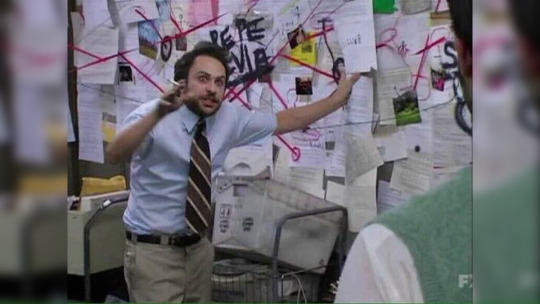
225 notes
·
View notes
Text
WIP Wednesday
Thank you for the tags @loki-is-my-kink-awakening and @impulsemuppet!!
🚨 THIS IS A TWO-PARTER!! 🚨
Have a BEEG snippet from me and @ghoulehhh just cause we feel nice! This is part 1! Here's the second part 😉
Loki’s face settles into a calm mask, the small, smug smile resting on his lips radiating a sense of ease - even if he can feel his bones shaking with excitement…and maybe fear. That feeling only intensifies as he sets foot in the room, the door swinging shut behind him with a chilling finality once he’s cleared the threshold. Striding towards the table with confidence, he slides into the empty seat opposite the prisoner and drops his folder down. The grizzled Variant sitting there only reacts once the chair scrapes the floor and the folder hits the table. He’s still slouching in his own chair, hands remaining in his lap - but at least there’s an air of recognition amidst his general state of malaise, something that could vaguely pass for rapt attention. Loki flips open to the top page as he settles in, deciding the timestick he’s brought should stay in his lap - well out of the other man’s reach. Instead of sprawling out like he would normally, he keeps his legs firmly tucked in towards his side. He can’t place why he feels the need to exercise such caution, but something inside prods him to do so. Better safe than sorry. “So…M-KI211 is it?” he starts, keeping things casual and his tone light. His attention is on the stack of papers, pretending like he isn’t the least bit interested in anything else. “...Or do you have a less formal name I can call you?” “That’s what they’re callin’ me?” the gray-haired man replies after a few moments, his voice dull and even. There’s a shallow sigh, a look of disappointment crossing his features. And then he’s mumbling: “Dunno what I expected. Sounds kinda boring.” Hearing Mobius’ voice come out of the stranger’s mouth is jarring to say the least. It’s the same, unmistakably so, but it sounds so dead compared to the original. Loki resists the urge to frown, thoughts already racing through his head about who this particular Variant could be, what could have possibly happened to him to make him already so different to the Mobius he knows. Not-Mobius lifts his cuffed hands just so he can scratch at a little itch on his cheek, the pad of his blackened thumb rubbing close to the fissure that’s running straight down from his hairline. Loki’s eyes follow him as he moves, watching those charred fingers linger on vivid blue lines before he lets them drop back down into his lap with a clink of the metal cuffs. Overall, he looks tired and thoroughly battered, like he might fall apart right here, skin worn and bruised and sickly-looking - and yet Loki can still feel a power radiating from him. He glances a bit further up, making eye contact with those faintly glowing blue irises and regretting it immediately. It’s familiar, that something - almost intoxicatingly so. The Variant’s lip curls into a slightly more pronounced smile - an amused one - and Loki quickly looks away, back down at the document. “Well, it’s one of the names here,” he comments, flipping through a few pages of the document, most of which have heavy edits and large sections completely crossed out, all with different variant numbers attached. He’s not really reading much of anything, eyes skimming the text instead. “Though you’re quite right - it is rather boring.” He straightens in his chair, looking back up from the document with an apathetic nod of his head. “What would you expect me to call you?”
Tagging mostly so people can see, since I'm late YET AGAIN 😅
@elodiah @lokimobius @natendo-art @kcscribbler @kusakichan15
@mythical-magik @devilbearingtrouble @mirilyawrites @scifikimmi @silentxsymphony
@ilaytrapsfortroubadours @boredintjqueen @rin-love-is-green @stillwanderingflame @andthekitchensinkao3
@insert-witty-user-name-here @blackbirdofasgard @dreamycloud @distracteddream @mobius-m-mobius
@mobiusismycomfortcharacter @dilfmobius @adorbspotat
#WIP#WIP Wednesday#WIP Game#Lokius#Loki x Mobius#Mobius x Loki#Loki#Mobius#loki laufeyson#loki odinson#mobius m mobius#Loki Series#Fanfic#Fic#Writing#My Writing#Mr Tesseract#Your Paradox Is Blue
53 notes
·
View notes
Text
what if i wanted to make another insane promo post?
yeah, ik, its promo time again. BUT this time around i do wanna add in the post both my cousin and niece
one thing i did get wrong, heartz is my niece, starz is my cousin! this will basically be going over what each of these 2 do (...and im also adding in a bonus competitor/promoed person, well actually 2 because I GOT A CHANNEL YIPPEE)
each channel will be seperated up so yeah lets go!
first channel:

Starzzz.andgalaxy (my actual cousin, lol) is a great yter who absolutely deserves to be celebrating more then just 170 subs! since shes actually here with me, i can let her say a lil something on the matter:
"hello! I would love to reach 200 subscribers at least, I think my hard work should not be for nothing!" <- her typing
shes very very fun (and also with this i hope all the god damn hate comments shut lol) and does very cool things such as:
Roblox videos
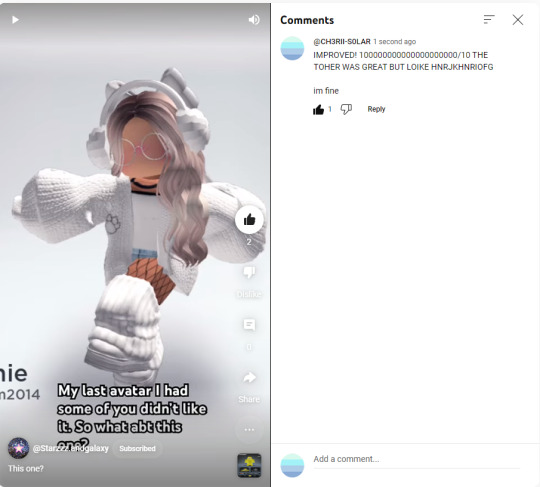
(comment is from me lol, we'll get there soon) For right now these are just rating videos of her avatar, but I find them very fun (plus since I play roblox if needed I can help with filming lol)! Not much to say on it cause it's not a common kind of post, so onto the next form, which is:
2. Art
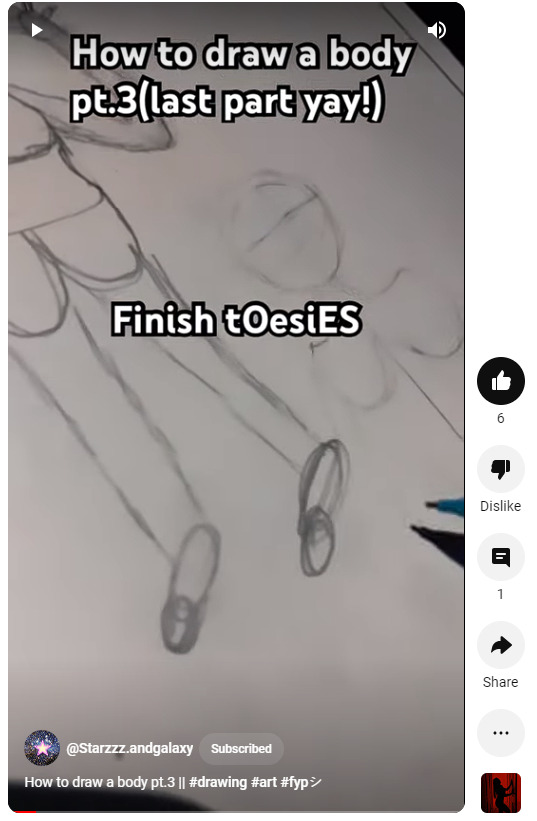
As you can see, she does very cool art, this one in particular is a tutorial on how to draw bodies. Is it the best? No, but the fact she's trying makes it great! (this is also where I've seen a couple hate comments come up, so yeah, I'm trying to be mature enough to not commit violence for her upon them) She does admit this video isn't her best work, but she does A LOT of very very cool drawings! Go check them out and her channel of course! There is one thing she also posts about which I love most of all...
3. Paper Dragons!!
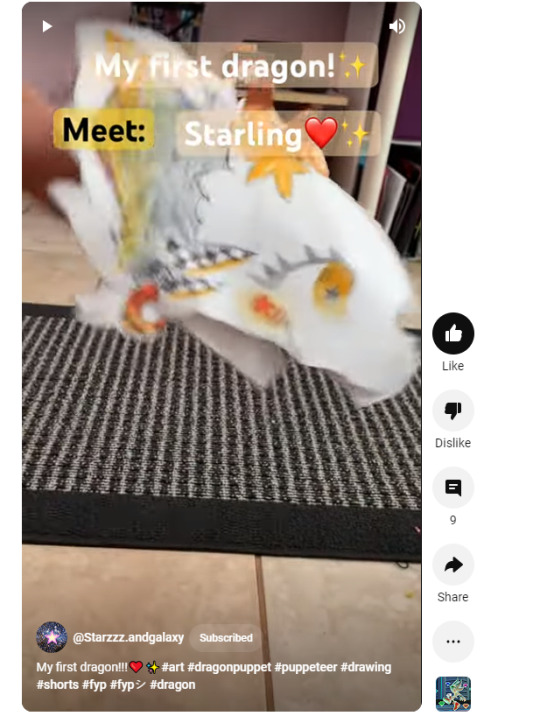
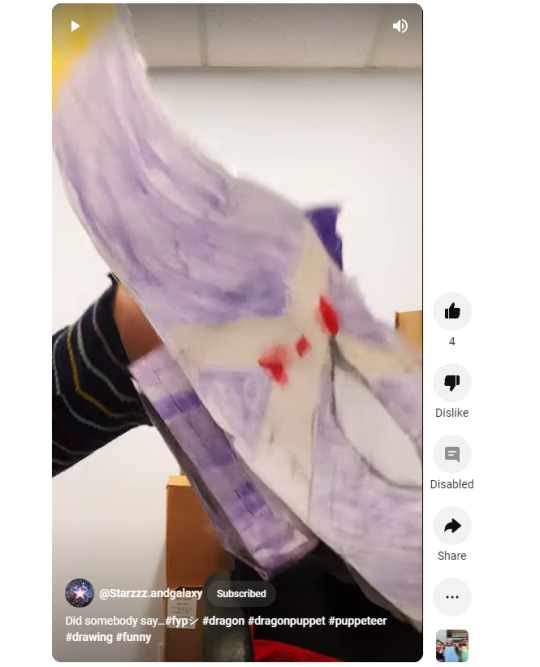
(the first image is her first dragon, second is her most recent i think) I don't get how these things are "paper furries", but I do know THEY ARE SICK AS FUCK. I got to see one in person and they're very cool, all with different stories! I honestly wanna ask for one but right now, I'm gonna stick with watching them.
Channel link can be found here:
(this section was finished on january first of 2024, so at the point of this being posted she wont be over here, but i had her here so yeah :D i love my cousin)
--------------------------------------------------------------------------------------------------------
Second channel:

Heartzzz.❤️ is my niece, and she does similar content, but still does good content! A couple of videos of Starz and Heartz are them promoting each other, so yeah. While she is on vacation and can't be here to give her reasons to subscribe to you, I certainly can!
Memes
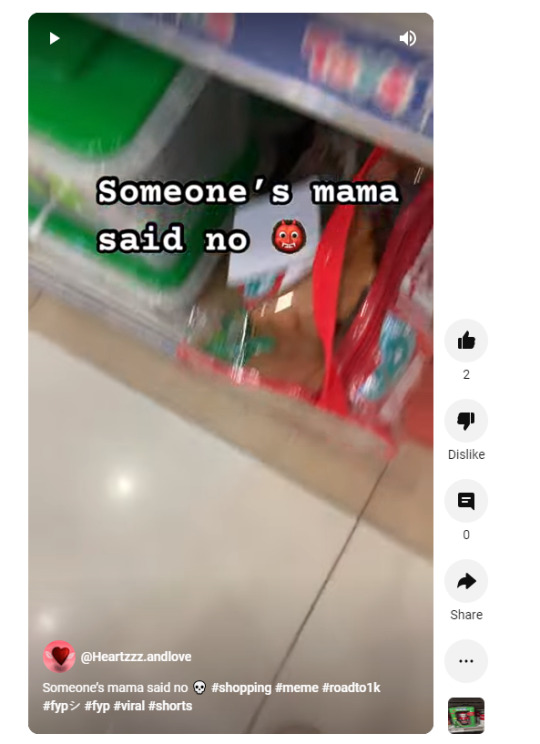
One thing I forgot to mention my cousin doing (well, actually my cousin's section is just kinda old because it's from when she last came over, but she's back to help me again, yay!) is making memes like this. Sometimes they do involve a paper dragon, but I think they're pretty funny and/or relatable (also dragons very cool)!
2. Edits (and Undertale related things)
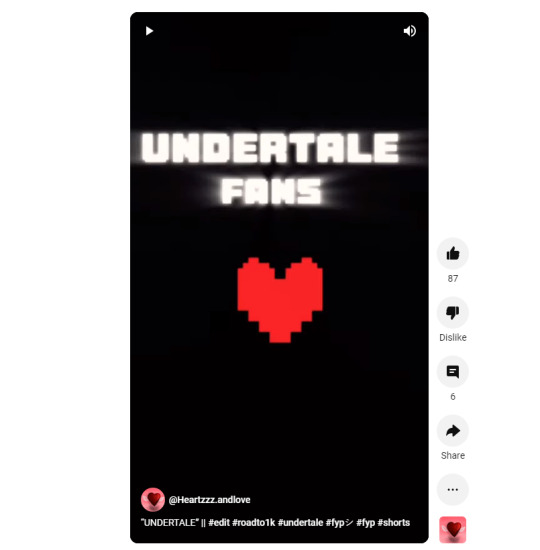
I'm putting these 2 in the same category just because of the example image above. While my cousin has recently started doing edits, Heartz is the only 1 of the 2 to make anything Undertale related. While the Undertale stuff comes once every blue moon it seems, that doesn't make it any less enjoyable.
I actually found in her description a run down on what she does post, so here:

Link to her channel can be found right here:
(okay ik this section was really short, again, she posts similar things to my cousin, and i didnt wanna repeat, so yeah, if you want more reason, here's what the cousin herself says: "[Heartz] is really nice, she's a good artist, and she's creative"; time i finished this section was 1/15/2024 lol)
--------------------------------------------------------------------------------------------------------
third channel:

Boli and gang (or as their original user is + the profile picture says, Boli the bear) is the channel belonging to 2 kids I babysit! They're pretty new to making content, but they have a promising start already! Currently, their content consists of...
Animations
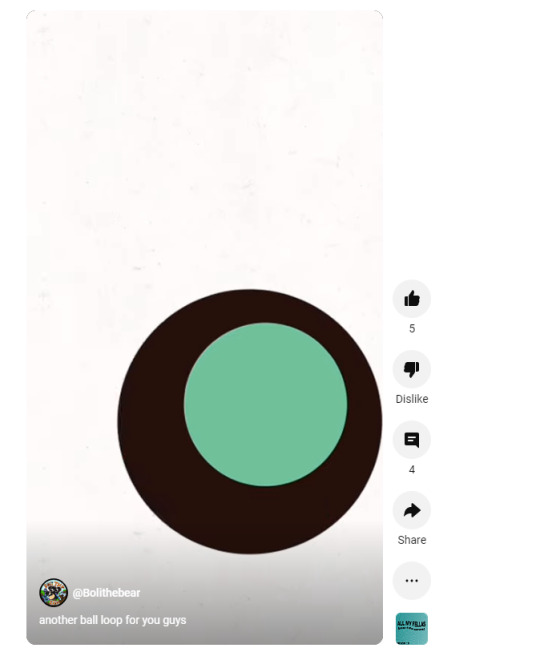
One of them has really been getting into animation, posting things like ball loops and such on their account. They're very interesting to watch personally!
2. Cool places
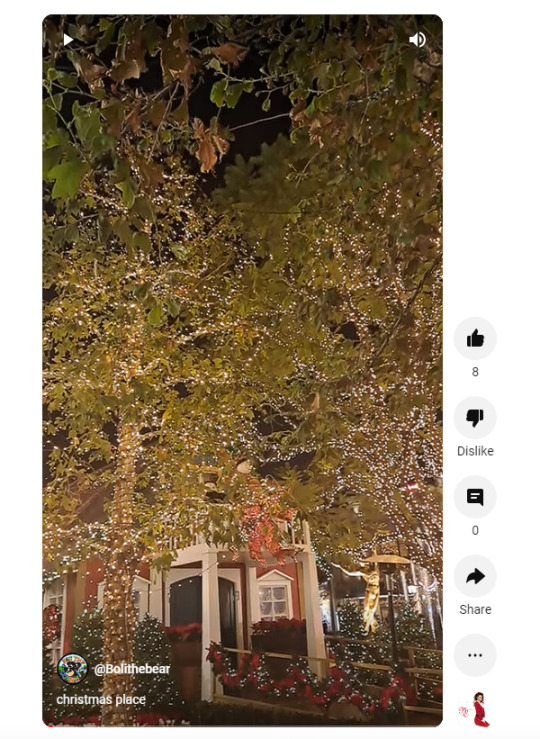
I'm not sure if this is going to be a common theme, but there is around 3-4 videos of places like this one. I have to admit, this has to be the prettiest of them all.
3. Art (+FNAF/Five Nights at Freddy's Content)

This is another one grouped together, but because this is the first drawing related one I've seen. They're very big FNAF fans, of course leading to things like this. Is it the best? No, but they tried very hard of course, and maybe you could leave some tips for them to improve with!
(they also post memes and funny videos, but I'd rather not do repetition; FINISHED THIS ALSO ON THE 15TH LETS GOOOOOOO)
Link to their channel can be found here:
Oh, one final reason, their profile picture is super cool! Can you guess who made it? This actually provides me with the perfect transition into...
--------------------------------------------------------------------------------------------------------
fourth/final channel:

ITS ME!!! FINALLY I CAN STOP DOING PROPER ASS TYPING
yeah, i have a youtube now, and there's like nothing on it minus a couple videos. all of them are made back in like 2021-2022? cant really remember, but i posted them for younger me's sake. i have like a couple more to get through, but afterwards im probs gonna do a bigger variety of content! art videos, jrwi edits, animations, rambles, essays, you name it! (might even stream again on twitch if that seems what the people like lol)
you may want actual reasons to subscribe, but i currently dont have any. i can only make promises of better future content, but right now i can admit theyre shit. i dont post often, its only oc related rn, all very vague, nothing that interests most people on my blog (cause i know a lot of you are here for jrwi content, huh?). this channel, the choice to subscribe is fully up to you, im not gonna sell myself to it, im simply just saying its real.
Link to the channel is found here:
if you at all took the time to read through my part, i appreciate it, but please do actually check out the other 3. after all, you can always find me here, but you cant find the others anywhere else!
(FINISHED THE REST OF THE POST ON 1/15/24 LETS GOOOOOOOOO)
#chilling in solar lights#cheri's art findings#not my usual content#silli promo#dragon puppet#animator#support the artist#digital art#digital artist#digital artwork#digital drawing#puppeteer#just like a cool rock#idk how to tag this#just go check them out please#epic artist#silly billy goose#this will be spam reblogged someday soon#and that will be in this week#be ready guys lol#seperators may look weird#ignore it please
151 notes
·
View notes
Text
notes on ada or ardor, from the "summer of ardor 2013" reading group
This post contains my notes on the novel Ada or Ardor: A Family Chronicle by Vladimir Nabokov, which I wrote in 2013 in connection with a small reading group for the book that I hosted for a few of my friends.
I've posted these notes online before, in several places. However, I recently discovered that all of its incarnations had disappeared, lost in the devouring maw of Web 2.0 you-are-the-product enshittification. (It was originally posted through "Facebook Notes," a feature that doesn't exist anymore; I also put it up as a series of "Goodreads Stories," a feature that also doesn't exist anymore.)
So, I'm putting them up again here, on tumblr.
I'm not under any illusions that tumblr will be around forever, and eventually I expect this copy to go the way of the others. Maybe when it does, I'll finally do the right thing and put it up on my (currently unused) personal website. But pasting it into the tumblr box is slightly easier, so here we are.
Looking back over these notes, I feel quite proud of them. I think I was underselling them in the original intro to the Goodreads edition, which (for the record) said the following:
These notes are certain [sic] inferior in comprehensiveness and erudition to, say, Brian Boyd's notes on Ada Online, or the Kyoto Reading Circle notes. In place of those qualities they mostly substitute bad jokes and webcomic references. The reasons you might, however, want to read this notes in addition to the existing sources are as follows: 1) Unlike everyone else, I try to avoid spoilers 2) I'm just a regular guy writing notes for his friends to read, which may be a good thing if you're an ordinary reader who doesn't want their face blasted off by endless scholarly discussions of minutiae
In fact, I actually went much further into "scholarly discussions of minutiae" than this would seem to suggest – with extensive citations of Boyd and others as needed – and I think I did a pretty good job of it, while not losing sight of bigger themes and stuff.
More generally, I feel like these notes really showcase my love and enthusiasm for the book.
----
The notes are divided into 11 sections, each of which covers a block of chapters we read in a particular week of the reading group. The goofy thematic titles for each of the weekly chapter blocks (e.g. "Oh, Inverted World" for the first one) are my inventions, part of my notes rather than the book itself.
I tried to avoid spoilers for later chapters when writing about earlier ones, though of course if you read the notes all the way through, you'll eventually get fully spoiled.
Except for one small added note (clearly signposted), these are given in their original 2013 form without any edits.
1. Oh, Inverted World (Part 1, Chapters 1-8)
GENERAL REMARKS (Chapters 1-8)
Let's review what we know so far. The story is apparently set on another planet (called "Demonia" or "Antiterra" -- I don't think these terms have come up yet, but I'm mentioning them for the sake of ease of reference). Its history and geography are quite similar to those of earth, although names are often different, and the dates of historical events can vary by up to 100 years. On Antiterra the northern reaches of North America have a mild, warm climate and, politically, form not an independent country (Canada) but a subsection of the U.S. called "Canady," which contains a "province" called "Estoty" which is inhabited largely by Russian-speakers in the west ("Russian Estoty") and Francophones in the east ("French Estoty"). What we call Russia on earth is called "Tartary" on Antiterra, and was settled by Tartars after the Russians were expelled to North America. (If you want some clarification on all of this, there is a very nerdy page about it called "The Geography of Antiterra" at http://www.dezimmer.net/ReAda/AntiterraGeography.htm .)
The mentally ill on Antiterra often have hallucinatory visions of our earth, which they call "Terra." This tendency began in a sort of fad in the Antiterran 1860s. A mysterious event called the "L disaster," which caused electricity to be banned, was responsible in some unspecified way for caused the Terra mania. At the time our protagonist, Van Veen, is writing, electricity has been made legal again, but in the story so far (covering the 1860s and 1880s) it is illegal and electrical devices have been replaced with hydrodynamic equivalents, such as the "dorophone" (hydrodynamic telephone). On the other hand, on the evidence of Ch. 6 at least, Antiterrans in 1884 (the date of Van and Ada's first meeting) have flying carpets and household robots. What little we see of conventional religion on Antiterra is peculiar: people say "thank Log" (short for "logos," maybe?) rather than "thank God," mention is made of "Faragod" ("the god of electricity"), and demons are seen as good rather than evil figures.
That's the setting; what about the story? The first three chapters are a convoluted and uninviting description of Van and Ada's ancestry, as well as (in Ch. 3) an account of the Terra mania and some of the differences between Antiterra and Terra. These three chapters make numerous but oblique references to the fact that Van and Ada, the two romantic leads, are not actually cousins -- as the family tree at the start of the book says -- but brother and sister: they are both actually the children of Demon and Marina, not of Demon and Aqua (Van's putative parents) and Dan and Marina (Ada's putative parents). After a description of Van's first amorous and sexual experiences in Ch. 4, we finally get some narrative traction in Ch. 5, where we start following 14-year-old Van in 1884 as he visits his relatives in Ardis Hall and meets his "cousin"/sister Ada -- who's a pedantic weirdo, but Van's, like, totally into it. That's pretty much it so far.
All of this is being described retrospectively, in the third person, by a very (implausibly?) old Van (he was born in 1870 and Ch. 4 says he "started to reconstruct his deepest past" in "the middle of the twentieth century"), with some notes in the margin by a similarly old Ada. The notes have been preserved in the text we're reading, which is curious in itself (an unedited, or partially edited, manuscript?).
One big question this book presents to the reader is whether Antiterra is real or whether it's something Van (who, in this latter conception, actually lives on our earth) has made up. When I first read the book, I thought "Antiterra is fake" was a plausible theory but by no means certain. Now, upon re-reading, it seems more and more obvious to me that Antiterra is just clearly fake -- the alternate Antiterran names are constantly shifting, for instance. So some of my notes below will talk about why I think Antiterra isn't real. (There is no critical consensus on this point, but that may just be because not enough people are paying attention.)
SOME RELEVANT TEXTS
As you probably know, Brian Boyd has been annotating Ada on his website. The annotations aren't done, and may never be -- he's up to Chapter 34 now, which is only a few chapters further than he'd gotten to when I first read the book two years ago. I will quote from these annotations often, but if you're worried about spoilers (for plot or for discoverable secrets) I don't recommend looking at them (although I used them heavily on my first read-through).
Boyd has also written a critical monograph called "Ada: The Place of Consciousness." I don't strongly recommend it, as it has the typical Boyd faults (justifies inherently implausible theories with over-complicated webs of evidence, expects first-time readers to have super-naive responses that no first-time readers actually have in practice, etc.) and in terms of the Boyd virtues (e.g. obsessive attention to detail) it has nothing to recommend it over the annotations. A better, and shorter, book is "Nabokov's Garden" by Bobbie Ann Mason (published -- really -- by Ardis Press in Ann Arbor), which gets closer to the heart of what Nabokov is doing than Boyd ever seems to.
There is also a set of annotations that Nabokov prepared himself to aid translators, called "Notes to Ada, by Vivian Darkbloom." Your copy may include them at the back. These are pretty sparse and pedestrian, but they are worth mentioning from time to time.
Ada makes a whole bunch of references to books and to visual art. According to Boyd and Mason, some of the more important textual reference points are:
Pushkin (Eugene Onegin) Tolstoy (Anna Karenina, War and Peace, Childhood/Boyhood/Youth) Chateaubriand (Atala/Rene)
Of these I have only read Anna Karenina.
NOTES
A note on pronunciation: "Ada," as Chapter 5 indicates, is pronounced "ahh-dahh," so that it sounds like "ardor" spoken in a non-rhotic accent. "Van" has the same type of "a" sound, since it is an abbreviation of "Ivan." "Veen" is, I think, pronounced like "vain," both for resonance with the word "vain" and because that's how it's pronounced in the Dutch surname "van Veen," which Van's name is supposed to remind us of. I've heard some people pronounce it like the first syllable of "Venus," though, and "Venus" is another intended resonance of the name.
" 'All happy families are more or less dissimilar; all unhappy ones are more or less alike,' says a great Russian writer in the beginning of a famous novel (Anna Arkadievitch Karenina, transfigured into English by R.G. Stonelower, Mount Tabor 3.05 Ltd., 1880)." (1) -- this inversion of the opening sentence of Anna Karenina (which Nabokov, incidentally, insisted should be called Anna Karenin in English) is many things. It's Nabokov making fun of bad translations. It is our narrator, Van Veen, declaring that his family, although sui generis (so to speak), is a happy one. It is an indication that we are entering a mirrored world in which some things may be different from what we're used to -- indeed, may take precisely the opposite form. It's an indication that this book will be (among other things) a parody of 19th century novels. Above all, it is a bizarre opening line that sets the tone for this bizarre book.
"Demon's twofold hobby was collecting old masters and young mistresses. He also liked middle-aged puns." (4) -- now that's my kind of 19th-century libertine! (Note, incidentally, that since Antiterra is also known as Demonia, Demon is effectively named after the earth [or the version of the earth he lives on], which is a good match for names like Marina and Aqua.)
" 'I deduce,' said the boy, 'three main facts . . . " (8) -- this first (textually, not chronologically) conversation between Van and Ada is wonderfully and implausibly dense. The upshot here is that the two have discovered the secret of Van's birth: Marina substituted her baby, whom Demon fathered, for Aqua's dead son, and the mentally impaired Aqua believed that the baby really was her child. This makes Van the son of Marina and Demon (rather than Aqua and Demon), and since the pair already knows that Ada's true father is Demon rather than Dan, this means they are both children of Marina and Demon -- full siblings. (This contradicts the family tree printed at the beginning, and -- despite numerous hints in the coming pages -- was actually missed by some early reviewers of the novel, who went through the whole thing believing that Van and Ada were cousins. Martin Amis, writing in 2009, thinks they are "half-siblings." My nerdrage knows no bounds.)
"by the sea, his dark-blue great-grandmother" (8) -- here's Boyd with the genealogy of this phrase: "Van says 'the sea, his dark-blue great-grandmother' in allusion to the opening chapter of another famous novel, Ulysses (pub. 1922), by James Joyce (1882-1941). In the opening chapter Buck Mulligan, looking seaward, and like Van and Ada also showing off in the first conversation in the novel, exclaims: 'Isn't the sea what Algy calls it: a grey sweet mother? The snotgreen sea. The scrotumtightening sea. Epi oinopa ponton' ([Harmondsworth: Penguin, 1986], 4; 1.77-78). 'Algy' here is Algernon Charles Swinburne (1837-1909): 'I will go back to the great sweet mother, / Mother and lover of men, the sea' ('The Triumph of Time,' pub. 1866, ll. 257-58). 'Epi oinopa ponton' means 'over the wine-dark sea,' a Homeric formula recurring throughout the Odyssey. Notice that Nabokov's 'dark-blue great-grandmother' wittily combines the 'grey' color term in Joyce's recycling of Swinburne's phrase and the 'great sweet mother' in Swinburne, with the 'great' again wittily given an improbable new value in 'great-grandmother.' "
Chapter 2 -- according to Boyd, the bad play Marina acts in here is a parody of bad translations/adaptations of Eugene Onegin. Unlike some of you, I haven't read Eugene Onegin, so the jokes are lost on me.
"the Baron, a physical wreck and a spiritual Samurai, had gone over to Japan forever" (14) -- for some reason I can't stop laughing over the weird, unexpected use of the word "Samurai" here. (It seems ripe for being turned into some sort of surrealist compliment/insult, e.g. "Rob, you are a physical wreck and a spiritual Samurai!")
"Van, I trust your taste and your talent but are we quite sure we should keep reverting so zestfully to that wicked world which after all may have existed only oneirologically, Van? marginal jotting in Ada's 1965 hand; crossed out lightly in her latest wavering one." (15) -- this is the first of what I think of as "moments of instability," moments when the book suggests that there is some crucial secret of its nature that we are not privy to. What is it that "may have existed only oneirologically"? Van and Ada's highly detailed ideas about what their parents' courtship was like? Antiterra as a whole? (If the latter, this would explain why Ada later crossed out the comment, since Chapter 3 makes it clear that Van is determined to stick with the Antiterra idea.) "Reverting" suggests regression (towards something worse, more immature) as well as turning something over (from the root "vert") as images are turned over by a mirror.
"The details of the L disaster (and I do not mean Elevated)" (17) -- strange that he would have to point the latter out in a world in which the L disaster is "well-known historically." "L" can stand for "electricity" (the L disaster has caused electricity to be banned) -- also "Ladore"? (Or Lenin. Or other, more spoilery options.)
"1869 (by no means a mirabilic year)" (19) -- Boyd's annotation for this reads as follows: "a pun on annus mirabilis (Latin, 'wonderful year,' applied especially to 1666, the year of London's Great Fire, in John Dryden's 'Annus Mirabilis,' 1667); on aqua mirabilis, sometimes shortened simply to mirabilis, 'a distilled cordial made of spirits, sage, betony, balm and other aromatic ingredients' (W2), since Aqua is about to be introduced; and as Proffer suggests on Russian mir, 'peace,' and Latin bellum, 'war,' since 1869 was the year Tolstoy's War and Peace was completed." Now that's a pun!
"Marina, with perverse vainglory, used to affirm in bed that Demon's senses must have been influenced by a queer sort of 'incestuous' (whatever that term means) pleasure (in the sense of the French /plaisir/, which works up a lot of supplementary spinal vibrato), when he fondled, and savored, and delicately parted and defiled, in unmentionable but fascinating ways, flesh (/une chair/) that was both that of his wife and that of his mistress, the blended and brightened charms of twin peris, an Aquamarina both single and double, a mirage in an emirate, a geminate gem, an orgy of epithelial alliterations." (19) -- And that is a sentence!
"Demon Veen married Aqua Durmanov -- out of spite and pity, a not unusual blend." (19) -- Karkat would be proud!
"Abraham Milton" on p. 18 becomes "Milton Abraham" on p. 21. Curiouser and curiouser.
"this our sufficient world. . . . Sufficient for your purpose, Van, entendons-nous. (Note in the margin.)" (21) -- second moment of instability. What is Van's "purpose"? This one is easier to make sense of under an "Antiterra isn't real" theory, since in that case Antiterra is sufficient for Van's purposes (i.e. for the reasons that led him to invent it), but not, e.g., for the purposes of other people whose real actions might be misrepresented there. If Antiterra is real, then Ada is either reminding Van of the general fact that some people are less satisfied with the world than he is, or reminding him in particular of people who hope their souls will transmigrate to Terra after death.
With its mystical manias and its college students dropping out to join 'fashionable' social causes, the Antiterran 1860s seem to imitate the Terran 1960s, in which Nabokov was writing.
Strange to have "Anna Karenin, a novel" (25), with that helpful explanatory clause, when on the first page the same novel (with a less accurate name) was "famous." "Manipulate each other" sounds more sexual than what actually happens in A.K., fitting for Ada's combination of 19th century stylings and sexual frankness.
" ' . . . it would have been so much more plausible, esthetically, ecstatically, Estotially speaking -- if she were really my mother.' " (30) -- an enigmatic outburst. Boyd's annotation for "Estotially" says "given the incest laws in Estoty?"
"such details of his infancy as really mattered (for the special purpose the reconstruction pursued)" (31) -- third moment of instability. (What is this "special purpose"? Is is the same as "your purpose" on p. 21?)
"He knew she was nothing but a fubsy pig-pink whorelet and would elbow her face away when she attempted to kiss him after he had finished" (33) -- this will turn out to be pretty representative of how Van sees women.
Chapters 5 and 6 -- we are now past the abstruse genealogical/scene-setting chapters, and, suddenly and somewhat incongruously, we're dropped into a Wes Anderson movie or something. Everything is visually lush and sort of cutesy. Something like this tone will persist, with various interruptions, for quite a while, but don't be fooled into thinking this is all the book has to offer.
"Ardelia" (36) -- Van's misremembering of "Adelaida" (Ada).
"the tiny, tremulous poodlet" (37) -- I present this phrase without comment.
" 'I used to love history,' said Marina. 'I loved to identify myself with famous women. There's a ladybird on your plate, Van. Especially with famous beauties -- Lincoln's second wife or Queen Josephine.' " (38) -- that's Marina for you. Also we can now add "Lincoln" to the two variants of "Abraham Milton."
" . . . jikkers were banned by the airpatrol; but four years later Van who loved that sport bribed a local mechanic to clean the thing, reload its hawking-tubes, and generally bring it back into magic order . . . " (44) -- I'm 99% sure the jikkers with their "hawking-tubes" were the inspiration for the flying carpets called "Hawking mats" that appear in the Hyperion series by science fiction writer Dan Simmons, which I coincidentally happened to be reading concurrently with Ada in summer 2011. (Simmons is a Nabokov fan and uses the name "Ardis" in the series as well. Of course when he uses "Hawking" it's also a reference to Stephen Hawking.)
"Owing to a mixture of overlapping styles and tiles (not easily explainable in non-technical terms to non-roof-lovers)" (45) -- "non-roof-lovers" is certainly not a category that enters my mind very often.
"le Docteur Chronique, I mean Crolique" (49) -- [insert weed joke here]
"Les Amours du Docteur Mertvago" (53) -- Vivian Darkbloom explains: "play on 'Zhivago' ('zhiv' in Russian means alive and 'mertv' dead)."
"Did he like elms? Did he know Joyce’s poem about the two washerwomen? He did, indeed. Did he like it? He did." (54) -- Apparently Finnegans Wake existed in 1884 on Antiterra. Boyd says: "The famous lyrical prose passage involving two washerwomen by the Liffey, at the end of the 'Anna Livia Plurabelle' chapter (I.viii) of Finnegans Wake (1938) -- a passage Joyce recorded in his own voice -- includes the refrain 'Tell me,' which in its last transformation becomes 'Tell me, tell me, tell me elm! Night night! Telmetale of stem or stone.' (216.03-04). Though a great admirer of Ulysses, Nabokov thought Finnegans Wake 'a formless and dull mass of phony folklore, a cold pudding of a book, a persistent snore in the next room. . . . Finnegans Wake’s façade disguises a very conventional and drab tenement house, and only the infrequent snatches of heavenly intonations redeem it from utter insipidity.' (Strong Opinions 71)"
"The retractile head and diabolical anal appendages of the garish monster that produces the modest Puss Moth" (55) -- "Diabolical Anal Appendages" is a great band name.
"Les Malheurs de Swann" (55) -- Vivian Darkbloom: "cross between Les malheurs de Sophie by Mme de Ségur (née Countess Rostopchin) and Proust’s Un amour de Swann."
2. Youth in Revolt (Part 1, Chapters 9-16)
GENERAL REMARKS (Chs. 9-16)
So, starting around Ch. 10 or so, we find ourselves REALLY CLEARLY situated inside the mind of a teenage boy. Everything is openly sexualized, even the food ("enormous purple pink plums, one with a wet yellow burst-split" [62] -- eww). Nabokov usually isn't this overt about this kind of stuff (if he includes it at all), and it was pretty startling to me the first time I read this book.
Back then these chapters startled me in a number of ways, really -- most of them having to do with the way they realistically, perhaps too realistically, take us into the world of adolescents with all their horniness and haughtiness. Van and Ada, who were likable enough in the previous section, begin to grate in this one. Take, for instance, the way their sense of superiority to Mlle Larivière infects not only their own dialogue but also the narration:
". . . the story lacked 'realism' within its own terms . . . That was the fatal flaw in the Larivière pathos-piece, but at the time young Van and younger Ada could not quite grope for that point although they felt instinctively the falsity of the whole affair." (87)
If we take this as an editorial comment from Nabokov himself (rather than just from old Van), it seems pretty self-indulgent: he has created a character who is an incompetent writer, has attack her writing in the voices of his other characters, and now attacks her in the narration itself -- pointing out flaws that he created to begin with! What's even worse is how close Van, and especially Ada, are to Nabokov in various ways -- e.g. Ada's interest in botany and entomology and her distaste for bad translations -- which makes this close to self-congratulatory self-insert 19th-century-novel fanfiction.
Is this interpretation false? Well, I think so, but for reasons that only become clear later on. For the moment, I'll just say that if your reaction to these chapters is "get off my lawn, you damn kids," your reaction is valid, and probably what Nabokov intended. (I mean, not to say their romance doesn't have some appeal; of course it does.)
NOTES
"punctuating Ada’s discourse with little ejaculations" (62) -- see what I mean about sexualizing everything?
" 'It was sort of long, long. I mean (interrupting herself)… like a tentacle… no, let me see' " (62) -- I rest my case.
Chapter 12 is beautiful and odd in its own unique way.
"among the instruments in the horsecart" (72) -- "horsecart" is an anagram for "orchestra." Darkbloom: "horsecart: an old anagram. It leads here to a skit on Freudian dream charades ('symbols in an orchal orchestra')."
"Children of her type contrive the purest philosophies. Ada had worked out her own little system. Hardly a week had elapsed since Van’s arrival when he was found worthy of being initiated in her web of wisdom. An individual’s life consisted of certain classified things: 'real things' which were unfrequent and priceless, simply 'things' which formed the routine stuff of life; and 'ghost things,' also called 'fogs,' such as fever, toothache, dreadful disappointments, and death. Three or more things occurring at the same time formed a 'tower,' or, if they came in immediate succession, they made a 'bridge.' 'Real towers' and 'real bridges' were the joys of life, and when the towers came in a series, one experienced supreme rapture; it almost never happened, though. In some circumstances, in a certain light, a neutral 'thing' might look or even actually become 'real' or else, conversely, it might coagulate into a fetid 'fog.' When the joy and the joyless happened to be intermixed, simultaneously or along the ramp of duration, one was confronted with 'ruined towers' and 'broken bridges.' " (74) -- I like this passage, and this system. I've forgotten a lot of stuff from this book but this has always stuck in my mind.
"The wasp was investigating her plate. Its body was throbbing. 'We shall try to eat one later,' she observed . . . " (75) -- Ada, you are so WEIRD.
" . . . the child was permitted to wear her lolita . . . a rather long, but very airy and ample, black skirt" (77) -- how Japanese of her. Seriously, though, this is one of the many throwaway references to Lolita in Nabokov's later work, which have always gotten on my nerves for some reason. I guess it's poking fun at the public's perception of him as primarily "the guy who wrote Lolita," but it also seems like more fuel for that very perception? I dunno.
" . . . thus dubbed after the little Andalusian gipsy of that name in Osberg’s novel" (77) -- Osberg is an anagram of Borges, to whom Nabokov has often been compared.
"with red poppies or peonies, 'deficient in botanical reality,' as she grandly expressed it, not yet knowing that reality and natural science are synonymous in the terms of this, and only this, dream. (Nor did you, wise Van. Her note.)" (77) -- another moment of instability at which I can only smile and nod. No clue what this means.
"[thus in the MS. Ed.]" (79) -- so the manuscript has been edited, but in a hands-off way, preserving errors and marginal notes rather than removing them or smoothing them out.
"'But, my poor Mathilde, the necklace was false: it cost only five hundred francs!' " (83) -- this story is the Antiterran equivalent of Maupassant's La Parure (thanks, Boyd). I do wonder if there's any intended parallel here to Van being substituted for Aqua's child.
"Being unfamiliar with the itinerary of sun and shade in the clearing, he had left his bicycle to endure the blazing beams for at least three hours." (86) -- even the most trivial details in this book are just so entertainingly described.
Chapter 15 -- I really like the way this chapter seems to be a parody of "loss of innocence" scenes, complete with the heavy-handed Tree of Knowledge symbolism. Since it rings true that Van and Ada might retrospectively view their lives in parodic terms, the scene also works "normally," as characterization, even while it also works as a parody.
"to snatch, as they say, a first shy kiss" (95) -- the innuendo pile doesn't stop from getting taller, if you believe Boyd: "Pun. Cf. Boyd 1985/2001: 243: 'seems to allude to a stock expression -- but the actual idiom is "steal a kiss." Why then that "as they say" just after snatch? Because, of course, there is one colloquial use of "snatch" ': vulva." (On the other hand, I remember the phrase "snatch a kiss" appearing in the romance-novelly chapter of Ulysses, so unless that was the same joke, it may just be an antiquated idiom . . . )
"with only that stray ardilla daintily leavesdropping" (98) -- hard to read even a few words of this book without encountering some sort of mischief. "Ardilla" means squirrel in Spanish, FYI.
3. And I'll Bury My Soul in a Scrapbook (Part 1, Chapters 17-24)
GENERAL REMARKS (Chs. 17-24)
Van and Ada's romance begins in earnest with an appropriately pyrotechnic backdrop; DIY sex ed is facilitated by the vast Ardis library; poems are transmogrified and crossbred; Lucette gets in the way; the style is sometimes gorgeous and sometimes playful or jokey to the point of tedium. The attic scene at the end of Ch. 1 fits somewhere in here, chronologically speaking. Meanwhile, the density of references has gone up precipitously, so I've written a lot more notes, most of which are quoted or cribbed from Boyd. There is the feeling of a steady rise in difficulty after the easy early Ardis chapters, like a musical piece that slowly builds in complexity.
If you're up to date, can you leave a comment saying whether you like the book so far? Just curious. I know this book is polarizing, and I don't want to feel like I'm leading you down a very long blind alley.
NOTES
Compared the leering and arch chapters directly preceding it, Chapter 17 is rather lovely. The tone in much of Part 1 seems to waver between romantic and satiric, with one of the two dominating the other in each chapter (speaking roughly).
"Their lips were absurdly similar in style, tint and tissue. Van's upper one resembled in shape a long-winged sea bird coming directly at you, while the nether lip, fat and sullen, gave a touch of brutality to his usual expression. Nothing of that brutality existed in the case of Ada's lips, but the bow shape of the upper one and the largeness of the lower one with its disdainful prominence and opaque pink repeated Van's mouth in a feminine key." (102) -- just felt like noting this down because it's an example of this book's excellent descriptions of sensory detail. Note the motif of Van's "brutality" (Ada's reaction to Van's hand-walking performance in Ch. 13: "I felt there was something dreadful, brutal, dark, and, yes, dreadful, about the whole thing" [86]).
"Nose, cheek, chin -- all possessed such a softness of outline (associated retrospectively with keepsakes, and picture hats, and frightfully expensive little courtesans in Wicklow)" (103) -- unsubtle foreshadowing: apparently Van will be soliciting courtesans later on.
"pascaltrezza" (103) -- Darkbloom: "pascaltrezza: in this pun, which combines Pascal with scaltrezza (Ital., 'sharp wit') and treza (a Provençal word for 'tressed stalks'), the French 'pas' negates the 'pensant' of the ‘roseau’ in his famous phrase 'man is a thinking reed.' " Sick pun, bro!
"Remembrance, like Rembrandt, is dark but festive." (103) -- okay, I'm going to have to stop noting down every cool or cute line in this chapter or else I'll just be noting down the whole thing. Boyd quibbles: "Rembrandt . . . is generally much less festive than such compatriots and contemporaries as Franz Hals (c.1581-1665) and Jan Steen (1625/6-1679). Van may particularly have in mind the decidedly festive 'Self-portrait with Saskia' . . . "
"What (Ada asks) are eyes anyway? Two holes in the mask of life. What (she asks) would they mean to a creature from another corpuscle or milk bubble whose organ of sight was (say) an internal parasite resembling the written word 'deified'?" (104) -- my quote moratorium has lasted less than a page, it seems.
" . . . the most tragic and almost fatal point of my life . . . How I used to seek, with what tenacious anguish, traces and tokens of my unforgettable love in all the brothels of the world!" (104) -- this chapter seems intent on briefing us about the shape of the overall plot. Note that a moment ago we got a reminder that Lucette died young ("at eight, twelve, sixteen, twenty-five, finis" [104]), though technically that could be deduced from the family tree at the beginning.
" 'I am sentimental,' she said. 'I could dissect a koala but not its baby. I like the words damozel, eglantine, elegant. I love when you kiss my elongated white hand.' " (105) -- Boyd: "Damozel is an archaic variant of 'damsel,' revived by Sir Walter Scott and other romantics after him 'to express a more stately notion than is now conveyed by damsel' (OED). Eglantine, especially [sic? -Rob] the sweetbriar (Rosa eglantera). Edmund Spenser (c.1552-1599) in The Faerie Queene (1590-96) uses both words toward the end of Book III, Canto VI (The Garden of Adonis), 'eglantine' in stanza 44, 'damozel' in stanza 54."
"a cad" (105) -- presumably Demon.
"after Mlle Larivière had threatened to smear poor Ada's fingertips with French mustard and tie green, yellow, orange, red, pink riding hoods of wool around them" (106) -- Boyd cites Jay Alan Edelnant's Ph.D. thesis, which notes that "this sequence implies 'green thumb' and 'pinkie.' ".
"born between Paris and Tagne (as he'd better, said Ada, who liked crossing orchids)." (106) -- Boyd notes that "Tagne" is not a real place and "seems a back formation from 'montagne' in the poem (106.25), as if it were 'mon Tagne,' 'my Tagne.' " The poem that follows is a hybrid ("crossing orchids") between the most famous poems of Baudelaire and (the actual) Chateaubriand (the latter poem will show up again in Ch. 22, where V&A will play with various phrases of the form "mon [X]"). Darkbloom translates it as "my child, my sister, think of the thickness of the big oak at Tagne, think of the mountain, think of the tenderness -- "
"Lucette’s and Lucile’s" (106) -- "Lucille, incidentally, was the true name of Chateaubriand’s sister, with whom he was in love" (Vera Nabokov).
" . . . and briefly attaining a drugged beatitude into which, as into a vacuum, the ferocity of the itch would rush with renewed strength." (107) -- a good description of this familiar experience.
"Nowadays it seems to be getting extinct, what with the cooler climate" (108) -- apparently the Antiterran climate has been growing closer to the Terran one?
"Suddenly Van heard her lovely dark voice on the staircase saying in an upward direction, 'Je l’ai vu dans une des corbeilles de la bibliothèque' -- presumably in reference to some geranium or violet or slipper orchid." (125) -- Ada's utterance, "I saw it in one of the wastepaper-baskets of the library," is actually (presumably) a response to Blanche asking about the location of her slipper, which she lost at the start of Ch. 19 ("Yes, she rushed down the corridor and lost a miniver-trimmed slipper on the grand staircase." [114]).
"She wore -- though not in collusion with him" (126) -- Boyd's annotation reads: "Why might we have thought that Ada had donned her black shorts and white jersey in collusion with Van?" I dunno, man.
From Boyd's Forenote to Ch. 21: "The prohibition against knowing about sex matches the Edenic prohibition against tasting of the Tree of Knowledge, and the theme of Ardis as Garden of Eden somehow resounds even amid the hush of the library. Just as the solitary couple in the left panel of Bosch’s Garden of Delights gives way to the throngs of sensualists, fructivores and sexual acrobats in the triptych’s central panel, in an endless slow merry-go-round of desire, so Van and Ada returning now as lovers to the library sample sex as something endlessly repeated through time: in evolutionary terms, from Serromyia flies and the lowliest farm animals to geishas and Casanovas; in cultural terms, from Oriental erotica, Shastras and Nefzawis, to litterateurs and sexologists."
"May 1, 1884 . . . 14,841 items" (130) -- I quote Boyd's annotation here because it's the kind of hyper-minute and hyper-trivial analysis only Boyd, for better or for worse, can provide: "The echo of the date ('1, 1884') in the number of items in the library (which would have been even closer had Nabokov chosen April 1, 1884: 1-4-1884: why did he choose 'Mayday' rather than April Fool’s Day?; and see 133.01 and n.) and the palindromic quality of '14841' (which also happens to be the sum of the squares of 120 and 21, the latter the number of the chapter -- is this significant, in this self-referential section? -- and the former a near palindrome of it, with 'nothing' added -- was that intended?) reflect Nabokov’s abilities as mathematical prodigy in his infant years, and his preoccupation with pattern in both nature (butterfly wing-markings, for instance) and art (versification, for instance)."
"A bawdy critic in a collection of articles which she now could gleefully consult (Les muses s'amusent)" (133) -- Nabokov's invention, title means "The Muses Have Fun." (Boyd)
"Ivan Ivanov" (134) -- sounds like a reference to Van, but Boyd notes also: " 'Ivan Ivanovich Ivanov' is the archetypal Russian; see for instance Bernard Guilbert Guerney’s translation of Gogol’s Dead Souls (but not in Gogol himself), ch. 11: 'why, on several occasions caricatures had actually been put out depicting Ivan Ivanovich Ivanov talking with John Bull' (1942; New York: Holt, Rinehart and Winston, 1966, 252.)"
"Kapuskan patois" (136) -- Boyd: "Kapuskan patois: Which, judging by the sample, seems to consists of a mix of French, American and Spanish, the European languages (except for Portuguese) of Earth’s Americas. Kapuskasing is a town in northern Ontario (49.25N, 82.26W), in an area of Ontario where French and English are both widely spoken." As for the "Kapuskan" quote itself: "This comically transparent macaronic passage yields: 'The only sure method of deceiving nature is for a strong-guy to continue-continue-continue until the pleasure brims; and then, at the last moment, to switch to the other groove; but because an ardent or a heavy woman cannot turn over quick enough, the transition is helped by the position of torovago.' "
"Heinrich Müller" (136) -- Darkbloom: "author of Poxus, etc." Of course this is Henry Miller, author (on Terra many decades later) of Sexus, etc. (For a good time, check out Gore Vidal's review of Sexus.)
"My sister . . . " (138) -- for the song by Chateaubriand on which this is based (which was crossbred with Baudelaire back in Ch. 17), see here. (If you want to avoid a quotation from a later chapter of Ada, stop reading at the sentence beginning "The poem, with score and tune . . . ")
"Ma soeur, te souvient-il encore / Du château que baignait la Dore?" (138) -- straight from the Chateaubriand: "My sister, do you still remember / The castle bathed by the Dore?"
"Sestra moya, tï pomnish' goru / I dub vïsokiy, i Ladoru?" (138) -- Darkbloom's trans.: "my sister, do you remember the mountain, and the tall oak, and the Ladore?"
"Oh! qui me rendra mon Aline / Et le grand chêne et ma colline?" (138) -- Darkbloom's trans.: "oh who will give me back my Aline, and the big oak, and my hill?" Slight alteration of the final sestet of the Chateaubriand: "mountain" has been changed to "hill" and "Helene" has become "Aline," the name of Chateaubriand's elder brother's wife (significance?). Darkbloom on the original: "The final (fifth) sestet begins with 'Oh! qui me rendra mon Hélène, Et ma montagne et le grand chêne' -- one of the leitmotivs of the present novel."
"Oh! qui me rendra, mon Adèle / Et ma montagne et l'hirondelle?" (138) -- now the name is "Adele" (now the addressee rather than the object) and the "great oak" is the "swallow." Adele brings "Adelaida" (Ada's real name) to mind just as "Lucile" below does for Lucette/Lucinda.
"Oh! qui me rendra ma Lucile, / La Dore et l'hirondelle agile?" (139) -- now it's "the Dore" and "the agile swallow." Lucile is the real name of Chateaubriand's sister. "Agile swallow" comes from an utterance of Mlle Lariviere's ("And see that agile swallow!" [87]), as do some other bits here.
"Oh, who will render in our tongue" (139) -- pun on earlier "rendra" ("give back").
"say 'chort' (devil) . . . which he had never heard her do before" (139) -- Van's forgetting that he had her say "chort" on p. 96. Speaking of devils, note that "Ada" means "of hell" (i.e. it's the genitive of "hell") in Russian.
"To the average physiologist, the energy of those two youngsters might have seemed abnormal" (139) -- part of a motif about Van and Ada's exceptional nature; cf. the earlier mention of the "demon blood" (20) they inherited from their father (which brings us back, thematically, to hell).
"yclept" (141) -- "Meaning 'called,' 'named,' this word, elsewhere obsolete, survived as an allowable archaism in poetry." (Boyd)
" 'I kept for years -- it must be in my Ardis nursery -- the anthology you once gave me; and the little poem you wanted me to learn by heart is still word-perfect in a safe place of my jumbled mind, with the packers trampling on my things, and upsetting crates, and voices calling: time to go, time to go. Find it in Brown and praise me again for my eight-year-old intelligence as you and happy Ada did that distant day, that day somewhere tinkling on its shelf like an empty little bottle. . . . ' " (146) -- well, that's heartbreaking. Note that Van, typically (as we shall see), does not comment on the pathos of the situation.
"Here, said the guide . . . " (146): Nabokov wrote, in third person, to Bobbie Ann Mason: "The poem Peter and Margaret is of course Nabokov’s own composition. Not a single reader (as far as he knows) has understood that it is a stylized glimpse of a mysterious person visiting the place, open to tourists, where in legendary times ('legendary' in Antiterra terms) a certain Peter T. had his last interview with the Queen’s sister. Although he accuses the old guide of being a 'ghost,' it is he, in the reversal of time, who is a ghostly tourist, the ghost of Peter T. himself. It is a very beautiful little poem, it should send a tingle down the spine of the reader." For a full report on the reference here and the way this poem by the fictional "Robert Brown" emulates Tennyson and Browning, see here.
"But as Van casually directed the searchlight of backthought into that maze of the past where the mirror-lined narrow paths not only took different turns, but used different levels (as a mule-drawn cart passes under the arch of a viaduct along which a motor skims by), he found himself tackling, in still vague and idle fashion, the science that was to obsess his mature years -- problems of space and time, space versus time, time-twisted space, space as time, time as space -- and space breaking away from time, in the final tragic triumph of human cogitation: I am because I die" (153) -- death has poked its head into the frame a number of times in these chapters ("the most tragic and almost fatal point of my life" [104], "a fatidic shiver" [146], " their . . . in many ways fatal romance" [148]), and it does so again in this remarkable sentence. Et in Arcadia ego?
"just finished reading her new story" (154) -- this one is based on Maupassant's "La Petite Roque" (AKA "Little Louise Roque"). There's a summary here.
4. The Second Law of Thermodynamics (Part 1, Chapters 25-34)
GENERAL REMARKS (Chs. 25-34)
In which Van learns you can never really recapture your childhood.
The story now shifts into a new phase: where Van's preoccupying monomania used to be his attraction to Ada, it is now his jealousy of anyone who might, conceivably, have designs on her. There is a newly neurotic tone to many of these chapters, and Van's characteristic allusiveness starts to seem defensive rather than expressive or simply playful. Meanwhile, Lucette herself has become infatuated with Van. (What is it with this family?)
NOTES
"kitchen Kim with his camera" (156) -- pay close attention to Kim and his camera.
"Tel un lis sauvage confiant au désert" (157) -- "Thus a wild lily entrusting the wilderness" (Darkbloom). A quote from Les Trois Règnes de la Nature by Abbé Jacques Delille (in context: "Thus a wild lily / Entrusting to the wilderness the perfume it exhales, / Hides its virginal beauty from the indiscreet winds"). Delille seems to have been one of the many, many authors on Nabokov's shit list.
" . . . and this attire was hardly convenient for making klv zdB AoyvBno wkh gwzxm dqg kzwAAqvo a gwttp vq wjfhm Ada in a natural bower of aspens; xliC mujzikml, after which she said: . . ." (157) -- just when you thought this book couldn't get any weirder, it just starts throwing glitchy gibberish at you with no warning whatsoever. Of course, all is explained in the next chapter, but I really like the audacity of it. (The joke here is that if you actually decode the text, it's completely tame, at least on a surface level: "making his way through the brush and crossing a brook to reach Ada in a natural bower of aspens; they embraced.")
"the letter scene in Tschaikow’s opera Onegin and Olga" (158) -- Boyd: "Nabokov mocks here the inaccuracies of theatrical adaptations of literary texts, including the Chaikovsky adaptation of Pushkin’s Eugene Onegin (see 10.11-12.20 and nn. and 511.34: 'the preposterous libretto'). The letter scene, itself specifically parodied at 11.02-20 (and nn.), of course focuses on Tatiana as letter-writer. A version that had misconstrued Pushkin’s story enough to have her sister Olga share the title with Onegin might even omit Tatiana altogether. In Pt. 1 Ch. 2 the show in which Marina plays the letter-writing role seems to be called Eugene and Lara (13.22), which at least preserves as well as distorts some of Tatiana’s surname (Larina); but by now, the disintegration has become even more complete, as the other Larina girl takes over the title role."
"I don't know. I adore you. I shall never love anybody in my life as I adore you, never and nowhere, neither in eternity, nor in terrenity, neither in Ladore, nor on Terra, where they say our souls go." (158) -- "adore"/"Ladore" here resonates nicely with the unspoken (but, in this book, always present) "ardor."
"Stumbling on melons, fiercely beheading the tall arrogant fennels with his riding crop" (159) -- Darkbloom: "allusions to passages in Marvell’s 'Garden' and Rimbaud’s 'Mémoire.'" (From Marvell's Garden: "Stumbling on melons, as I pass, / Ensnared with flowers, I fall on grass.") [TV narrator voice] "Previously on Ada or Ardor": Rimbaud's poem was referenced a number of times in Van and Ada's esoteric lunch-table conversation in Ch. 10.
In Chapter 27 we begin to get a sense of Van's conventionally masculine double standard about infidelity.
"Villa Armina: Marina never realized it was an anagram of the sea, not of her." (163) -- Ouch!
"garbotosh" (165) -- reference to a famous poster for the film Anna Christie, which pictures Greta Garbo wearing a macintosh. As it happens, all of the physical characteristics listed later in this passage are consistent with the idea that Cordula is supposed to look like Garbo. Garbo was rumored to have had affairs with women. (She also -- perhaps relevantly? -- played the title character in the 1935 adaptation of Anna Karenina.)
"ambivert" (165) -- apparently this means "a type of person intermediate between the introvert and the extrovert," though of course it sounds as though it means "bisexual."
"by his amour-propre, not by their sale amour" (168) -- "amour-propre" can mean either "self-love" or "clean love"; the former appears to be the actual meaning here, but the latter allows the phrase to appear to contrast more directly with "sale amour" ("dirty love"). Darkbloom: "pun borrowed from Tolstoy's 'Resurrection.'"
"On the contrary: a private picture of their fondling each other kept pricking him with perverse gratification." (168) -- another "yep, Van sure is a teenage boy" moment. (It wasn't until I copied this quote down here that I noticed the retrospectively obvious innuendo in "pricking." Maybe it's best to assume that every word of this book is some sort of innuendo until proven otherwise . . . )
"Adula" (168) -- resonates of course with "adulation."
"the entire treatment of the Marcel and Albertine affair" (169) -- Van refers to the theory that the character Albertine in In Search of Lost Time is really a gender-swapped male, i.e., that her affair with Marcel is actually a veiled depiction of a male homosexual affair.
"(On fait son grand Joyce after doing one's petit Proust. In Ada's lovely hand.)" -- the previous sentence links up to Joyce's Ulysses in several difficult-to-catch ways, described by Boyd here. Note that Van's monologue about Proust was itself in the style of Proustian dialogue.
"He could solve an Euler-type problem" (171) -- an insignificant detail, but as a math guy I'm of course curious what exactly is meant by this phrase. There are many problems associated with Euler, who was one of the most prolific mathematicians ever. In the French translation of Ada this becomes "a problem in Euler integrals." Euler integrals are certain special mathematical functions, which doesn't nail down what the problems in question are, but gives us a general idea of what sort of knowledge is involved -- calculus, probably. (Van is 10!)
"I have often wondered why the Russian for it" (175) -- by "it" he means "cheating."
"Van worked under Tyomkin, at the Chose famous clinic, on an ambitious dissertation he never completed, 'Terra: Eremitic Reality or Collective Dream?' " (182) -- the nature of the Terra pathology, along with the nature of time and space, will be one of Van's major interests as an adult.
"a triumph, in a sense, over the ardis of time" (185) -- "ardis" means "point of an arrow" in Greek, so this is a modification of the conventional phrase "the arrow of time."
"Thus the rapture young Mascodagama derived from overcoming gravity was akin to that of artistic revelation in the sense utterly and naturally unknown to the innocents of critical appraisal, the social-scene commentators, the moralists, the idea-mongers and so forth." (185) -- yep, we're definitely reading a Nabokov book here.
"Van on the stage was performing organically what his figures of speech were to perform later in life -- acrobatic wonders that had never been expected from them and which frightened children." (185) -- this makes explicit what might already have been clear: the connection between Van's interest in card tricks, acrobatic feats, etc. and his penchant for playing tricks with words.
"and (I have a note here, for the ghost of a novel) 'the low cut of her black dress allowed the establishment of a sharp contrast between the familiar mat whiteness of her skin and the brutal black horsetail of her new hair-do.'" (188) -- a vertical A-B-A (or, equivalently, A-D-A) pattern. The novel in question here is presumably Ada itself, which apparently means that this bit is some earlier note or thought that has been incorporated into the text. Note that the dramatic arc of Ada follows something like an A-D-A pattern, and that the title itself contains more than one such pattern (the word "Ada" is one, and the fact that "Ada" sounds like "Ardor" makes the phrase "Ada or Ardor" another).
"'My teacher,' she said, 'at the Drama School thinks I'm better in farces than in tragedy. If they only knew!'" (191) -- a self-conscious nod to the tension between comedy and drama in this novel?
"her only true love, the head of the arrow" (192) -- another ardis.
"I'll have them reassembled in Ladore when I motor there one of these days." (193-4) -- and here's another attempt to triumph over the ardis of time, this one much closer to the sort of examples found in introductory physics textbooks. The collecting of the necklace pieces seems like a pretty transparent metaphor for the lovers' attempt in this scene to recapture what they had in 1884.
Note that Ada has become less interested in biology (nature) and more interested in acting (artifice). Bobbie Ann Mason sees this as an effect of the corrupting influence of her "unnatural" affair with Van.
"Her director, G.A. Vronsky" (197) -- Vronsky is Anna's lover in Anna Karenina. His name is combined here with "the 'common Russian-Jewish name' Gavronsky" (Boyd citing Alfred Appel). Cf. Marina's lover "Baron d’Onsky" (13).
"what begins with a 'de' and rhymes more or less with a Silesian river ant" (199) -- "Since the Oder is the main river of Silesia, a historical region of eastern Europe now mostly in Poland although with small portions in Germany and the Czech Republic, the riddle spells the hint: 'deodorant.'" (Boyd).
"She smelled of damp cotton, axillary tufts, and nenuphars, like mad Ophelia." (199) -- cool sentence. Nenuphars are water lilies.
"The indecent 'telegraph'" (201) -- the banning of electricity has had amusing consequences for Antiterran profanity.
"(reversing the action of Dr. Ero, pursued by the Invisible Albino in one of the greatest novels of English literature)" (203) -- Darkbloom: "thus the h-dropping policeman in Wells’s Invisible Man defined the latter’s treacherous friend." Could additionally be a reference to Ellison's Invisible Man. (In an interview, Nabokov discusses the notion of meeting literary figures in heaven: "It would be fun to hear Shakespeare roar with ribald laughter on being told what Freud (roasting in the other place) made of his plays. It would satisfy one's sense of justice to see H. G. Wells invited to more parties under the cypresses than slightly bogus Conrad.")
"the sunglasses of much-sung lasses" (203) -- that's a pretty good one.
"two black and one golden-red head" (204) -- a possible A-D-A, although it seems more likely that Van is in the middle (in which case it's an A-D-A by gender, I guess).
5. Father Lucifer (Part 1, Chapters 35-38)
GENERAL REMARKS (Chs. 35-38)
The Ardis of 1888 continues to be awkward. Scrabble is played. Demon stops by and wants to ask whether Van and Ada are involved, but never manages to.
To be honest, with the exception of the Scrabble scene, I'm not that fond of these chapters -- the plot has been lagging lately and the reader could be forgiven for wondering whether any of this is going anywhere or whether the rest of the book will be comprised of minor, unpleasant Veen family interactions described at great length. Mark my words, though: the next section (the rest of Part 1) is utter gold, and is what convinced me I loved the book the first time around.
And as always, no matter how slow the plot is, there's plenty of trivia to note! Speaking of which, Boyd's online notes end at Ch. 34, although note that there are some interesting notes (composed with Boyd's help) here that go up through Ch. 38. After this, we're flying blind.
NOTES
"the oars crippled by refraction" (217) -- nice metaphor.
"my acarpous destiny" (219) -- "acarpous" means "fruitless."
"A diligent student of case histories, Dr. Van Veen never quite managed to match ardent twelve-year-old Ada with a non-delinquent, non-nymphomaniac, mentally highly developed, spiritually happy and normal English child in his files, although many similar little girls had bloomed -- and run to seed -- in the old châteaux of France and Estotiland as portrayed in extravagant romances and senile memoirs." (219) -- a self-conscious nod to the implausibility of Ada the character. Minor evidence for theories of the "Van invented Ada" variety (of which I am fond).
"Captain Grant's Microgalaxies" (220) -- Darkbloom: "known on Terra as Les Enfants du Capitaine Grant, by Jules Verne."
"ailleurs" (220) -- "go away" (?), lit. "elsewhere."
The ending of Ch. 35 has been "scrawled on a separate writing-pad page" and is apparently by a very old Van, possibly on his last night before death. It is appropriately (?) strange. Mentions of the process of composition sometimes coincide with especially abstruse and odd passages (cf. the sections alternately written by Van and Ada in Ch. 12). Is this an indication that these were written last, by an older senile Van / Ada, who either wrote strangely because they were senile or simply died before having the chance to revise this material (or both)?
"and now a century later seems to be again in vogue, so I am told, under the name of 'Scrabble,' invented by some genius quite independently from its original form or forms." (222-3) -- cf. earlier " 'We [Van and Ada in 1884] played mostly Scrabble and Snap,' said Van." (163)
"Lucette would later recall how her sister's triumphs in doubling, tripling, and even nonupling (when passing through two red squares) the numerical value of words evolved monstrous forms in her delirium during a severe streptococcal ague in September, 1888, in California." (223) -- like the Noodle Incident, this is all the more hilarious for its lack of specificity. ("Evolved monstrous forms"?)
"Baron Klim Avidov" (223) -- anagram for "Vladimir Nabokov" (Kyoto Reading Circle notes).
"Avidov . . . at a particule" (223-4) -- "The gist of this short incident is that Avidov was accused by the Englishman Keyway of his pretentions to aristocratic lineage by using the French 'de' before his name (d’Avidov)." (Kyoto Reading Circle notes)
"By July the ten A's had dwindled to nine, and the four D's to three. The missing A eventually turned up under an Aproned Armchair, but the D was lost" (224) -- A-D-A reference, of course, and maybe another arrow of time / entropy thing? (The "A" of paradisiacal Ardis lost and then regained.)
"it was pitiful to see Lucette cling to her last five letters (with none left in the box) forming the beautiful ARDIS which her governess had told her meant 'the point of an arrow' -- but only in Greek, alas." (225) -- I'm sure you could do some "clinging to Ardis" / "arrow of time" thematic stuff with this. (I have kind of a one-track mind today, it seems.)
"the amusing VANIADA" (226) -- this coinage will turn up again.
"TORFYaNUYu" (227) -- there is a peat motif (yes, you heard me, a peat motif) in this book: "Veen" for instance means "peat bog" in Dutch. (Boyd has written an article called "Ada, the Bog and the Garden: or, Straw, Fluff, and Peat: Sources and Places in Ada.")
V&A's virtuosic triumphs over Lucette in Ch. 36 leave me wondering exactly what they feel they have to prove (numerous decades later!).
"some 'blue' (peat-bog) land" (236) -- peat again.
"his "prebrandial" brandy (an ancient quip)" (238) -- cf. "he liked . . . middle-aged puns" (4).
"You look quite satanically fit, Dad." (239) -- I wonder what exactly "satanically" means on Antiterra, where religion seems to have been tweaked somewhat, and demons are benign figures. (Note the reference to the Eden story later in this chapter, and the Eden reference that dominates Ch. 15.)
" 'You’ll live to reach Terra, and come back a wiser and merrier man' " (241) -- this may be fortune-teller frivolity, but it is interesting to wonder whether it has any deeper meaning in the context of the plot.
"the sweetest word in the language rhymes with 'billiard' " -- Kyoto Reading Circle: "The word is 'milliard,' thousand million, that is, billion."
"That’s very black of you" (241) -- Kyoto Reading Circle: "Converted 'white of you,' a Southern racist compliment which means 'good of you.' "
"Filius aquae" (243) -- Darkbloom: " 'son of water,' bad pun on filum aquae, the middle way, 'the thread of the stream'." But, as the Kyoto Reading Circle observes, this is also a reference to Van's parentage (he is not "filius aquae," "son of Aqua"). This chapter is packed with hints about Van and Ada's parentage, particularly to the fact that Ada is Demon's daughter.
"Tell him I’m the youngest Venutian? Does he belong, too? Show the sign? Better not. Invent." (244) -- in Ch. 28, Dick offered Van a membership to the "Villa Venus Club." Apparently Van is now a member.
"Old Demon, iridescent wings humped" (245) -- one of several references so far to Demon's "wings." Presumably a flight of fancy rather than a literal description, but then so much of Van's tale is difficult to believe that a literally winged father might not be so out of place. (But if the wings really existed we might expect some remark about how he had been named for them, when in fact we just hear that Demon is "a form of Demian or Dementius" [4].)
"which Ada de Grandfief here has twisted into English" (246) -- yet another colorful version of "translate."
" 'Which is amply sufficient," said Demon, "for my little needs, and those of my little friends.' " (247) -- cf. "Sufficient for your purpose, Van" (21).
"the unfortunate plant used to be considered by the ancient inhabitants of the Ladore region not so much as a remedy for the bite of a reptile, as the token of a very young woman’s easy delivery" (247) -- the reference to the pains of childbirth here continues the Adam and Eve reference begun in Ada's preceding line, in which she links snakes and "corruption."
" 'I'm Fanny Price, actually' . . . 'In the staircase scene' " (249) -- not having read Mansfield Park, I can't divine the significance of either of these statements. Google leads me to this: "The stairs leading to the attic also have significance in the novel. A week after Fanny’s arrival at Mansfield Park, Edmund finds his cousin sitting on the stairs that lead to the attic. Her placement on the stairs reinforces the view of Fanny as a person between two worlds. She can no longer live with her family in Portsmouth and does not feel that the Bertram house is her home either. She is never completely part of the Bertram family until later in the novel; and in her first years with the family, Fanny does not feel fully accepted as a member of the household."
"this gemel planet" (256) -- "gemel" is a heraldic term meaning "coupled" or "paired."
"the young hospital nurse Dan had been monkeying with ever since his last illness (it was, by the way, she, busybody Bess, whom Dan had asked on a memorable occasion to help him get 'something nice for a half-Russian child interested in biology')" (256) -- the 12th birthday gift Ada received and hated back in Ch. 13 ("a huge beautiful doll -- unfortunately, and strangely, more or less naked; still more strangely, with a braced right leg and a bandaged left arm, and a boxful of plaster jackets and rubber accessories, instead of the usual frocks and frills" [84]).
"certicle storms" (258) -- Darkbloom: "certicle: anagram of 'electric.' " Electricity may be taboo, but Antiterrans still need a way to refer to natural electrical phenomena. (Also brings "cervical" to mind?)
"Antiamberians" (258) -- apparently some sort of anti-electricity group. The word "electricity" itself comes from the Greek word for "amber." Philip Pullman, thinking along the same lines, had his otherworldly characters in the His Dark Materials trilogy use "anbaric" (from the Arabic for "amber") energy.
"young Bout hurried in dragging the long green cord (visibly palpitating in a series of swells and contractions rather like a serpent ingesting a field mouse) of the ornate, brass-and-nacre receiver" (260) -- a hydrodynamic telephone sure is a funny image.
"his key: 221" (262) -- Demon is linked a number of times in this Chapter to Sherlock Holmes, who lived on 221 Baker Street (Kyoto Reading Circle).
"till dee do us part" (263) -- "dee" is the first letter in Demon's name: when Demon finally discovers their affair, Ada expects him to order them to stop. Also, possibly, a reference to the negative associations of the "D" segment of the A-D-A sequence (if this book is about paradises lost and then regained, "A" is the paradise while "D" is its absence).
6. Van/Ada, Blanche/Van, Rack/Ada, Percy/Ada, Van/Cordula, Hurt/Comfort, Mpreg (Part 1, Chapters 39-43)
GENERAL REMARKS (Chs. 39-43)
Shit just got real.
NOTES
"Speaking as a character in an old novel" (266) -- this "old novel" motif is starting to get a bit worn out.
"One of your aunt's servants is the sister of one of our servants and two pretty gossips form a dangerous team" (271) -- the former servant is Blanche. (Cf. "better than waste them on her, let him give them, she said, to Blanche's lovely sister" [277].)
"Percy, you were to die very soon -- and not from that pellet in your fat leg, on the turf of a Crimean ravine, but a couple of minutes later when you opened your eyes and felt relieved and secure in the shelter of the macchie; you were to die very soon, Percy; but that July day in Ladore County, lolling under the pines, royally drunk after some earlier festivity, with lust in your heart and a sticky glass in your strong blond-haired hand, listening to a literary bore, chatting with an aging actress and ogling her sullen daughter, you reveled in the spicy situation, old sport, chin-chin, and no wonder. Burly, handsome, indolent and ferocious, a crack Rugger player, a cracker of country girls, you combined the charm of the off-duty athlete with the engaging drawl of a fashionable ass. I think what I hated most about your handsome moon face was that baby complexion, the smooth-skinned jaws of the easy shaver. I had begun to bleed every time, and was going to do so for seven decades." (273) -- enjoyably spiteful paragraph. Strange to think of Van, over ninety, having lived with Ada for decades, writing this as though still angry at Percy. (I always tend to assume that Van's uses of the first person indicate heights of emotional intensity or involvement, though that may be too simple.)
"It was, he understood, a collation of shepherds." (274) -- no idea what to make of the shepherds. Suggestions welcome.
"Ada strolled up. 'My hero,' she said, hardly looking at him, with that inscrutable air she had that let one guess whether she expressed sarcasm or ecstasy, or a parody of one or the other." (278) -- doubles, of course, as a description of Ada the book.
"We do not care to follow the thoughts troubling Ada, whose attention to her book was far shallower than might seem; we will not, nay, cannot follow them with any success, for thoughts are much more faintly remembered than shadows or colors, or the throbs of young lust, or a green snake in a dark paradise." (280-1) -- strange to point this out when the book almost never follows Ada's thoughts, and the excuse rings hollow since Van's thoughts are, by contrast, followed relentlessly. I wonder what that "green snake in a dark paradise" means. There have been various Eden references (Shattal tree, dinner party), but none that seem to match up satisfactorily with that phrase.
"Therefore we find ourselves more comfortably sitting within Van while his Ada sits within Lucette, and both sit within Van (and all three in me, adds Ada)." (281) -- all three are in Ada the book, of course . . . "and all three in me" also makes me think of the Trinity. (If older Ada is incarnating in younger Lucette, then Ada is the Father and Lucette is the Son, which would make Van the Holy Spirit, which is funny since the Holy Spirit, unlike the other two, is believed by some to be female. [Is this my silliest line of speculation yet?])
"Van was lying in his netted nest under the liriodendrons, reading Antiterrenus on Rattner." (283) -- cf. p. 230: "Van lay reading Rattner on Terra, a difficult and depressing work." Mirror-reflection motif, of course.
"I've seen him in Sexico" (286) -- now that is a good bad movie title.
"It was not the sly demon smile of remembered or promised ardor, but the exquisite human glow of happiness and helplessness. . . . They stood brow to brow, brown to white, black to black, he supporting her elbows, she playing her limp light fingers over his collarbone, and how he 'ladored,' he said, the dark aroma of her hair blending with crushed lily stalks, Turkish cigarettes and the lassitude that comes from 'lass.' " (286-7) -- the writing has returned to romantic gorgeousness; it's been a long time since we've been here. Note that the style of this passage, and the use of the adore/Ladore pun, recalls the passage on p. 158-9 when Van and Ada part for the first time. Van seems to view his relationship with Ada in the most idealized terms at moments that directly precede their partings.
"That's a beautiful passage, Van. I shall cry all night (late interpolation)." (287) -- not sure what to make of this, but it seems significant.
"she was wearing his diamonds for the first time" (288) -- apparently Van did repair the diamond necklace after all?
I love Chapter 41. Nabokov is very good at rendering the moment when it all comes crashing down, and much of Ch. 41 is a wonderfully well-written, aching and hilarious depiction of what it feels like when your brain hits a fact it just can't deal with. In a lot of Nabokov's novels, though, this moment happens at the end, while here it's right in the middle: the demonic D of the A-D-A pattern ("till Dee do us part"). An A-D-A dramatic arc, if plotted with something like "happiness" on the vertical axis, would form a "V" shape (or, if mirror-inverted -- with both paradises exposed as false? -- an "A" shape).
"her quaint English, elegiac and stilted, as spoken only in obsolete novels" (292) -- this has the form of a diss towards Blanche, but its impact is kind of distorted by the fact that all sorts of things in Ada, including Ardis Hall itself, are describes as reminiscent of "old novels." "Obsolete novels" is kind of a strange notion in the context of this book, which is itself written in an archaic mode.
" 'Van,' she said, 'I must tell you my dream before I forget. You and I were high up in the Alps . . . ' " (296) -- the coincidence of Van and Ada's dreams here recalls dream coincidences in Anna Karenina and Ulysses. (Nabokov, in this interview: "Activist, demonstration-struck students of the present decade would, I suppose, either drop my course after a couple of lectures or end by getting a fat F if they could not answer such exam questions as: Discuss the twinned-dream theme in the case of two teams of dreamers, Stephen D.-Bloom, and Vronski-Anna.")
"Aqua used to say that only a very cruel or very stupid person, or innocent infants, could be happy on Demonia, our splendid planet. Van felt that for him to survive on this terrible Antiterra, in the multicolored and evil world into which he was born, he had to destroy, or at least to maim for life, two men." (301) -- unless I'm forgetting something, this is the first appearance of either of the names of Van's planet. Given that they will appear frequently from here on out, this seems statistically unlikely to be a coincidence. It's as if Van has invented these nasty-sounding terms to express his despair at this particular moment, and only later retconned them in as "official" names for his (fantasy) planet.
I remember reading somewhere that the duel in Ch. 42 is heavily derivative of Eugene Onegin. The author I was reading claimed this as reason to doubt the duel ever actually happened. (Which makes sense if, and only if, you're working in a general framework that says Van has access to something like western literature as it exists on earth.)
"In 1884, during my first summer at Ardis, I seduced your daughter" (309) -- clarifies that Ada is Demon's daughter, in case the reader still hasn't picked up on it.
"Van noticed a speckled movement on his right: two little spectators -- a fat girl and a boy in a sailorsuit, wearing glasses, with a basket of mushrooms between them. It was not the chocolate-muncher in Cordula's compartment, but a boy very much like him, and as this flashed through Van's mind he felt the jolt of the bullet ripping off, or so it felt, the entire left side of his torso" (310-11) -- I feel like this is significant (either Cordula and the boy or their doppelgängers appear as here like angels of [near-]death?), but I have no idea where to go with it.
Van's prepared monologue to Rack (314-15) is so weird I almost want to call it another "moment of instability." Death has been an important motif up until this point; now Van meditates, seemingly without prompting, on the afterlife. The futility of this magisterial proclamation (which Rack doesn't even appear to hear) is hilarious, but the passage is unnerving in a way that goes beyond that comedic function. There is a feeling that the book is going off the rails, that we and Van, not Rack, are in fact plummeting into "the panic and pain of infinite night" (315).
"kissing her rosy hot face and kneading her soft catlike body through her black silk dress" (318) -- to contrast with the swoonyspoony purple prose in the highest-pitch V&A encounters, Van's exciting moments with other women get assigned this down-to-earth porn-novel style. (I may be imagining this contrast -- I'll have to see whether it persists in the rest of the book.)
"But, of course, an invaluable detail in that strip of thought would have been -- perhaps, next to the pitcher peri -- a glint, a shadow, a stab of Ardis." (320) -- of course Van is trying to link the death of Percy -- far away, having nothing to do with him or Ada -- with his own desire to kill Percy and its motivation. Is that all that's going on here, though? Another odd, extended passage which, like the earlier monologue, serves to remind us that we're not in Kansas/Ardis anymore. (Incidentally, in this passage two open parentheses are closed with only one close parenthesis -- this is the case both in my edition and on Ada Online. Is this meant to be unsettling? Stop me before I read into trivial details again!)
"anxious to enjoy Cordula as soon as humanly and humanely possible" (320) -- nice turn of phrase.
"When in early September Van Veen left Manhattan for Lute, he was pregnant." (325) -- a funny piece of trivia: some early editions (including some of the copies at the NYU library) have "he was pregnant" idiotically "corrected" to "she was pregnant." Anyway, this parting shot for Part 1 is a anticlimactic parody of the climactic important of pregnancy in 19th-century fiction. (In the Darkbloom notes, VN says it's specifically a reference to Kitty Levin's pregnancy in Anna Karenina.) The genesis of a creative work is a poor substitute for a real pregnancy as a culmination to a story so concerned with sex and romance -- a fact only accentuated by the relatively minor status of the creative work in question (which we'll learn about in the next section).
7. L. Van Hubbard and the Modern Science of Mental Health (Part 2, Chapters 1-5)
GENERAL REMARKS (Part 2, Chs. 1-5)
This week's section is more varied than some. Van reads letters from Ada; writes a science fiction novel based on his patients' experiences; visits a chain of high-class brothels whose origins and peculiarities are described in more detail than we really need, thank you very much; riffs on dreams; and has an incredibly awkward reunion with Lucette.
NOTES
"I implore you for breath [sic! Ed.] of understanding" (332) -- there are several editor's notes in Ada's letters here (from the fictional, Nabokov-created editor). They call into question turns of phrase that seem like deliberate wordplay, which makes one wonder just who this editor is and whether their competence can be trusted. It also raises the question of why these particular instances of wordplay are being singled out in this wordplay-heavy book. Does the editor, for instance, have some grudge against Ada's (the character's) writing style?
"[Los Angeles, mid-September, 1888]" (332) -- Ada's "severe streptococcal ague," which made her delirious, occurred "in September, 1888, in California" (223). But if this has had any influence upon this letter, I can't discern it.
"He and I have gamed at Nevada, my rhyme-name town" (333) -- apparently either Vegas or Reno has been replaced with a city called "Nevada" on Antiterra. Similarly, the use of the word "Manhattan" in the book seems to indicate that instead of a New York City, Antiterra just has a city called Manhattan.
"Van, you are responsible (or Fate through you is responsible, ce qui revient au même) for having let loose something mad in me when we were only children" (334) -- the idea that Van has somehow corrupted Ada will recur.
"in early Thargelion, 1888" (335) -- Thargelion is . . . apparently the second month of spring in the Attic Greek calendar? Maybe Sam can explain this reference to me.
"as they were bound to be in the long ruin [sic! "run" in her blue stocking. Ed.]" (335) -- another problematic "sic." Also, I confess I don't know what the editor means by "in her blue stocking." Has Ada herself has made this correction in blue pen? [2024 edit: huh, apparently I didn't know the term "bluestocking" (meaning "feminist") back in 2013.]
"When Van retrieved in 1940 this thin batch of five letters, each in its VPL pink silk-paper case, from the safe in his Swiss bank where they had been preserved for exactly one half of a century, he was baffled by their small number. The expansion of the past, the luxuriant growth of memory had magnified that number to at least fifty." (336) -- this seems to call into question much of the book so far, since if Van can misremember a simple fact this severely, how the hell did he remember all of the little novelistic details he's included? Van does provide an excuse for this particular case a moment later, but this is a strong reminder that we aren't supposed to take Ada as a purely factual account.
"the impeccable paranymph" (337) -- a paranymph is an attendant in a ceremony, originally an attendant to the bridge and groom in an ancient Greek wedding.
I really like Chapter 2, mostly for the fact that it sheds light on Terra, one of this book's enduring mysteries.
"In his struggle to keep the writer of the letters from Terra strictly separate from the image of Ada, he gilt and carmined Theresa until she became a paragon of banality." (339-40) -- "carmined" here could indicate that Theresa is an analogue of Lucette, a redhead.
"his anagram-looking name, Sig Leymanksi, had been partly derived by Van from that of Aqua’s last doctor" (340) -- the doctor was "Sig Heiler" (28). Darkbloom on Sig Leymanksi: "anagram of the name of a waggish British novelist keenly interested in physics fiction." The novelist in question is Kingsley Amis.
"with Theresa swimming inside like a micromermaid" (340) -- Michael Maar in his book "Speak, Nabokov" links Lucette with the Little Mermaid of the classic fairy tale. I remember very little of his discussion, but I imagine this was part of the evidence. (The Little Mermaid of the Disney movie, which long postdates Ada, was a redhead, but I can't find any indication that this was a traditional feature.)
"a sumptuously fripped up, trite, tedious and obscure fable, with a few absolutely marvelous metaphors marring the otherwise total ineptitude of the tale." (344) -- anticipates, of course, one subset of the Terran reactions to Van's later work "Ada or Ardor: A Family Chronicle."
"Osberg (Spanish writer of pretentious fairy tales and mystico-allegoric anecdotes, highly esteemed by short-shift thesialists)" (344) -- remember that "Osberg" is an anagram of "Borges." Ouch!
"The Perfumed Garden" (344) -- this book, a "fifteenth-century Arabic sex manual and work of erotic literature" (Wikipedia), actually exists, and according to Bobbie Ann Mason is a significant source for Ada. I don't remember much about Mason's appendix on the subject, though.
Chapter 3 is something else, that's for sure. The best interpretation I can come up with is that it, or some subset of it, is an erotic dream of Van's that has been incorporated into the text. He is clearly half-asleep as he writes the end of Chapter 2. Van's sleepy state of mind may explain the sudden mentions of Eric van Veen and his dream in that section, which at that point have never been mentioned and are a mystery to the reader. If Van falls asleep with thoughts of Eric van Veen in his mind, it makes sense that he would dream of floramors. The narrative action in Ch. 3 (what little of it there is) has the sudden shifts and strangeness of dreams, and the exposition has the implausibility of the sort of "backstory" that dreams often present as given knowledge, as well as the extravagant elaborations often characteristic of sexual fantasies. Having awoken, Van recounts his dream (Ch. 3) and then, inspired, proceeds to riff on dreams in general, and erotic dreams in particular, in an imagined psychology lecture (Ch. 4).
There are problems with this. The most obvious is, of course, that if Van is doing this, why doesn't he tell us? It seems especially perverse to spend a brief paragraph on erotic dreams -- beginning with "Van's sexual dreams are embarrassing to describe" -- if in fact the previous chapter was an extended description of one. There's also the fact that the Venus club has been mentioned before, so we're clearly supposed to believe it exists, even if we don't believe every detail from Ch. 3. And although much of the design of the Villa Venus club resembles a sexual fantasy, there's actually a pre-existing justification for this in the idea that it was the sexual fantasy of a horny teenager, realized in reality after his death.
"David van Veen, a wealthy architect of Flemish extraction (in no way related to the Veens of our rambling romance)" (347) -- a reminder that "van Veen" is, in the real world, usually encountered as a Dutch surname. So if we want to play the plausibility game, it seems more likely that David and Eric van Veen were real names, and "Ivan Veen" a pseudonym inspired by them, than vice versa. (But since so many Nabokov characters have zany names, this is probably a pointless exercise, unless we want to call into doubt absolutely everything.)
"a chain of palatial brothels that his inheritance would allow him to establish all over 'both hemispheres of our callipygian globe' " (348) -- that's definitely the best use of the word "callipygian" I've ever seen. (Not that it has much competition.)
Note that, according to Nabokov in an interview, the image of Van holding a young prostitute in a ruined villa was the first seed of Ada the novel in his mind, and he was pleased with himself for managing to work it into the finished product.
"impeccable buttocks" (351) -- a funny phrase given the etymologically literal meaning of "impeccable": "unable to sin."
"a well-known oneirotic device" (354) -- a hint that this a dream.
"subsidunt montes et juga celsa ruunt" (355) -- "mountains subside and heights deteriorate."
"was not sure if her name was really Adora, as everybody maintained" (357) -- compare to earlier "Adula" (168), formed by merging the names of Ada and Cordula.
"but the soft little creature in Van's desperate grasp was Ada" (358) -- this could mean several things. Most conservatively, Van is trying to recapture Ardis by imagining that prostitutes like this one are Ada. But it is also possible that this is a literal description of a dream shift: a stranger in his dream has just turned into Ada. This seems especially plausible given the way the word "Ada" comes at the end of the sentence, forming the "punchline" of the sentence and perhaps of the whole chapter. This kind of ambiguity is characteristic of Van's style (remember Demon's "wings" -- and there will be more examples).
"Van Veen [as also, in his small way, the editor of Ada]" (365) -- the brackets seem to indicate that this comment is from the editor, but then the lack of an "Ed." seems to indicate otherwise. Maybe Van is imitating the editor.
"At sixteen she looked considerably more dissolute than her sister had seemed at that fatal age." (367) -- the use of the word "fatal" in this book is very odd (see e.g. Ada as "pale fatal sister" [307]). How is sixteen a "fatal" age? "Fatal" can mean something like "fateful" and I assume that's the primary meaning in most of these cases. That the word has another, more common meaning provides resonance with the death motif and a link between death and fate.
"Two ideas were locked up in a slow dance, a mechanical menuet, with bows and curtseys: one was "We-have-so-much-to say"; the other was 'We have absolutely nothing to say.' " (370) -- that's a good way of putting it.
"ejaculated Lucette" (370) -- the beginning (I think) of a series of silly sexual innuendoes in this scene, similar to those in the early Ardis sections. Intuitively enough, this tendency toward innuendo seems to be a hallmark of scenes in which Van is in the presence of an attractive woman and doesn't have a steady girlfriend.
"[thus in the MS. Ed.]" -- we saw this phrase once before, in Part 1 Ch. 13 (p. 79). There, too, Van wrote the start of a paragraph twice. I would conjecture that this mistake reflects the feverish anxiety that characterizes the present chapter -- which Van may be reliving as he writes -- except I don't think anything similar can be said of Ch. 13. (This could also be an indication that these chapters were written late, and thus revised relatively little before Van's death.)
"It certainly came from Lucette's sister. He knew that shade and that shape. "That shade of blue, that shape of you" (corny song on the Sonorola)." (372) -- indication that Ada writes in blue pen? (See earlier "blue stocking.")
"The mental in Van always rimmed the sensuous: unforgettable, roughish, villous, Villaviciosa velour." (373) -- sensuous words for a sensuous sensation. "Villous": "(of a structure, esp. the epithelium) Covered with villi." ("Villi": "small, finger-like projections that protrude from the epithelial lining of the intestinal wall.") "Villaviciosa" is the name of several places in Spain and the Philippines. "Velour": "A plush woven fabric resembling velvet, chiefly used for soft furnishings, clothing, and hats."
"[quite possibly, this is not remembered speech but an extract from her letter or letters. Ed.]" (374) -- this could probably be said about almost any of the speech in this book, couldn't it?
"We were Mongolian tumblers, monograms, anagrams, adalucindas." (375) -- cf. the description of Marina as experienced by Demon: "an Aquamarina both single and double, a mirage in an emirate, a geminate gem, an orgy of epithelial alliterations." (19)
"campophone" (376) -- could be from Latin "campus" (field) or the Greek root "kamp-" meaning "bend." The latter seems more likely, especially since "phone" is Greek and we've seen "dorophone" from Greek "hydro." It's unclear what a "campophone" is, and since it affects the radiators, it seems to be a type of dorophone.
"polliphone" (376) -- could be from Latin "pollex" (thumb) or Greek "polloi" (many, majority). (I don't actually know Greek so I could be screwing up these Greek roots.) Might also be a reference to Pollux, one of two famous twins? The phones are morphing, like Abraham Milton / Milton Abraham / Abraham Lincoln.
"Bergson is only for very young people or very unhappy people, such as this available rousse." (377) -- as I mentioned a while ago, Bergson seems to have been a source for Van's, and Nabokov's, views of time. (From this interview: "At a later period, in Western Europe, between the ages of 20 and 40, my favorites were Housman, Rupert Brooke, Norman Douglas, Bergson, Joyce, Proust, and Pushkin.")
"Vandemonian" (377) -- "a white inhabitant of Tasmania," according to Merriam-Webster.
"A ribald contemporary of Justinus, the Roman scholar." (384) -- at least on Terra, this is false, as Herodas and Justin were separated by several centuries. (That's one thing that's nice about the alternate world: it gives Van an alibi for each lapse in his erudition.)
"campophoned" (385) -- back to "campophone" from "polliphone."
" 'I also know,' said Lucette as if continuing their recent exchange, 'who he is.' She pointed to the inscription 'Voltemand Hall' on the brow of the building from which they now emerged. Van gave her a quick glance -- but she simply meant the courtier in Hamlet." (386) -- Voltemand was the pseudonym under which Letters From Terra was published, hence Van's misinterpretation.
8. Cameras and Obscurities (Part 2, Chapters 6-9)
GENERAL REMARKS (Part 2, Chs. 6-9)
Ardis regained? Peeping Kim. Two sisters and a brother. Three sisters.
NOTES
"He . . . had a structurally perfect stool (its cruciform symmetry reminding him of the morning before his duel)" (389) -- Van has aesthetic standards for everything, it seems. As it turns out, if we go back to Part 1 Ch. 42 -- the morning before Van's duel -- we find the very same phrase ("He shaved, disposed of two blood-stained safety blades by leaving them in a massive bronze ashtray, had a structurally perfect stool" [309-10]). I remember Boyd pointing this out in The Place of Consciousness. Apparently some reviewers complained about the repetition, but Boyd claims that they don't appreciate the "structural perfection" of the whole book, in which repetitions have some special role. (I don't remember this part of Boyd's argument very well -- it struck me as pretty silly and hence I have retained only this, its silliest detail.)
"libellula" (390) -- "a genus of dragonflies, commonly called Skimmers" (Wikipedia). Since Van "broke down on '…ulla,' " what he's actually said is "I saw you circling above me on libel," but I dunno if that has any significance.
"denunciation of demoniac life" (391) -- presumably "demoniac life" means "life on Demonia" (similar to e.g. "earthly existence"), but the associations of the word "demon" in this book are complex and I don't really know what to make of them. There's the planet Demonia (Antiterra), V&A's father Demon, incidental uses of words like "demoniac" and "satanic," and the fact that demons are good rather than evil figures in Antiterran religion. As Maar has noted, there's a longstanding association between demons/hell and pedophilia in Nabokov, perhaps indicating that N identifies pedophilia as some sort of ultimate or absolute evil -- e.g. Humbert Humbert says that the girls to whom he is attracted have a "not human, but nymphic (that is, demoniac)" nature, and in Nabokov's early poem "Lilith," the pedophilic narrator realizes in the last line that he is in hell.
"Veen and Dean" (393) -- this seems to encourage us to pronounce "Veen" to rhyme with "Dean," for symmetry -- but then see e.g. "Vain Van Veen" (299), which gives an identical push in the opposite direction.
"He was omniscient. Better say, omni-incest" (394) -- someone should write an article called "The Omni-Incest Narrator in Ada."
"mossio votre cossin" (396) -- "monsieur your cousin" (Darkbloom).
"Mademoiselle n'aurait jamais dû recevoir ce gredin" (397) -- "should have never received that scoundrel" (Darkbloom).
"Sumerechnikov! He took sumerographs of Uncle Vanya years ago." (399) -- Darkbloom: "His name comes from Russ. sumerki, twilight; see also p. 43." The Darkbloom annotation for p. 43 identifies sumerki as "dusk" rather than "twilight." On p. 43 itself, we find "The late Sumerechnikov, American precursor of the Lumière brothers, had taken Ada’s maternal uncle in profile with upcheeked violin, a doomed youth, after his farewell concert." The Lumiere brothers were real people, the inventors of the earliest motion-picture equipment in history. This all sheds some light on Van's quip "The Twilight before the Lumières" (399).
The density of unusual words ("leering caruncula in the unreticent reticulation" [401]), and of multilingual wordplay, has increased in this chapter, possibly to accompany Ada's return to the frame.
"it was Mr Ben Wright's last petard at Ardis" (401) -- Darkbloom: "Mr Ben Wright, a poet in his own right, is associated throughout with pets (farts)." Wright was "fired after letting winds go free while driving Marina and Mlle Larivière home" (140), and in 1888 he has been replaced as coachman by a guy named . . . Trofim Fartukov (actually from Russ. fartuk, apron). This also (see p. 418) appears to be the true origin of "pet" as V&A's pet name for Lucette. It is perhaps a sign of the basic goodness of our blessed Terra that no scholar, to my knowledge, has written at any length about the intricacies of farting in Ada.
"Bright derision can easily grade, through a cline of glee, into a look of rapture" (402) -- good sentence.
"this Love under the Lindens by one Eelmann transported into English by Thomas Gladstone" (403) -- Darkbloom: "O'Neil, Thomas Mann, and his translator tangle in this paragraph." We can add "transport" to the stack of derisive replacements for "translate."
"But, in the sudden storm, calculations went to the canicular devils." (403) -- cf. "l’ardeur de la canicule" and "the ardor of your little canicule" (95). "Canicule" refers to the "dog days" of summer ("the hot period between early July and early September").
"Art my foute. This is the hearse of ars, a toilet roll of the Carte du Tendre!" (406) -- Darkbloom explains all. "Foute: French swear word made to sound 'foot.' " "Ars: Lat., art." "Carte du Tendre: 'Map of Tender Love,' sentimental allegory of the seventeenth century." ( http://en.wikipedia.org/wiki/Map_of_Tendre )
"I will either horsewhip his eyes out or redeem our childhood by making a book of it: Ardis, a family chronicle." (406) -- trivia note: in Nabokov's last novel, Look At The Harlequins!, the protagonist, an alternate universe version of Nabokov, writes a body of work that strongly resembles Nabokov's own. His equivalent of Ada is titled "Ardis." (The actual book "was entitled at first Villa Venus, then The Veens, then Ardor, and finally Ada," according to this essay.)
"Knabenkräuter" (408) -- Darkbloom: "Germ., orchids (and testacles)."
"She married our Russian coachman . . . Oh she did? That's delicious. Madame Trofim Fartukov. I would never have thought it." (408) -- why doesn't Van remember this from Ada's letter? (" . . . as your sweet Cinderella de Torf (now Madame Trofim Fartukov) used to say . . . " [334].)
"She had never realized, she said again and again (as if intent to reclaim the past from the matter-of-fact triviality of the album), that their first summer in the orchards and orchidariums of Ardis had become a sacred secret and creed, throughout the countryside. Romantically inclined handmaids, whose reading consisted of Gwen de Vere and Klara Mertvago, adored Van, adored Ada, adored Ardis's ardors in arbors. Their swains, plucking ballads on their seven-stringed Russian lyres under the racemosa in bloom or in old rose gardens (while the windows went out one by one in the castle), added freshly composed lines -- naive, lackey-daisical, but heartfelt -- to cyclic folk songs. Eccentric police officers grew enamored with the glamour of incest. Gardeners paraphrased iridescent Persian poems about irrigation and the Four Arrows of Love. Nightwatchmen fought insomnia and the fire of the clap with the weapons of Vaniada's Adventures. Herdsmen, spared by thunderbolts on remote hill-sides, used their huge "moaning horns" as ear trumpets to catch the lilts of Ladore. Virgin chatelaines in marble-floored manors fondled their lone flames fanned by Van's romance. And another century would pass, and the painted word would be retouched by the still richer brush of time." (409) -- this delightful paragraph seems like a particularly overt and silly instance of the kind of tall-tale embellishment that we are supposed to imagine Van and Ada have applied to most parts of their story (to one extent or another).
Chapter 8 starts off with lots of long jeweled sentences, then descends into obscure weirdness after the Veens get drunk.
" 'Van, too, was upset,' replied Ada cryptically and grazed with freshly rouged lips tipsy Lucette's fanciest freckle." (413) -- notice how the sound echoes here (cr[yptically]/gr[azed]/fr[eshly]/fr[eckle], [graz]ed/[roug]ed, lips/tips[y], f[anciest]/f[reckle]) create the sensory impression of the words "grazing" one another.
"Nikak-s net" (415) -- Darkbloom: "Russ., certainly not."
"vorschmacks" (416) -- Darkbloom: "Germ., hors-d'oeuvres."
"in a nulliverse, in Rattner's 'menald world' where the only principle is random variation" (416) -- "menald": "speckled, variegated." Not sure what Lucette is getting at here.
"you cannot demand pudicity on the part of a delphinet!" (416) -- "delphinet" appears to be a Nabokovian coinage. It seems to be a diminutive of some "delph-" word . . . the flower genus "Delphinium"? The name "Delphine"? Suggestions welcome.
"the flat palpitating belly of a seasand nymph" (418) -- Lucette/mermaid connection.
"Thus seen from above" (418) -- the long, elaborate visual description here is the opposite of the quickly escalating action one might expect from an erotic scene like this. The joke is how far this passage is from ordinary sex writing; it's hard to imagine anyone getting turned on by it. (Which recalls the debate over whether Lolita was pornographic.)
". . . but I know somebody who is not simply a cat, but a polecat, and that's Cordula Tobacco alias Madame Perwitsky." (420) -- huh??? Google searching for "polecat slang" reveals only that in the South it means "skunk," and a "perwitsky" is apparently a "tiger weasel." No idea what she means here.
"After a while he adored [sic! Ed.] the pancakes" (420) -- OK, the editor has a point here. If this is wordplay on "ordered," it's pretty feeble. There may be an element of self-parody here -- after all this isn't too far from some of the more frivolous of Van's/Nabokov's clearly intentional jokes.
"Esmeralda and mermaid" (421) -- Lucette/mermaid.
"for the first time in my fire [thus in the manuscript, for 'life.' Ed.]" (421) -- similar to the case just mentioned. I wonder what we're meant to make of the varying frequency of editorial comments -- most chapters have none, but (e.g.) Chs. 1, 5, and 8 of Part 2 have several. Maybe this is an indication of compositional order.
"The whole matter secretly nauseated Van (so that, by contrast, her Natural History passion acquired a nostalgic splendor)." (425) -- there's a wry nod to the nature of adolescent love in the fact that Van, though obsessed with Ada, never actually shares her central passions. First he's bored with her interest in natural history, then he's so bored with her interest in acting that he looks back fondly on the natural history phase.
"I seem to have always felt, for example, that acting should be focused not on 'characters,' not on 'types' of something or other, not on the fokus-pokus of a social theme, but exclusively on the subjective and unique poetry of the author" (246) -- Reminder Number (n+1) That We Are Reading A Vladimir Nabokov Novel
"In 'real' life we are creatures of chance in an absolute void" (426) -- cf. Lucette's "in a nulliverse, in Rattner's 'menald world' where the only principle is random variation" (416). As before, I'm not sure what we are supposed to make of this idea. There's a recurring idea, I think, that Antiterra is variegated/motley/diverse, perhaps in a "random" way ("the multicolored and evil world into which he was born" [301]). Rattner's "menald world" is presumably Antiterra. Does Terra, by contrast, possess some sort of unity or harmony?
"so that the title of the play might have been The Three Sisters" -- this (technically just "Three Sisters") is in fact the title of the real play on Terra. Much of the rest of this chapter probably makes more sense if you've read the play . . .
"We all know those old wardrobes in old hotels in the Old World subalpine zone." (430) -- but of course!
"the rose sore of Eros alone" (431) -- oh my god, this is a double anagram and a really good phrase in its own right. Picture me as Sweet Bro stricken with awe.
9. The Many-Worlds Interpretation (Part 2, Chapter 10 to Part 3, Chapter 4)
GENERAL REMARKS (Part 2, Ch. 10 to Part 3, Ch. 4)
Where Part 1 ended with a parody climax, Part 2 ends with a real climax -- in fact two real climaxes, the latter of which is suddenly defused in one of this weird book's weirdest moments.
Then, after a lurching fast-forward through many Ada-less years, we get yet another cringe-inducing encounter with desperate Lucette in Part 3 Ch. 3. At this point, Van's refusal to indulge Lucette's desires is beginning to seem almost perverse; it's understandable that he doesn't want to lead her on when he doesn't love her, but that kind of consideration hasn't stopped him from becoming involved with other women. For much of the book Van has come off simply as an amoral aesthete, but as we near the end, he is -- between the blinding of Kim and his conduct with Lucette -- starting to seem like something much worse.
This raises a number of questions: how are we supposed to feel about the coming Van-Ada reunion (which we know is happening because of Ada's annotations to the manuscript) if Van is such a bastard? And why, when Van makes up numerous details (e.g. in the Ardis chapters) that he couldn't possibly have remembered, does he allow himself to come off so badly in the latter parts of the book? If he has no commitment to strict factual accuracy, why not just twist the facts to make himself look better in the Lucette scenes? It would be one thing if Van's guilt over his own mistakes were a major theme of his book (and it may in fact be, in some hidden sense), but Van is curiously silent on these issues, as though expecting the reader to take his bad behavior in stride. Issues like these make this book (to me) both fascinating and intensely creepy in a way that would not be possible if Van's flaws were dealt with more overtly.
NOTES
"He set off at once for Manhattan, eyes blazing, wings whistling." -- Demon's wings again.
"The only personage they had not reckoned with was the old scoundrel usually portrayed as a skeleton or an angel" (433) -- so Antiterrans depict Death roughly the same way Terrans do, despite the differences in religion.
"but [Dan's] death had shown an artistic streak because of its reflecting (as his cousin, not his doctor, instantly perceived) the man’s latterly conceived passion for the paintings, and faked paintings, associated with the name of Hieronymus Bosch." (433) -- Dan, like Aqua, has descended into madness before dying. There is a symmetry to this: each of V&A's parents has a sibling (of the same gender) who has died in this way, and madness is now attested to on both the Durmanov and Veen sides of the family. There is an antisymmetry in the content of the madness -- Aqua dies dreaming of heaven-like Terra, while Dan dies haunted by visions out of Bosch's depiction of hell. (According to Boyd the reference here is to Bosch's triptych The Last Judgment. Demon brings up "that other triptych," the Garden of Earthly Delights; Mason's book contains some discussion of The Garden of Earthly Delights as a broader influence upon Ada.) Have Van or Ada inherited the mental illness that plagued their aunt and uncle? (Who are their putative mother and putative father -- and what's the significant of that?) It's interesting that Nabokov encourages us to think about this possibility just before the bizarre ending of Part 3.
"might still be living with dull little Cordula de Prey . . . but Cordula was not dull and had not been present" (434) -- Van invents a thought process for Demon, then disputes it. The point of contention is odd, since Cordula has come off as pretty "dull" in all of Van's own accounts of her thus far.
"looking forward to another day of increasing happiness (with yet another uncomfortable little edge smoothed away, another raw kink in the past so refashioned as to fit into the new pattern of radiance)" (434) -- a nice statement of Van's broader MO.
"According to Bess (which is 'fiend' in Russian)" (435) -- actually, it means "demon" (e.g. Dostoyevsky's novel "Bésy," usually translated "Demons").
"how incestuously -- c’est le mot -- art and science meet in an insect, in a thrush, in a thistle of that ducal bosquet" (436) -- this remark of Demon's calls back to the peculiar phrase " 'incestuous' (whatever that term means) pleasure" (19) used to describe Demon's enjoyment of his mistress Marina's similarity to his wife Aqua.
"what we have to study [in Bosch], as I was telling your cousins, is the joy of the eye, the feel and taste of the woman-sized strawberry that you embrace with him, or the exquisite surprise of an unusual orifice" (437) -- hilarious.
"Jeroen Anthniszoon van Äken" (438) -- the real name of Hieronymus Bosch.
"hell curs, k chertyam sobach’im" (438) -- the Russian is "to hell's hounds" or "to the canine devils" (so roughly the equivalent of "hell curs"). "Canicule" may be relevant here (Ada/hell connection)? The Russian phrase appears two other times in Ada, translated differently each time: "hydrodynamic telephones and miserable gadgets that were to replace those that had gone k chertyam sobach'im (Russian 'to the devil')" (23), and "But, added Ada, just before being whisked away and deprived of her crayon (tossed out by Marina k chertyam sobach'im, to hell's hounds" (151).
"Norbert von Miller" (440) -- mentioned earlier by Marina on p. 261.
"Kim who would have bothered Ada again had he not been carried out of his cottage with one eye hanging on a red thread and the other drowned in its blood" (441) -- so Van did blind Kim after all. (That Van actively did this -- that Kim wasn't just a casualty of coincidence like Percy and Rack -- is confirmed at the end of the chapter.) Boyd, in The Place of Consciousness, makes much of the fact that this gruesome detail is mentioned almost in passing and could easily be overlooked in a book with so many lurid incidental details. To fully grasp the nastiness of Van's character, we must pay attention.
"his father had made himself up as Boris Godunov" (443) -- an play by Pushkin titled "Boris Godunov" was adapted by Mussorgsky into an opera, so this calls back to the bad Eugene Onegin adaptation Demon watches in Part 1 Ch. 2.
"My first is a vehicle that twists dead daisies around its spokes; my second is Oldmanhattan slang for 'money' " (444) -- a "van" is certainly a vehicle, though I can't find anything online about "veen" as slang for money.
"My second is also the meeting place of two steep slopes." (444) -- "ravine"?
"Right-hand lower drawer of my practically unused new desk -- which is quite as big as Dad’s, with Sig’s compliments." (444) -- this Freud joke is one of the several details in this passage that remind us of Aqua's suicide.
"Then, standing before a closet mirror, he put the automatic to his head, at the point of the pterion, and pressed the comfortably concaved trigger. Nothing happened -- or perhaps everything happened, and his destiny simply forked at that instant, as it probably does sometimes at night, especially in a strange bed, at stages of great happiness or great desolation, when we happen to die in our sleep, but continue our normal existence, with no perceptible break in the faked serialization, on the following, neatly prepared morning, with a spurious past discreetly but firmly attached behind. Anyway, what he held in his right hand was no longer a pistol but a pocket comb which he passed through his hair at the temples." (445) -- moment of instability! In the poem Pale Fire, the phrase "[And here time forked.]" appears shortly before Hazel Shade's suicide. In this passage the idea of forking time is used to illustrate a suicide attempt that Van doesn't go through with. But is that all? The idea of changing to a different time track, in which Van is holding a comb rather than a gun, could just be a colorful way of saying that Van putting down the gun. But given the resonances of madness that have build up in the course of this chapter -- and Van's enduring interest in the nature of time -- this could well be more literal than that. One interpretation is that the rest of the book from hereon out is fantasy, and the novel is an elaborate suicide note.
"There are other possible forkings and continuations that occur to the dream-mind, but these will do." (446) -- elaboration of the earlier moment of instability, and a return of the "dream" motif that taunts the reader throughout Ada. On one level, this could be a simple statement that Van is ready to end the chapter (and Part 2) rather than ramble about further in an effectively inexhaustible trove of relevant memories. If we want to adopt something like the "suicide note" theory, this is instead a statement that other alternative futures -- in which Van does not commit suicide -- can be imagined, but the one he has started to sketch here (in which he blinds Kim, is reunited with Ada, etc.) "will do" -- and indeed it forms the basis of the remainder of the novel.
Time has moved more quickly in each successive section of Ada. Part 1 covers four years and takes up half the book. Part 2 does five years in half that length. Now Part 3 Ch. 1 fast-forwards through seven years of Van's life in a few pages. As a reader, it's easy to forget just how much time is elapsing here, and it can be illuminating to remind oneself of it. For instance, the meeting with Greg and Cordula in Ch. 2 seems like a relatively minor scene, not too different from many of the earlier scenes involving secondary characters -- but it is only the second event (after Marina's death) in seven years that Van has deemed worthy of relating in any detail! The most obvious explanation for this is that Greg and Cordula are people he remembers from his Ardis days, and so they are important to him -- and to the central story of this book -- in a way that many of the events of this period were not. (Moreover, it is Greg who tells Van that Lucette is in town, and thus precipitates his much more significant meeting with her.) I also wonder, though, whether Van's feelings for Cordula aren't deeper than he has let on (which would explain that defensive [?] "Cordula was not dull" earlier).
"Three elements, fire, water, and air, destroyed, in that sequence, Marina, Lucette, and Demon. Terra waited." (450) -- another suggestion that Van and/or Ada are destined to end up on Terra ("You’ll live to reach Terra, and come back a wiser and merrier man" [241]).
"She rode it twice. Their brisk nub and its repetition lasted fifteen minutes in all, not five." (457) -- as before with Cordula, the language here is blunt and unromantic.
"Invitation to a Climax" (459) -- this parody of the title of another VN novel invites one to think about "beheading" as a metaphor for male orgasm.
"For a minute he stood behind her, sideways to remembrance and reader (as she, too, was in regard to us and the bar), the crook of his silk-swathed cane lifted in profile almost up to his mouth. . . . a natural masterpiece incomparably finer and younger than the portrait of the similarily [sic] postured lousy jade with her Parisian gueule de guenon on the vile poster painted by that wreck of an artist for Ovenman" (460-1) -- this description of Van standing behind Lucette is meant to remind us of a famous Toulouse-Lautrec poster.
" ' . . I’m like Dolores—when she says she’s "only a picture painted on air." ' 'Never could finish that novel -- much too pretentious.' " (464) -- a joke about Lolita, of course. The phrase "only a picture painted on air" doesn't get any Google hits that aren't related to Ada, incidentally.
"It’s safer and faster by plane" (465) -- as far as I can tell, this is the first mention of planes on Antiterra. (Flight of some sort has always been possible there, however, by means of the "jikkers.") Planes appeared earlier in Aqua's visions of Terra: "she saw giant flying sharks with lateral eyes taking barely one night to carry pilgrims through black ether across an entire continent from dark to shining sea" (21), so this is one indication that (because of the temporal discrepancy between the two worlds) Terran visions can actually foretell what will happen on Antiterra. Several details in this chapter and the next seem to indicate that electricity has recently been unbanned (another noted feature of Terra was that electricity was used freely).
"I have an important, important telephone call to make, but I don’t want you to listen" (466) -- "telephone," not "dorophone," since they're using electricity now.
" 'That’s rich,' said Lucette, 'you’ve gone far enough with me on several occasions, even when I was a kid; your refusing to go further is a mere quibble on your part; and besides, besides you’ve been unfaithful to her with a thousand girls, you dirty cheat!' " (467) -- this all seems pretty undeniable . . . indeed, as I said above, Van's refusal to become involved with Lucette has grown to seem almost perverse given the rest of his personality.
"What was he? Who was he? Why was he? He thought of his slackness, clumsiness, dereliction of spirit." (471) -- both the introspection and the self-criticism in this chapter are utterly atypical of Van, though it wasn't until I encountered them here that I realized just how absent they've been from the preceding 470 pages.
"In his sadder moments, as now, he attributed at least part of his 'success' to his rank, to his wealth, to the numerous donations, which (in a kind of extension of his overtipping the haggard beggars who cleaned rooms, manned lifts, smiled in hotel corridors) he kept showering upon worthwhile institutions and students." (471-2) -- this, for instance, is startling. Until this point, money has very rarely entered Van's thinking (except when e.g. he tells Demon that he isn't financially dependent on him because of his inheritance from Aqua), and his judgments of value have tended to align frictionlessly with the striations of aristocratic rank (e.g. Cordula, whom he doesn't much respect, is "quite a notch below our set" [330], to say nothing of the way he treats various servants, maids, etc). It's hard to imagine the entitled, amoral Van we know agonizing over whether he really deserves his success (if that is indeed what is happening here).
10. Rolling in the Deep (Part 3, Chapters 5-8)
GENERAL REMARKS (Part 3, Chs. 5-8)
Interviewer: There seem to be similarities in the rhythm and tone of Speak, Memory and Ada, and in the way you and Van retrieve the past in images. Do you both work along similar lines?
Nabokov: The more gifted and talkative one's characters are, the greater the chances of their resembling the author in tone or tint of mind. It is a familiar embarrassment that I face with very faint qualms, particularly since I am not really aware of any special similarities -- just as one is not aware of sharing mannerisms with a detestable kinsman. I loathe Van Veen.
(Source: 1969 interview with Time magazine)
Things are starting to become clear -- at least in a sense.
Lucette's death in Part 3 Ch. 5 is arguably the central scene of the book, and it rearranges our conception of everything around it. Lucette begins to seem more important than she had originally seemed (in this book entitled "Ada" -- not "The Veens," which was one of Nabokov's working titles). There is a reality to her plight and Van's shame in that chapter that is lacking in many of the Ada scenes, particularly in the unconvincing and artificial reunion with Ada that follows in Part 3 Ch. 8. Moreover, much of the book's thematic skeleton seems to have radiated outward from Lucette's death rather than from anything having to do with Ada.
Consider, for instance, the influence of Lucette's watery death on Part 1 Chapter 3, in which Van first begins to explicitly lay out the nature of Antiterra. Van's putative mother, really his aunt (just as Lucette is merely a half-sister), named Aqua, encounters a series of comedically negligent psychologists and kills herself by taking an overdose of pills. In Aqua's vision of Terra, people freely use electricity, but on Antiterra electricity is banned, and the only consequence that is mentioned with any frequency over the course of the book is the banning of telephones -- such as the electric telephone on which Van has his shameful conversation with Lucette just before her death. (They have been replaced with devices that use water.) The chapter opens with the sentence:
"The details of the L disaster (and I do not mean Elevated) in the beau milieu of last century, which had the singular effect of both causing and cursing the notion of 'Terra,' are too well-known historically, and too obscene spiritually, to be treated at length in a book addressed to young laymen and lemans -- and not to grave men or gravemen." (17)
Electricity is banned (which pretty much means "telephones are banned") because of "the L disaster" -- and now we can be pretty sure what that "L" really stands for! The book is addressed to "lemans" (lovers) rather than "gravemen": Van is saying that he plans to write about the love between him and Ada, not the grave matter of Lucette's death. But as we know, Van can't seem to keep either death or Lucette from intruding into his chronicle. By Part 3 the original plan seems to have derailed, and in Part 3 Ch. 5 the book reaches its climax in, yes, a "treatment at length" of "the details of the L disaster."
"Gravemen" brings Hamlet to mind, which in turn brings to mind Van's comparison of Lucette to Ophelia. Van's refusal to sleep with Lucette is indeed kind of Hamlet-like. Van explains his behavior not as assumed madness but as a supposed concern for Lucette's own well-being. But this concern clashes with the amoral and sexually uninhibited nature of the Van Veen we have known so far, and ends up seeming as strange as Hamlet's behavior. One could say that Van's interactions with Ada are over-analyzed, and his interactions with Lucette are under-analyzed. My hunch is that the latter are more true to life, and that Van's relentless "concern" for Lucette makes more sense in some real context which he does not deign to give us, instead turning away from Lucette again and again to focus on Ada.
Compared to the intensity and reality of the Tobakoff chapter, the scenes with Ada that close out Part 3 are thin, dull, and artificial. The sense of unreality is heightened by the mentions of "life forking" and Van's fake death. Even by the rather unreal standards set up in earlier V&A scenes, these interactions feel out-of-character: Ada is saddled with some very un-Ada-esque lines ("The poor, poor little man! How dare you sneer?" [530]), while Van's lines are jarringly corny ("Castle True, Castle Bright! Helen of Troy, Ada of Ardis! You have betrayed the Tree and the Moth!" [ibid]). Plausibility -- even plausibility of Van Veen's peculiar sort -- is fraying at the seams; Van's heart just doesn't seem to be in this anymore. The book is almost over, and we know that Van and Ada will (at last!) be reunited by the end . . . but with so little of the book left, there is no hope that this reunion will be a romantic triumph rather than a shambling, perfunctory stumble across the finish line.
Given the significance of telephones in Ada, I'm inclined to think that Van's phone conversation with Lucette might be the very center of the book:
"No doubt he was morally right in using the first pretext at hand to keep her away from his bed; but he also knew, as a gentleman and an artist, that the lump of words he brought up was trite and cruel, and it was only because she could not accept him as being either, that she believed him: 'Mozhno pridti teper' (can I come now)?” asked Lucette. 'Ya ne odin (I’m not alone),' answered Van. A small pause followed; then she hung up." (491)
"I'm not alone" -- the lie that is at the root of all of Van's shame? It's this kind of thinking that leads me to my favorite theory of Ada: that Van only had one sister, who was basically Lucette. Ada Veen, Van's perfect double, is an invention made to justify statements like that "I'm not alone," when in reality Van is alone with only his shame over Lucette's death as company. ("Lucette" comes from "Lucile," the name of Chateaubriand's beloved sister. "Ada" is a palindrome, a mathematical contrivance, a mere mirror-flipping of the Vs in "Van Veen" -- and born from Van's torment ["of hell"].)
NOTES
"Professor Counterstone" (474) -- play on "Antiterra" (stone/earth).
"His gaze, traveling on, tripped over Dr. Ivan Veen and pulled up at the next name. What constricted his heart? Why did he pass his tongue over his thick lips? Empty formulas befitting the solemn novelists of former days who thought they could explain everything." (475) -- an interesting twist on the "old novels" motif. Ada as a whole presents itself as a man's self-conscious attempt to cram his life story into the conventions of "old novels," and now here is a detail that he feels he can't fit into the mold.
"Van interrupted Lucette’s nervous patter by asking her if her bath taps bore the same inscriptions as his: Hot Domestic, Cold Salt. Yes, she cried, Old Salt, Old Salzman, Ardent Chambermaid, Comatose Captain!" (477) -- huh?
"To most of the Tobakoff’s first-class passengers the afternoon of June 4, 1901, in the Atlantic, on the meridian of Iceland and the latitude of Ardis, seemed little conducive to open-air frolics: the fervor of its cobalt sky kept being cut by glacial gusts" (477) -- could be a reflection of the Antiterran climate getting colder at the latitude of Ardis. Then again, it could just be a cold day.
"Spring in Fialta and a torrid May on Minataor, the famous artificial island, had given a nectarine hue to her limbs" (477) -- "Spring in Fialta" is the title of a famous Nabokov story. Note also "Pale Fire with Tom Cox Up" (477).
"Van peeled off his jersey and stayed on for a while, brooding, fingering the little green-gemmed case with five Rosepetal cigarettes, trying to enjoy the heat of the platinum sun in its aura of “film-color” but only managing to fan, with every shiver and heave of the ship, the fire of evil temptation." (482) -- temptation here is "evil" . . . strange how normally dissolute Van hews to something like a moral principle in this one case, with no clear motivation and with disastrous consequences. Why?
"He discovered an insidious omission in his galleys where an entire line was wanting, with the vitiated paragraph looking, however, quite plausible -- to an automatic reader -- since the truncated end of one sentence, and the lower-case beginning of the other, now adjacent, fitted to form a syntactically correct passage" (484) -- since the book we are reading is an incompletely edited manuscript, the suggestion seems to be that this sort of insidious error might also be present in it. Maddening!
"had he not recollected (a recollection confirmed by his typescript) that at this point should have come a rather apt, all things considered, quotation: Insiste, anime meus, et adtende fortiter (courage, my soul and press on strongly)." (484) -- from Augustine's Confessions. Seems to underscore how out-of-character Van's stoicism is, since Van and Augustine are normally polar opposites in many respects (e.g. self-esteem).
"It’s crowded and gay down there, with a masturbating jazzband." (484) -- amusing nod to the origins of the word "jazz."
"As he gloomily looked at her thin bare shoulders, so mobile and tensile that one wondered if she could not cross them in front of her like stylized angel wings" (485) -- interesting parallel to Demon's wings. Remember that Lucette, unlike Van and Ada, doesn't have "demon blood."
"He could describe her dress only as struthious (if there existed copper-curled ostriches)" (486) -- struthious: "of or relating to the ostriches and related birds." You learn something new every day.
"Dolores, a dancing girl (lifted from Osberg’s novella, as was to be proved in the ensuing lawsuit)" (488) -- recall that on Antiterra, Osberg (anagram of Borges) is the author of a book that resembles Lolita.
One can probably a lot of interpretive mileage out of "Don Juan's Last Fling," the movie that Van and Lucette watch. Low-hanging fruit: is Van (rhymes with Don) himself sort of a combination of Don Juan and Don Quixote, like the protagonist of DJLF?
"In a series of sixty-year-old actions which now I can grind into extinction only by working on a succession of words until the rhythm is right, I, Van, retired to my bathroom, shut the door (it swung open at once, but then closed of its own accord)and using a temporary expedient less far-fetched than that hit upon by Father Sergius (who chops off the wrong member in Count Tolstoy’s famous anecdote), vigorously got rid of the prurient pressure as he had done the last time seventeen years ago." (490) -- both first and third person appear here in the same sentence, perhaps a sign of Van's state of agitation while writing this passage. I'm not sure what "succession of words" he's referring to. Is there a rhyme in this sentence or somewhere in the surrounding passages?
"He welcomed the thought which suddenly seemed so absolutely true, and new, and as lividly real as the slowly widening gap of the sitting room’s doorway, namely, that on the morrow (which was at least, and at best, seventy years away) he would explain to Lucette, as a philosopher and another girl’s brother, that he knew how agonizing and how absurd it was to put all one’s spiritual fortune on one physical fancy and that his plight closely resembled hers, but that he managed, after all, to live, to work, and not pine away because he refused to wreck her life with a brief affair and because Ada was still a child." (491) -- the similarity of Van and Lucette's situations is interesting. As an excuse for not becoming involved with Lucette, this is pretty transparently feeble, since Van is still so clearly invested in getting back together with Ada.
"At that point the surface of logic began to be affected by a ripple of sleep, but he sprang back into full consciousness at the sound of the telephone." (491) -- if Van invented Antiterra, then it's possible that stye presence of telephones (not dorophones!) at several important moments late in the book, such as this one, gave Van the idea that telephones should be banned in the earlier parts of the story. (Remember that telephones were banned on account of something called "the L disaster." It's now becoming quite clear what that "L" probably stands for.)
"No doubt he was morally right in using the first pretext at hand to keep her away from his bed; but he also knew, as a gentleman and an artist, that the lump of words he brought up was trite and cruel, and it was only because she could not accept him as being either, that she believed him: 'Mozhno pridti teper’ (can I come now)?' asked Lucette. 'Ya ne odin (I’m not alone),' answered Van." (491) -- seems like a crucial moment, perhaps the seed of the many earlier descriptions of Van and Ada's unique similarity, symmetry, etc. This shameful statement can perhaps be vindicated if Van is somehow always not alone, because of the very existence of his double/twin/soul mate.
"Dimanche. Déjeuner sur l’herbe. Tout le monde pue. Ma belle-mère avale son râtelier. Sa petite chienne" (493) -- Darkbloom: "Sunday. Lunch on thé grass. Everybody sticks. My mother-in-law swallows her dentures. Her little bitch, etc. After which, etc. (see p. 375, a painter's diary Lucette has been reading)" [my copy says 375, which by our pagination here should be around 479-80, but I'm not sure if that's right?]
"Although Lucette had never died before—no, dived before, Violet" (493) -- "Violet" appears to be Van's typist. Their interactions have been typed verbatim in this passage -- why?
"As she began losing track of herself, she thought it proper to inform a series of receding Lucettes—telling them to pass it on and on in a trick-crystal regression—that what death amounted to was only a more complete assortment of the infinite fractions of solitude." (494) -- good sentence; cf. Van's "I'm not alone." Interesting and unnerving that Van has made up the experiences related here, since he can't possibly know Lucette's actual final thoughts.
"She did not see her whole life flash before her as we all were afraid she might have done; the red rubber of a favorite doll remained safely decomposed among the myosotes of an unanalyzable brook" (494) -- reference to the brook scene in Part 1 Ch. 23. Of course the doll swept away by the current foreshadows the means of Lucette's death. Boyd, who seems to have taken that "unanalyzable" as a challenge, devotes much of The Place of Consciousness to the doll scene and its echoes.
"As a psychologist, I know the unsoundness of speculations as to whether Ophelia would not have drowned herself after all, without the help of a treacherous sliver, even if she had married her Voltemand." (497) -- the replacement of Hamlet by Voltemand (an ambassador and very minor character in Hamlet) is a reference to Van's use of Voltemand as a pseudonym.
"In other more deeply moral worlds than this pellet of muck, there might exist restraints, principles, transcendental consolations, and even a certain pride in making happy someone one does not really love; but on this planet Lucettes are doomed." (498) -- important for the Terra/Antiterra divide.
"Cher ami [etc.]" (499) -- the Darkbloom notes translate Cordula's entire letter (which is in French -- why?): "Dear friend, my husband and I, were deeply upset by the frightful news. It was to me - and this I'll always remember - that practically on the eve of her death the poor girl addressed herself to arrange things on the Tobakoff, which is always crowded and which from now on I'll never take again, slightly out of superstition and very much out of sympathy for gentle, tender Lucette. I had been so happy to do all I could, as somebody had told me that you would be there too. Actually, she said so herself; she seemed so joyful to spend a few days on the upper deck with her dear cousin! The psychology of suicide is a mystery that no scientist can explain. I have never shed so many tears, it almost makes me drop my pen. We return to Malbrook around mid-August. Yours ever." There is a very Nabokovian twist to the statement "the psychology of suicide is a mystery that no scientist can explain" -- it sounds like a banal commonplace at first, but in fact Van's inability to foresee Lucette's suicide is a major source of shame.
"[This letter] would not have been written at all if your last line, your cry of unhappiness, were not my cry of triumph." (500) -- the "last line" in question is "I cannot express, dear Van, how unhappy I am, the more so as we never learned in the arbors of Ardis that such unhappiness could exist." Why is this a "triumph" for Van? Simply because it is a restatement of the supposed Edenic innocence of Ardis?
"Artistically, and ardisiacally, the best moment is one of the last" (500) -- cf. the much more opaque "esthetically, ecstatically, Estotially speaking" (30).
"And o’er the summits of the Tacit / He, banned from Paradise, flew on: / Beneath him, like a brilliant’s facet, / Mount Peck with snows eternal shone." (502) -- Darkbloom: "parody of four lines in Lermontov's The Demon."
No clue what to make of the strange "Andrey Vaynlender" letter.
"Mont Roux" (508) -- a version of Montreux, the region of Switzerland where Nabokov lived while writing this novel. "Roux" means red, so this might be a Lucette reference?
"Vrubel’s wonderful picture of Father, those demented diamonds staring at me, painted into me." (509) -- refers to Vrubel's paintings of the titular figure from Lermontov's poem "Demon." (See e.g. "Demon Seated in a Garden.".) "Demented" resonates with the early identification of "Demon" as "a form of Demian or Dementius" (4).
"and on the opposite shore of Leman, Leman meaning Lover, loomed the crest of Sex (Scex) Noir, Black Rock." (509) -- cf. the first sentence of Part 1 Ch. 3: "The details of the L disaster (and I do not mean Elevated) in the beau milieu of last century, which had the singular effect of both causing and cursing the notion of 'Terra,' are too well-known historically, and too obscene spiritually, to be treated at length in a book addressed to young laymen and lemans -- and not to grave men or gravemen." (17)
"A dead and dry hummingbird moth lay on the window ledge of the lavatory. Thank goodness, symbols did not exist either in dreams or in the life in between." (510) -- cf. "You have betrayed the Tree and the Moth!" (530)
"His reply was inept, and the whole episode had a faint paramnesic tang—and next instant Van was shot dead from behind (such things happen, some tourists are very unbalanced) and stepped into his next phase of existence." (510) -- what the fuck? Perhaps Van is simply contending, in jest, that another meeting with Ada could not happen except in heaven and thus that he must be dead. But this is also another intimation of unreality, or potential reality, like the mention of "life forking" at the end of Part 2 and at the end of this chapter.
"cygneous" (511) -- "curved like the neck of a swan." Cf. Lucette's "struthious" dress.
"As Andrey’s crumpled forlorn face came closer, one could distinguish various wartlets and lumps, none of them, however, placed in the one-sided jaunty position of his kid sister’s naric codicil." (513) -- "naric": "of or relating to the nares [the pair of openings of the nose or nasal cavity]." So a "naric codicil" would be a sort of "supplement" to the nasal openings.
"During that dismal dinner (enlivened only by the sharlott and five bottles of Moët, out of which Van consumed more than three) he avoided looking at that part of Ada which is called “the face”—a vivid, divine, mysteriously shocking part, which, in that essential form, is rarely met with among human beings (pasty and warty marks do not count)." (516) -- good sentence.
"(A pause.)" (517) -- Darkbloom: "This and the whole conversation parody Chekhov's mannerisms."
"in my works, I try not to ‘explain’ anything, I merely describe." (519) -- perhaps applicable to Ada itself, Van's final "work."
"and then he pounced upon her new, young, divine, Japanese neck which he had been coveting like a veritable Jupiter Olorinus throughout the evening." (520) -- Darkbloom: "Olorinus: from Lat. olor, swan (Leda's lover)."
"Somebody said, wheeling a table nearby: “It’s one of the Vane sisters,” and he awoke murmuring with professional appreciation the oneiric word-play combining his name and surname" (521) -- reference to "The Vane Sisters," a famous Nabokov story in which the first letters of the words in the final paragraph carry an acrostic message from the beyond.
"Rufomonticulus" (522) -- presumably the Latin name of Mont Roux.
"Then a robed person who looked like an extra in a technicolor incarnation of Vishnu made an incomprehensible sermon." (523) -- cool sentence.
" 'Ne ricane pas!' exclaimed Ada. 'The poor, poor little man! How dare you sneer?' " (530) -- this whole exchange, though presented as a kind of tragic culmination of Van-Ada exchanges (e.g. with the recapitulation of the "Qui me rendra" stuff), seems oddly out-of-character: Van's lines are self-parodically Romantic while Ada's are unusually simple and banal.
"As had been peculiar to his nature even in the days of his youth, Van was apt to relieve a passion of anger and disappointment by means of bombastic and arcane utterances which hurt like a jagged fingernail caught in satin, the lining of Hell." (530) -- good sentence!
" 'Castle True, Castle Bright!' he now cried, 'Helen of Troy, Ada of Ardis! You have betrayed the Tree and the Moth!' " (531) -- the Tree might be the Shattal Tree, or perhaps the tree that Ada stands with her back to in Part 1 Ch. 39 (p. 272), and which later forms an integral part of the agonizing image of her that Van carries away with him when he leaves Ardis in 1888. The Moth could be one of the various moths Ada enthuses about at Ardis in 1884, or the dead moth mentioned earlier in this chapter?
"Ardis the First, Ardis the Second, Tanned Man in a Hat, and now Mount Russet" (530) -- V&A's two summers in Ardis (1884 and 1888), their time in Manhattan, and now their rendezvous in Mont Roux.
"Ach, perestagne!" (530) -- intentionally or not, this provides a new variant: "Ach, perestagne" replaces "Et ma montagne" (138).
"Life forked and reforked." (531) -- this again.
11. And Much, Much More (Part 4 to Part 5, Chapter 6)
GENERAL REMARKS (Part 4 to Part 5, Ch. 6)
If Van Veen were to record a hip-hop album -- under the name "Mascodegama," of course -- it would be titled "The Texture of Rhyme." Possible subject matter: being the youngest Venutian, blinding Kim Beauharnais, the important difference between his own sick flow and the non-passage of Pure Time . . .
So now we've come to the end. There is all kinds of weird stuff going on Part 4 and Part 5. First we have Van's philosophical treatise (which espouses views very close to Nabokov's own and seems to have been intended as an attempt at serious philosophical writing, however silly much of it may strike me and various other readers). Then we have Part 6: a bizarre, at times rapturous but just as often petty and underwhelming account of Van and Ada's last years together.
What should we make of the fact that, faced with decades of romantic satisfaction to describe, Van tells us about the bodily annoyances of old age and the charms of his cute typist (and the "gipsy girl" next door)? Is he simply asserting that his and Ada's connection is ineffable, mystical, impossible to explain to non-Vaniadans? (Whereof Van cannot speak, thereof he must be silent? Ada's final line in Part 4 supports this interpretation, if we take the entirety of Part 5 to be the completion of her sentence "It is like -- ": Vaniadan experience is as ineffable as Time.) Or is Van giving up, pencilling in the very crudest sketch of a "happily ever after" ending that he knows is totally unconvincing? His suggestion that he has regained the earliest days of Ardis -- "Their life together responded antiphonally to their first summer in 1884" (574) -- is belied by the formal design of the novel, as Part 5 is the shortest of the Parts, the most sparing with detail. Time's arrow remains undefeated. How can he be so vague when describing recent months when he was so fantastically precise about stuff that happened when he was 14? Is this how memory really works? Surely not.
We are adrift. What on (anti-)earth did we just read? The hilarious ending, in which Van (?) imagines a blurb that sells Ada as a work of grand entertainment, simply underscores how far we are from anything resembling an ordinary novel. The text seems to be Van's attempt to squeeze his life story into the novel format (specifically, into the form of a big, dramatic Russian classic like Anna Karenina). There are numerous indications that he is willing to go to great lengths of invention. It is pretty much impossible to take the story straight; it continually pokes and prods the reader with its own implausibility, instability, inconsistency ("Abraham Milton / Milton Abraham / Lincoln"). In some tricky novels there is a clear "standard model" from which one can defiantly deviate (e.g., in Pale Fire, the various "Shade invented Kinbote or vice versa" theories are replacements for the basic interpretation of the book that any ordinary reader comes to, in which S and K are real, distinct people). Ada, by contrast, has no stable top layer -- and perhaps no bottom. As readers we have to figure out what in Van's story is real and what is invented. But to do so, we must speculate about the psychology of the "real Van" -- and that psychology will depend on our opinions about what is real and what is invented!
An ideal start for someone contemplating these problems is David Auerbach's blog post "Kinbote Triumphant in Hell: The Riddle of Nabokov’s Ada." It's where I've gotten a lot of my own ideas about the book, like the significance of Lucette's last call. I'll just quote a few paragraphs here:
I won’t attempt to figure out precisely what is real and what is not in the book because I don’t think I stand much of a chance, but I will make some broad guesses. I am inclined to be extremely skeptical of the mostly unchronicled decades of happiness with Ada, as well as of the success of Van’s book. The happier the events, the more dubious I am. The tragic events–Lucette’s death being the central one–most likely hold greater reality. Ada’s intrusions throughout, but especially at the end of the book, seem more likely to be a voice within Van, not an actual person. I think it highly unlikely that Van and Ada are ever happily reunited. Nabokov did not intend to redeem Van Veen through suffering, but particularly in the later novels, Nabokov’s rotten characters do tend to be spared any real happiness. I strongly suspect that to be the case here. The idyllic, hermetic, and very long Part 1 is a pastiche or a parody of the 19th century Russian novel. Inverting Tolstoy’s maxim turns it into a joke. Hence from the beginning Van is protecting himself and not being straight, and the offputting nature of the whole text is a reflection of Van’s solipsism. He is building a sealed coffin for himself that he intends no one to penetrate. He will avoid unpleasantness as much as possible, even at the cost of making himself unpleasant. With each subsequent section things get more miserable, the length gets shorter, and different strategies of avoidance are invoked. The late years of happiness with Ada are more likely years of self-torture, any success in love or life a delusion on Van’s part. By Part 4, he has abandoned plot in favor of mere allusions to wish-fulfillment and philosophical self-indulgence. At his supposed happiest he is least able to describe anything that happened to him.
(Auerbach ends up speculating that the text might actually have been written by Andrey Vinelander, which strikes me as almost uniquely unlikely . . . )
Ada is my favorite Nabokov novel, and probably tied for my favorite novel overall. In the end, it's one of the darkest and creepiest novels I've ever read, precisely because of the bottomlessness of its potential horror. Other books tell us about nasty characters and nasty situations; this one merely shows us a bunch of fanciful wishful thinking and leaves us to guess the real situation from which it is as escape (with plenty of suggestive references to hell, in case we need some general pointers). It is a closed system, standing securely upon its own head, self-contained, self-referential, self-possessed. There is a risk in this. The book is purely itself, and Van is purely himself, from the first page to the last. It does not provide a convenient ledge on which the author and reader can congregate and snicker at the far-off characters. It's written in third person (because that's how Van wrote it); there is no voice there untouched by Van's, no world untainted by Antiterra. As Auerbach puts it:
. . . we don’t see anything pushing back against Van Veen. All opposing forces tend to dissolve away sooner or later. The marshaling of fantasy to defy reality becomes a structuring principle of the book even to the point of alienating readers from it, lest they crack open Van’s coffin and discover his secrets. Where there is little reality, there is little sympathy to be had, hence the uninvolving nature of so many of the characters, not least Van himself. While Van puts up a good front to a point, ultimately he knows he’s not fooling anyone with his “happy family chronicle.” What starts off in Part 5 as the joyous introduction ends with solipsistic torment in a self-fashioned hell. And what better analogy for a solipsistic world than incest?
Or, as Martin Amis puts it, under the impression that he is criticizing the book rather than pointing out one of its design features:
And then, too, with Ada, there is something altogether alien – a sense of monstrous entitlement, of unbridled, head-in-air seigneurism. Morally, this is the world for which the twisted Humbert thirsts: a world where "nothing matters", and "everything is allowed".
But I love the closed system of Ada because it feels real, in the sense that it feels psychologically authentic. People really do create great systems of private associations like this; people really do neurotically rearrange and sanitize their memories like this. We all have it within us to fetishize the past like this, to take a few key moments and make of them an Ardis that exerts a grotesque influence on our lives -- one which ends up having less and less to do with real arbors or Adas. And when we do this it is not simple or straightforward; it is not pleasant to read about; it is the kind of convoluted, obsessive, opaque, obscure personal mythology that Auerbach calls "uninviting" and that we find all throughout Ada.
And of course the book is gorgeously written -- in a way that is often obscure but never feels obscurantist. I remember one reviewer saying that they enjoyed every sentence in Ada, even the ones they didn't understand; this seems to apply more generally to every aspect of the book. Even when I have no clue what he's doing, I never feel like Nabokov is just trying to fuck with me. Every element of the closed system is authentic, on the unique terms of that system.
The final words of the book are a characteristically brilliant flourish: Nabokov finishes off his hilarious parody of ad copy by repurposing an advertising cliche -- "and much, much more" -- so as to lend it a new meaning that is stunning, moving, and even terrifying in a sort of Lovecraft way. How many strange and unsettling details this book contains! How many the reader must undoubtedly have missed! (The blurb encourages the reader to go back and re-read.) This book teems. "And much, much more" -- too much! Too much!
To remind us that there's always (much, much) more to discover, I'll let the master have the final word -- and in the process claim "loathed" Van Veen as one of his "favorites" (?):
I wonder if there is really so much doom and "frustration" in my fiction? Humbert is frustrated, that’s obvious; some of my other villains are frustrated; police states are horribly frustrated in my novels and stories; but my favorite creatures, my resplendent characters -- in The Gift, in Invitation to a Beheading, in Ada, in Glory, et cetera– are victors in the long run. In fact I believe that one day a reappraiser will come and declare that, far from having been a frivolous firebird, I was a rigid moralist kicking sin, cuffing stupidity, ridiculing the vulgar and cruel -- and assigning sovereign power to tenderness, talent, and pride.
(Nabokov, interviewed for Bayerischer Rundfunk, 1971)
(Okay, okay. One last thing from me. The book opens with the following note: "With the exception of Mr. and Mrs. Ronald Oranger, a few incidental figures, and some non-American citizens, all the persons mentioned by name in this book are dead. [Ed.]" Who are these "non-American citizens"? The phrasing seems to imply that they are not "incidental figures," yet I can't think of any characters of any importance, besides the Orangers, who might have outlived the Veens.)
NOTES
"novo-sapiens" (536) -- seems like it should be "novus-sapiens," but I guess Nabokov/Van wanted the similarity in sound.
"Man, in that sense, will never die, because there may never be a taxonomical point in his evolutionary progress that could be determined as the last stage of man in the cline turning him into Neohomo, or some horrible, throbbing slime." (536) -- reminiscent of the speculations about quasi-mystical future forms of mankind that were popular in science fiction at the time (e.g. in Arthur C. Clarke's "Childhood's End").
"One can be a lover of Space and its possibilities: take, for example, speed, the smoothness and sword-swish of speed; the aquiline glory of ruling velocity; the joy cry of the curve; and one can be an amateur of Time, an epicure of duration. I delight sensually in Time, in its stuff and spread, in the fall of its folds, in the very impalpability of its grayish gauze, in the coolness of its continuum." (537) -- nice passage.
"Aurelius Augustinus" (537) -- Saint Augustine, whose discussions of the conscious experience of time are similar to Van's.
"The direction of Time, the ardis of Time, one-way Time, here is something that looks useful to me one moment, but dwindles the next to the level of an illusion obscurely related to the mysteries of growth and gravitation." (538) -- and yet the directionality of time has been one of the main themes of the whole book. Van gives up the game when he uses the word "ardis." Maybe he doesn't intend irreversibility to fall within the scope of this treatise, but when that treatise is written as an account of his journey toward his final and lasting reunion with Ada, surely irreversibility can't be truly irrelevant . . . ?
"The irreversibility of Time (which is not heading anywhere in the first place) is a very parochial affair: had our organs and orgitrons not been asymmetrical, our view of Time might have been amphitheatric and altogether grand, like ragged night and jagged mountains around a small, twinkling, satisfied hamlet." (538-9) -- or, in cross-section, something like a "V" shape.
"But beware, anime meus, of the marcel wave of fashionable art; avoid the Proustian bed and the assassin pun (itself a suicide -- as those who know their Verlaine will note)." (540) -- a flurry of spurious references (Augustine, Proust, Procrustes, Verlaine) that seems intended to warn by example: puns and allusions will get you nowhere in this business, no matter how fun they are. Darkbloom: "assassin pun: a pun on pointe assassine (from a poem by Verlaine)."
"We, poor Spatians, are better adapted, in our three-dimensional Lacrimaval" (541) -- for "Lacrimaval" Google only turns up full text versions of Ada. Presumably it's a version of "Vale of Tears."
" 'Space is a swarming in the eyes, and Time a singing in the ears,' says John Shade, a modern poet, as quoted by an invented philosopher ('Martin Gardiner') in The Ambidextrous Universe, page 165." (542) -- an Antiterran reversal of the real fact that, on Terra, Martin Gardner (not "Gardiner" as in the text) quoted John Shade in his book The Ambidextrous Universe. The appearance of John Shade (invented poet from Pale Fire) as a real person in Antiterra is Nabokovian fan service along the same lines as Professor Pnin's cameo appearance at at the university in Pale Fire.
"Minkowski" (542) -- mathematician who contributed to special relativity and first introduced the modern/relativistic version of four-dimensional space-time.
"At this point, I suspect, I should say something about my attitude to 'Relativity.' It is not sympathetic. What many cosmogonists tend to accept as an objective truth is really the flaw inherent in mathematics which parades as truth." (543) -- astonishingly, Nabokov himself actually believed this. ("While not having much physics, I reject Einstein's slick formulae; but then one need not know theology to be an atheist." [1968 BBC interview]) Since he loved mimicry and other trickery in biology, it's surprising that he didn't see the same appeal in the way that the strangeness of relativistic space-time hides behind a nicely intuitive Newtonian veil until one gets close to light speed.
"Alice in the Camera Obscura" (547) -- seems to be a mixture of "Alice's Adventures in Wonderland" and "Camera Obscura," the original title of the Nabokov novel usually called "Laughter in the Dark." Also an allusion to Kim taking pictures of Ada? Another example of shifting Antiterran names, since on p. 53 the Antiterran equivalent of Carroll's book was "Palace in Wonderland." (See also "Ada in Wonderland" [127], "Ada's Adventures in Adaland" [568] -- which leads us to conclude that Van is working from something like the actual earthly title, since where else could he have gotten that "Adventures" from?)
"Dr. Froid of Signy-Mondieu-Mondieu" (549) -- compare to this from Ch. 3: "A Dr Froid, one of the administerial centaurs, who may have been an émigré brother with a passport-changed name of the Dr Froit of Signy-Mondieu-Mondieu in the Ardennes" (27).
"Now blows the wind of the Present at the top of the Past -- at the top of the passes I have been proud to reach in my life, the Umbrail, the Fluela, the Furka, of my clearest consciousness!" (549) -- as one might expect from context, these are all passes in Switzerland.
"Here they are, the two rocky ruin-crowned hills that I have retained for seventeen years in my mind with decalcomaniac romantic vividness" (551) -- "Decalcomania, from the French décalcomanie, is a decorative technique by which engravings and prints may be transferred to pottery or other materials. Today the shortened version is 'Decal'. " (Wikipedia)
"He transmitted by the new 'instantogram,' flashed to the Geneva airport, a message ending in the last word of her 1905 cable" (552) -- unless I'm missing something, the word is "rainbows"? (508)
"Now it so happened that she had never -- never, at least, in adult life -- spoken to him by phone; hence the phone had preserved the very essence, the bright vibration, of her vocal cords, the little 'leap' in her larynx, the laugh clinging to the contour of the phrase, as if afraid in girlish glee to slip off the quick words it rode." (555) -- another significant telephone call, and another possible source for the banning of telephones -- although this one isn't connected with the "L disaster" in any way I can discern, and the psychological motivation for inventing a ban on telephones would be less clear here.
"lucubratiuncula" (559) -- "The act of working by night; lucubration, nocturnal study, night work." (Wiktionary). Apparently it's a diminutive of another Latin word meaning the same thing? "A little night work"?
" 'To be' means to know one 'has been.' 'Not to be' implies the only 'new' kind of (sham) time: the future. I dismiss it. Life, love, libraries, have no future." (559) -- more Hamlet. Also, I wonder what Van's denial of the existence of the future (expressed here and earlier) has to do with the themes of the novel? Perhaps nothing: at various points in Parts 4 (like the irreversibility comments mentioned above), Van dismisses as irrelevant certain issues that are very relevant to the novel's story, as though Nabokov is trying to tell us that we're supposed to read this as an actual, serious philosophical treatise rather than a thinly veiled expression of personal anxieties. But then it's hard not to deem it significant that these thoughts about the future come right after Ada's departure . . .
"But the future remains aloof from our fancies and feelings. At every moment it is an infinity of branching possibilities." (560-1) -- more of the "forking" motif, though it's not clear to me what this claim has to do with Van's deadpan (though presumably? non-literal) descriptions of branching possibilities earlier in the book.
" 'I told him to turn,' she said, 'somewhere near Morzhey ('morses' or 'walruses,' a Russian pun on 'Morges' -- maybe a mermaid’s message). And you slept, you could sleep!' " (562) -- Darkbloom, uncharacteristically, points out something that should already be clear: "mermaid: allusion to Lucette." Boyd, in The Place of Consciousness, goes wild with this idea and claims that Lucette, acting from beyond the grave, actually told Ada to turn back. He would later espouse an analogous theory of Pale Fire. Yes, according to Brian Boyd that is the secret of both these books: when women commit suicide they come back as ghosts who send the protagonists helpful messages. I'm sorry, but I don't exactly find this kind of thing adds much to the books . . .
"My aim was to compose a kind of novella in the form of a treatise on the Texture of Time, an investigation of its veily substance, with illustrative metaphors gradually increasing, very gradually building up a logical love story, going from past to present, blossoming as a concrete story, and just as gradually reversing analogies and disintegrating again into bland abstraction." (563) -- I might be reckoning this wrong, but my impression is that Part 4 begins the process of "disintegrating again into bland abstraction" after Ada leaves, and the only thing that prevents Van's original plan from running to completion is the eucatastrophic final reunion.
"I wonder if the attempt to discover those things is worth the stained glass. We can know the time, we can know a time. We can never know Time. Our senses are simply not meant to perceive it. It is like -- " (563) -- what is the significance of this? Is Ada completing the "reversal of analogies" by supplying her own analogy, hence completing Van's original plan after all (and thus reconfirming the fundamental unity between Van and Ada)? Is Nabokov inviting us to consider the whole of the following Part 5 as an account of something unknowable? ("It is like [Part 5]"? Or perhaps "it is like [the many years skipped between Parts 4 and 5]"?) IIRC, Look At The Harlequins! ends, with a dash, in the middle of a sentence of dialogue; I wonder if the same is true of some of the Nabokov novels or stories I haven't read.
"This Part Five is not meant as an epilogue; it is the true introduction of my ninety-seven percent true, and three percent likely, Ada or Ardor, a family chronicle." (567) -- interesting choice of proportions. Note how the notion of Part 5 as the "true introduction" works as an instance of the time-reversal motif, and also as a nod to Nabokov's idea that books can only be truly appreciated upon re-reading. Having reached the final Part of Ada or Ardor, the reader is finally ready to be "introduced" to it.
" 'matches the highest forms of human thought—pure mathematics & decipherment' (unpublished ad)." (567) -- though diminished by that "(unpublished ad)," this is an uncharacteristically -- and pleasingly -- positive reference to the pleasures of mathematics, about which Nabokov otherwise had little good to say.
"a spoonful of sodium bicarbonate dissolved in water that was sure to release three or four belches as big as the speech balloons in the “funnies” of his boyhood" (570) -- perhaps meant to recall "the Sunday supplement of a newspaper that had just begun to feature on its funnies page the now long defunct Goodnight Kids, Nicky and Pimpernella (sweet siblings who shared a narrow bed)" (5-6). There are a number of references in Part 5 to the very early sections of the book. The beginning and the end are one: the tips of the "V" or "A."
"the bedside light (a gurgling new surrogate -- real lammer having been forbidden again by 1930)" (572) -- another callback to the beginning: " the extremely elaborate and still very expensive hydrodynamic telephones and miserable gadgets that were to replace those that had gone k chertyam sobach'im (Russian 'to the devil') with the banning of an unmentionable "lammer." (There Darkbloom glosses "lammer" as "allusion to electricity.") The re-banning of electricity is produces an A-D-A. (And now that the two significant telephones calls had passed, what purpose could it serve on Antiterra / in Van's story?)
"Their life together responded antiphonally to their first summer in 1884" (574) -- confirms what had been implicitly made clear.
"An overwhelming tenderness impelled him to kneel suddenly at her feet in dramatic yet utterly sincere attitudes, puzzling to anyone who might enter with a vacuum cleaner." (574) -- another instance of overly romantic corniness. These seem to cluster near the end of the book; it's hard to imagine young Van doing anything like this, even in his imagination.
"She was (and still is -- ten years later) an enchanting English blonde with doll eyes, a velvet carnation and a tweed-cupped little rump […..]" (576) -- it's not clear to me whether the editor has omitted something or is merely expressing, through indicated silence, his offense at this comment about his wife.
"she had supported for ten years her mother’s children from two marriages, besides laying aside [something]" (576) -- but apparently Ronald Oranger doesn't want us to know what. (What does this mean? Am I just being dense?)
"this strange, friendless, rather repulsive nonagenarian (cries of “no, no!” in lectorial, sororial, editorial brackets)." (577) -- strange: who did write this? And hasn't it been quite a long time since we saw a note from Ada? (If I'm not mistaken it was back in Part 2 Ch. 2, p. 338, about Letters From Terra: "I disagree, it’s a nice, nice little book! Ada’s note.")
"one of his last papers (1959) entitled The Farce of Group Therapy in Sexual Maladjustment" (577) -- a joke about the threesome scene.
"Ada, who amused herself by translating . . . John Shade into Russian and French" (577) -- John Shade on Antiterra again.
"E, p, i -- why 'y,' my dear?" (578) -- Darkbloom explains that this is Violet trying to spell the word "epistemic," which occurs earlier on this page.
"That work [The Texture of Time], she said, always reminded her, in some odd, delicate way, of the sun-and-shade games she used to play as a child in the secluded avenues of Ardis Park." (579) -- another callback to the beginning. Suggests that a certain appreciation for the subtle "texture" of conscious experience is a key part of V&A's connection to one another. (Remember Ada's towers/bridges system?)
"They found the historical background absurdly farfetched and considered starting legal proceedings against Vitry—not for having stolen the L.F.T. idea, but for having distorted Terrestrial politics as obtained by Van with such diligence and skill from extrasensorial sources and manic dreams." (581) -- and yet the account of earth history given here is much more accurate than the one that Van gives in LFT (described in Part 2 Ch. 2).
"in a flashback to a revolution in former France, an unfortunate extra, who played one of the under-executioners, got accidentally decapitated while pulling the comedian Steller, who played a reluctant king, into a guillotinable position" (581) -- this death, along with the scope of the project ("some said more than a million, others, half a million men and as many mirrors") link the LFT film with the real-life film Ben Hur.
"From the tremendous correspondence that piled up on Van’s desk during a few years of world fame, one gathered that thousands of more or less unbalanced people believed (so striking was the visual impact of the Vitry-Veen film) in the secret Government-concealed identity of Terra and Antiterra. Demonian reality dwindled to a casual illusion. Actually, we had passed through all that. Politicians, dubbed Old Felt and Uncle Joe in forgotten comics, had really existed. Tropical countries meant, not only Wild Nature Reserves but famine, and death, and ignorance, and shamans, and agents from distant Atomsk. Our world was, in fact, mid-twentieth-century. Terra convalesced after enduring the rack and the stake, the bullies and beasts that Germany inevitably generates when fulfilling her dreams of glory. Russian peasants and poets had not been transported to Estotiland, and the Barren Grounds, ages ago -- they were dying, at this very moment, in the slave camps of Tartary. Even the governor of France was not Charlie Chose, the suave nephew of Lord Goal, but a bad-tempered French general." (582) -- I'm sure CML would take me to task if I didn't point out that this is reminiscent of the Borges story "Tlön, Uqbar, Orbis Tertius." It's also a huge moment of instability, and perhaps the most frustrating instance of the ambiguity between literal and figurative in Van's style (e.g. Demon's wings, forking time). Is Van merely saying that the dreams of Terra were surprisingly prophetic, and that Antiterra as of the 1960s is surprisingly similar to the Terra envisioned by patients in the late 19th century? Or is he simply giving up the whole game and declaring, with infuriating insouciance, that the whole story took place in the real world after all? (Incidentally, the period on Terra corresponding to V&A's last years on Antiterra would be . . . the 2010s, i.e., now. To channel C again: "Far out, man, far fuckin' out.")
"Recorded and replayed in their joint memory was their early preoccupation with the strange idea of death. . . . The strange mirage-shimmer standing in for death should not appear too soon in the chronicle and yet it should permeate the first amorous scenes. Hard but not insurmountable (I can do anything, I can tango and tap-dance on my fantastic hands)." (583-4) -- the presence of the concept of death even in the earliest parts of the book is here confirmed. (Compare to Van's attempt to disclaim this side of the story: "a book addressed to young laymen and lemans -- and not to grave men or gravemen" [17]).
" 'As lovers and siblings,' she cried, 'we have a double chance of being together in eternity, in terrarity' " (583) -- cf. this from p. 158: "I shall never love anybody in my life as I adore you, never and nowhere, neither in eternity, nor in terrenity, neither in Ladore, nor on Terra, where they say our souls go." "Terrenity" (unlike "terrarity") is a real word, meaning "Earthiness; worldliness."
"And I knew a girl called Adora, little thing in my last floramor. What makes me see that bit as the purest sanglot in the book?" (584) -- perhaps the fact that that scene was the first one Nabokov came up with for the book, as he revealed in an interview.
"And finally, there is the featureless pseudo-future, blank and black, an everlasting nonlastingness, the crowning paradox of our boxed brain’s eschatologies!" (585) -- good sentence!
"And if you land then on Terra Caelestis" (585) -- "caelestis" means "heavenly" or "celestial" in Latin. May be a reference to "Harmonia Caelestis" ("a cycle of 55 sacred cantatas attributed to the Hungarian composer Paul I, 1st Prince Esterházy of Galántha (1635–1713)" [Wikipedia])?
"She insisted that if there were no future, then one had the right of making up a future, and in that case one’s very own future did exist, insofar as one existed oneself. Eighty years quickly passed—a matter of changing a slide in a magic lantern." (585) -- seems like a strong suggestion that Van's happy life with Ada is invented? (But of course Ada is saying this as a 12-year-old, and the "eighty years" here are the whole rest of the story.)
The lines given on p. 585 are indeed lines 569-572 of the poem "Pale Fire" (from the novel Pale Fire). I don't know what non-metrical significance the omission of the "boths" could have (claimed by imagined Freudians on p. 586).
"Oh, Van, oh Van, we did not love her enough. That’s whom you should have married, the one sitting feet up, in ballerina black, on the stone balustrade, and then everything would have been all right -- I would have stayed with you both in Ardis Hall, and instead of that happiness, handed out gratis, instead of all that we teased her to death!" (586) -- what should we make of this acknowledgement? If V&A acknowledge their responsibility in Lucette's death, then why hasn't it had more of a footprint in the book? (Of course, it probably has, just covertly.)
"whose principal part is staged in a dream-bright America -- for are not our childhood memories comparable to Vineland-born caravelles, indolently encircled by the white birds of dreams?" (588) -- a possible justification for the invention of Antiterra. Note the double meaning of "principle part" (also a grammatical term) -- part of a motif about how textual/verbal the Ada world is ("old novels," etc).
"Nothing in world literature, save maybe Count Tolstoy’s reminiscences, can vie in pure joyousness and Arcadian innocence with the 'Ardis' part of the book." (588) -- the reminiscences in question are presumably Tolstoy's "Childhood, Boyhood, Youth." Also, "innocence" is (at least in one sense) a hilarious word to use for the randy Veens.
"That the relationship is not simply dangerous cousinage, but possesses an aspect prohibited by law, is hinted in the very first pages." (588) -- I love the awkward, ugly language here: "possesses an aspect prohibited by law."
"Her tragic destiny constitutes one of the highlights of this delightful book." (588) -- the cloying cliche "tragic fate" seems to mock the intuitively appealing interpretation that Lucette's death is supposed to be the emotional climax of the book. This sentence itself parodies the awkwardness of trying to hawk fictional tragedy as an appealing experience -- "tragic" clashes with "highlights" and "delightful."
"It is interrupted by her marriage to an Arizonian cattle-breeder whose fabulous ancestor discovered our country." (588) -- more hilariously awkward/platitudinous language.
"They spend their old age traveling together and dwelling in the various villas, one lovelier than another, that Van has erected all over the Western Hemisphere." (588) -- the word "villa" and the innuendo in "erected" remind us of a different set of villas, the Villa Venus club.
"Not the least adornment of the chronicle is the delicacy of pictorial detail" (589) -- you can say that again.
"a pretty plaything stranded among the forget-me-nots of a brook" (589) -- Lucette's doll lost in the brook again ("the red rubber of a favorite doll remained safely decomposed among the myosotes of an unanalyzable brook" [494]).
"and much, much more" (589) -- see above (in every sense!).
46 notes
·
View notes
Text
Ghosftflower: The Artbook Cut
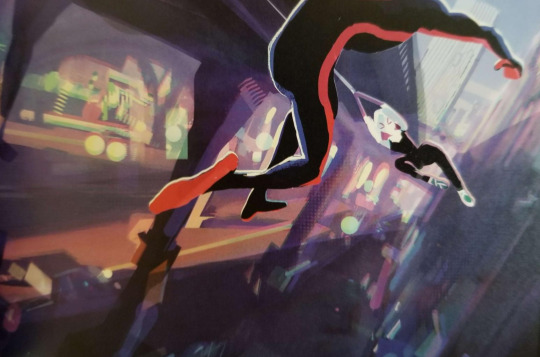
Okay guys, sorry for not doing much lately, holidays aside my laptop died so I am using something else in the meantime, so I had been a tad busy lately.
That being said, the Art Book arrived today! There wasn't a lot of ghostflower sadly, but I wanted to bring something regardless, so let's dig in!
Honestly while I don't consider myself an expert on these types of book, I own a few, and this one is...strange to say the least.
The formatting is off in a few parts, some things that don't make sense with what we are told in the movies, sections of the art book that assume we saw something on the movie that we didn't- I may do a post about it because looking at this book somehow gave me more questions than answers.
But that's a story for another post, let's go!
(Sorry for the quality of the pics, my phone isn't the best and I am not a good photographer myself.)
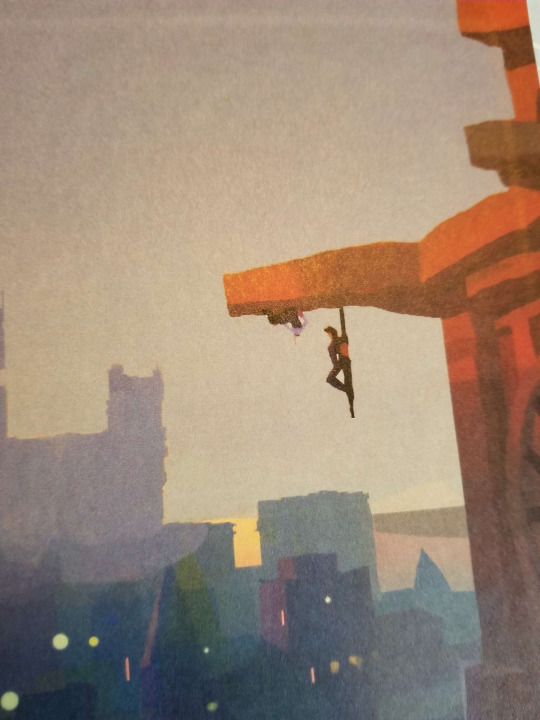
This one is right at the end, as part of the decoration between the walls of the book and the pages itself; it shows the entire city, but I focused on them for obvious reasons.
Also because the ending shot of this particular scene is one of my favourites in all the movie and seeing it in it's concert art form means a lot to me.
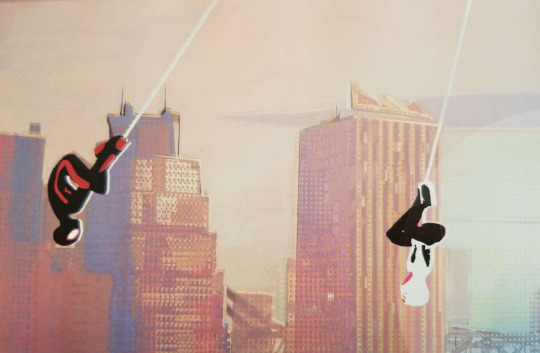
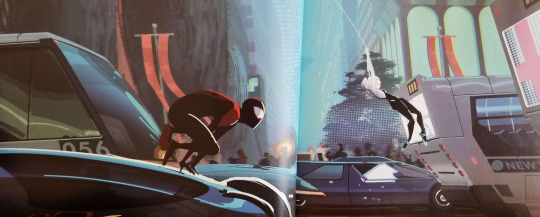
These two were in between pages at the beginning, the text talks more about the general process on the movie than them, so not a lot we can say.
Still lovely, I honestly wish we had more of Gwen and Miles swinging across New York, there is something beautiful and enchanting not only in them moving around in a way only a spider-hero can do, but also almost like a dance between these two.
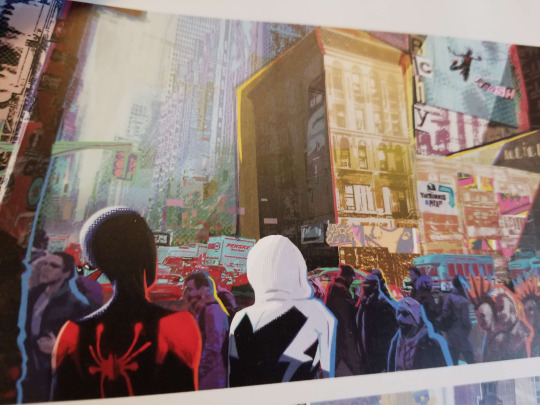
Not so much ghostfloweer, but I still liked this pic of them together in Hobie's world.
The book acts as if we were suppose to see this world so one of those crazy things about this art book is seeing the stuff that was in the movie before it was cut.
Honestly the making-of this movie would either be insane or extremely edited because this is nuts.
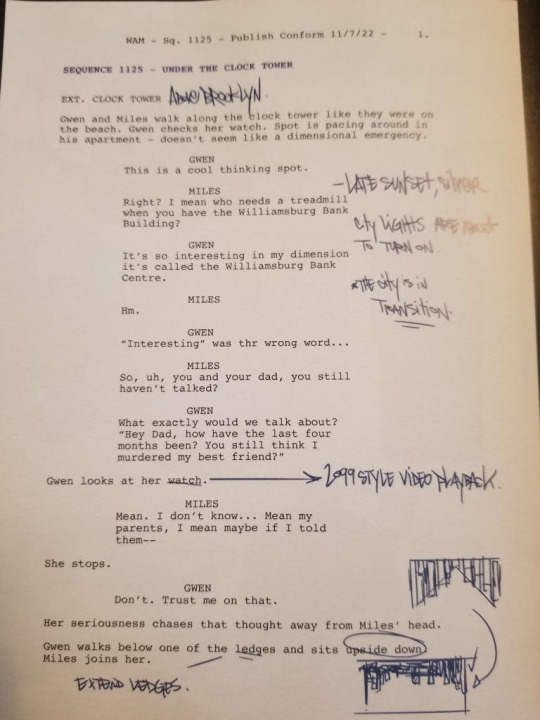
Oh ho ho, we are getting to the MEAT.
Okay, I don't read Scripts very often, but the times I had has been interesting, specially since a lot of times it can reveal some small gags that either got cut on the movie, or that things that were in plain sight that you didn't notice. DEFINITELY will be reading the Script for this movie once I get my hands on it.
In this pic, it shows a deleted joke, either this was going to be in the cut of the movie when the book was in development, or it was left there but was already planned on being scrapped.
What I like about this deleted dialogue is that it shows, once again, that Gwen isn't always at the top of her game. As cool as she can be, she is still a teen who hasn't figured everything out.
I honestly find her more endearing trying to stick the landing and failing that just being cool and collected all the time.
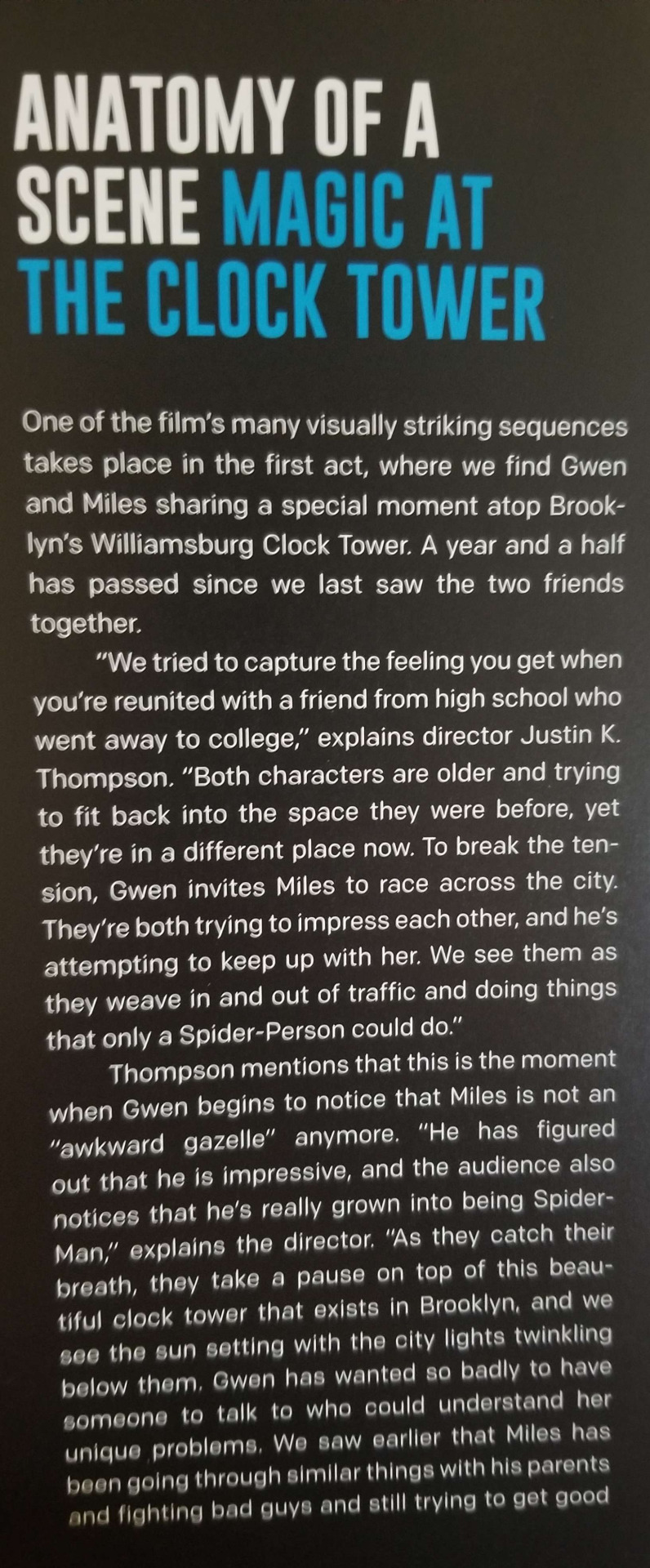
Sorry for the long box of text, wasn't sure where to cut. There are two parts in this I want to highlight.
"They're both trying to impress each other,"
I found this extremely cute because while Miles trying to keep up with her and impress her is obvious (Just like everything else with Miles, as a said, the boy wears his heart in his sleeve and we love him for it,) but to be honest I didn't think Gwen was trying to do the same.
Now I imagine Gwen looking around this New York and trying to see what she could do to impress Miles- I love these earnest dorks.
The awkward gazelle part is also pretty much present in the movie; however I do like the comparison on how Miles himself knows now more than ever what he is capable of, which really shows in the rest on the movie, including in the train chase scene.
(Not really Ghostflower, but I LOVE how Miles never doubt on himself despite what he heard, need to talk about that eventually.)
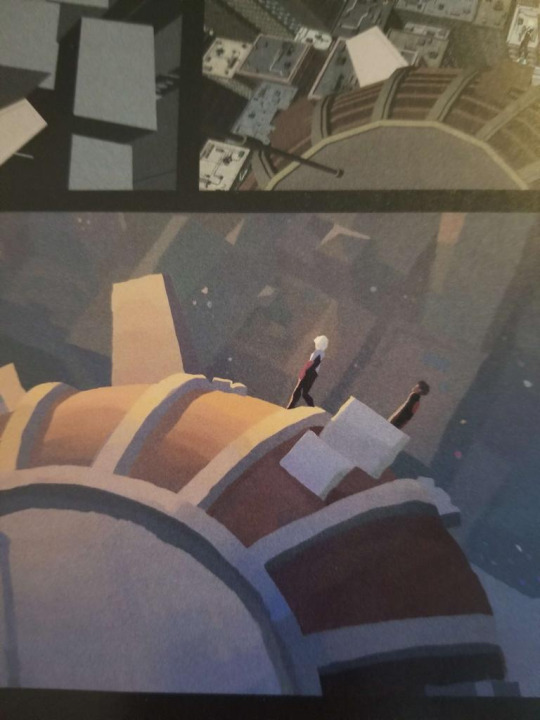
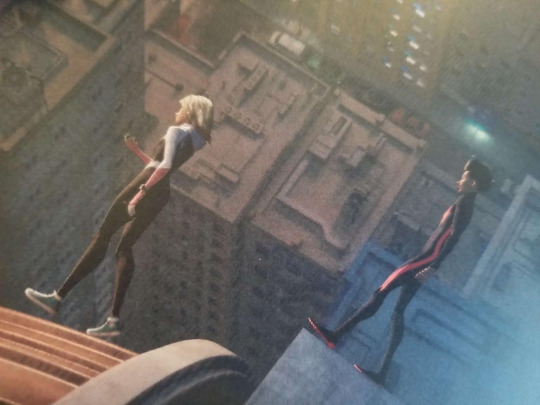
More art of this beautiful scene, which was sparkled around these notes.
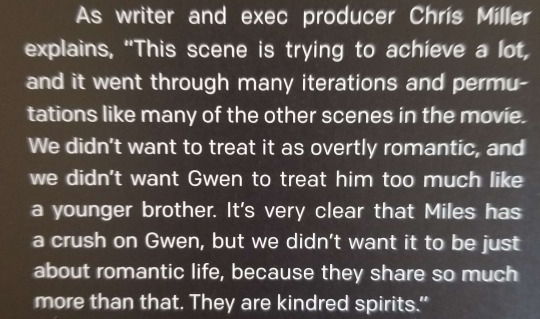
There is not much I want to analyze here as much as to, emphasize it?
Analyzing this movie so much and so often has really gotten to appreciate it to a whole new level, even if during said process I was able to see more of the mistakes and issues underneath.
This scene is really this and more, and what is astonishing is that is not that they are capturing the essence of the scene in some words, but rather come with the concept and create said scene, which is a lot more complicated.
And yet they pulled it off beautifully.
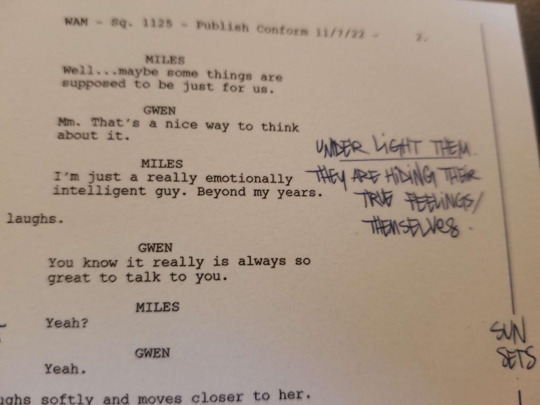

I really liked to highlight this part because 1) I and everyone else may need to start paying close attention to lighting because wow that detail is extremely cool, and 2) It really highlights a whole new layer to this scene.
They are getting close, both physically and emotionally, yet all the things they hide, how they hide themselves in a way, gets in the way of what they truly want. Is amazing because is a struggle that in the details is very much Spiderman, but below it is so human. Which honestly, part of the reason Spiderman as a whole as become so beloved over the years.
(Side note: Stan Lee decided to make Peter Parker in a era where superheroes were adults who basically could do anything, so coming with a teen who would also had teen issues was something that got people calling Stan nuts. Crazy how things how it worked out I'm right?)
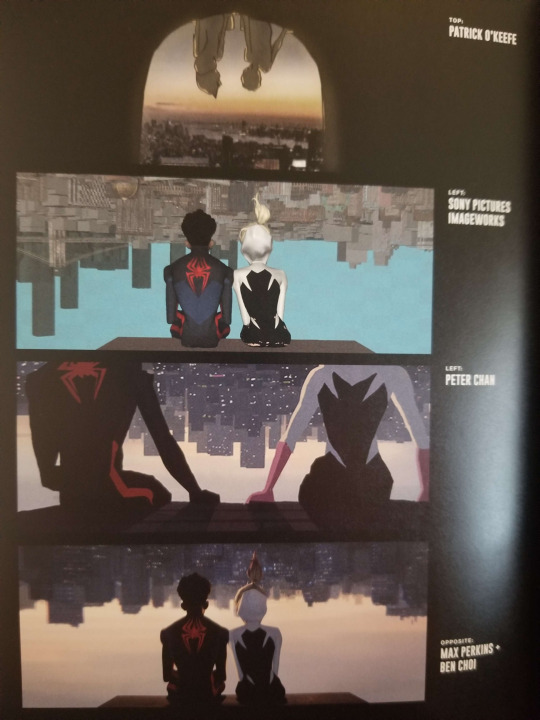
Different stages development of this scene because of course I needed to include this, even if i can't say much of it really.
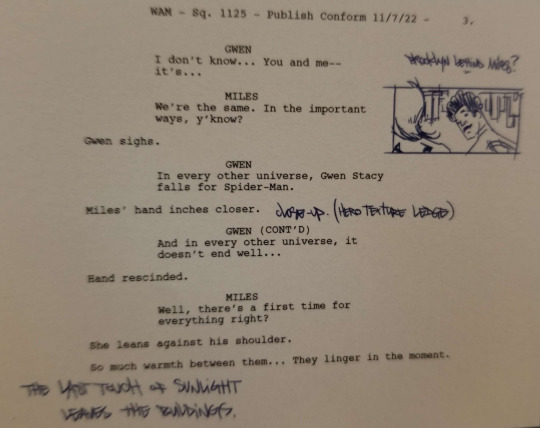
Not much to say here, except that this brief goes beautifully with the next excerpt of the book that I enjoyed.
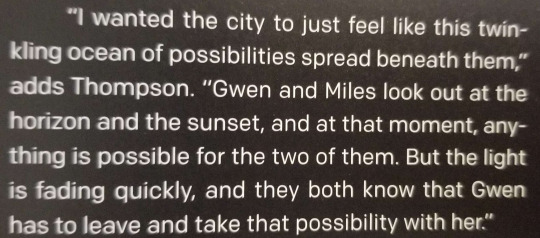
"At that moment, anything is possible for the two of them." Isn't all of this phrased so beautifully?
While not telling us anything new, I want to relish in this little bits that just makes the scene feel so much whole as you read this.
How both Gwen and Miles don't want this to end, to keep the warmth between them going, to just linger because neither of them want to let the other one go. Frozen in place unable to move forwards for thall the unsaid things, yet refusing to move back.
They are lovely.
And that's all I have for them sadly! This book was extremely odd, it was very much lacking a lot of Miles and Gwen (Which kind of tracks, art books go mostly about design and their design's haven't change much,) but the fact that most of this information was at the end, alongside other things, makes me curious about what the heck went down while making this.
Or other stuff because is not the first time we see the remnants of the other versions of this movie peaking by.
319 notes
·
View notes
Note
Hi! I was wondering if you had any tips on how to color the flashbacks in the begins episodes, because they have that weird green tint that's so hard to get rid of? Would really appreciate any advice you had! Love all your gifs :)
hellooo! that is really nice of you to say, thank you <3
yeah flashback scenes in 911 can be tricky to color. i don't know why they made the el paso flashbacks look so drab, or the hershey flashbacks so glowy and green lol. anyway, i have two flashback examples on how to go from this:
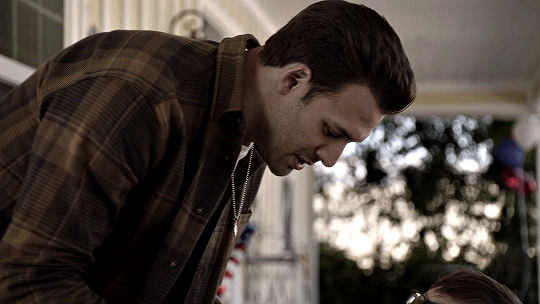

to this


steps under the cut (:
CURVES
the first thing i always do is usually use a curves layer to white balance the colors automatically. it can be quite handy, but it's usually not enough. it can be a great place to start though. on the top right you can click the 3 lines menu and choose "auto options..."


then you can play around with the different settings in the algorithms section, and the snap neutral midtones. there's usually one that's better, so i just toggle between them and choose which one looks best.

if the auto settings don't work well for your shot, you can always do this manually with the black and white droppers with a curves or levels layer. becca/@yenvengerberg did a great tutorial on it here (in the step one: curves section)
both gifs with curves auto color correction:
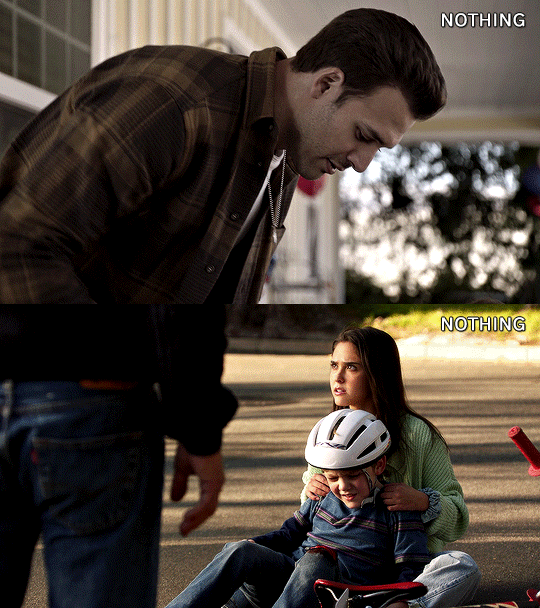
as you can see it brings the colors in a more neutral zone and less saturated, but the coloring still needs more editing.
COLOR BALANCE
i used a color balance layer to bring back some warmth into the eddie gif. i started by giving it a bit of red in the shadows, then with midtones and highlights, i simply played with the sliders until i got something i liked (knowing i'll grade the colors more specifically later).

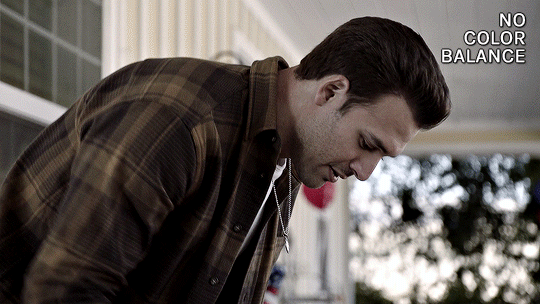
CHANNEL MIXER
for the maddie & buck gif, i wanted to reduce the yellow/green tint. i needed to add some blue to counter the yellow and channel mixer worked better than color balance for this one. this channel mixer tutorial by kate/@aubrey-plaza goes into so much depth, much better than i ever could, but here's how i did it:
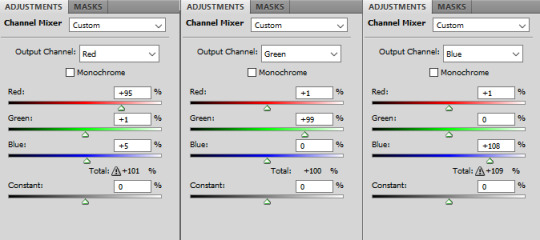
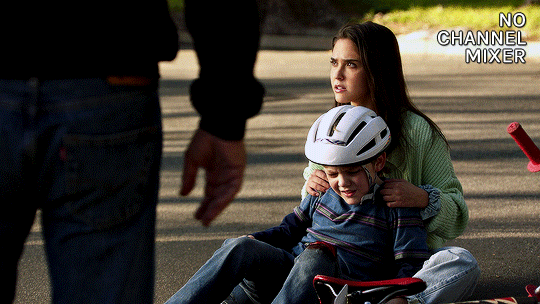
SELECTIVE COLOR
my favorite and most used layer! i use it all the time. for the eddie gif, i wanted to make it warmer and less drab. i always start with deepening the blacks, then i want to make sure the skintones are good with the reds and yellows.

then the rest is mostly small adjustments to my liking, especially with cyans, blues, neutrals. this particular gif doesn't have a lot of blue tones so it doesn't change a lot tho haha

selective color results for eddie:

then for the maddie & buck gif, i went pretty much in the same order: blacks, skintones (reds and yellows)
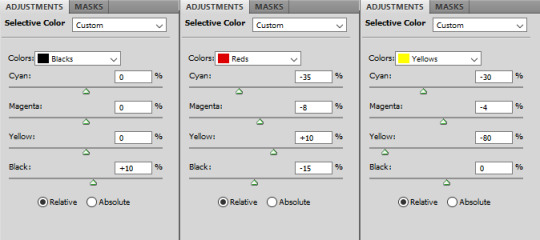
then blues, cyans, neutrals:

maddie & buck selective color results:

FINAL TOUCHES
now that the gifs are color graded, what's left is to add final touches, aka more vibrance, contrast, exposure, etc etc.
for the eddie gif i added these layers
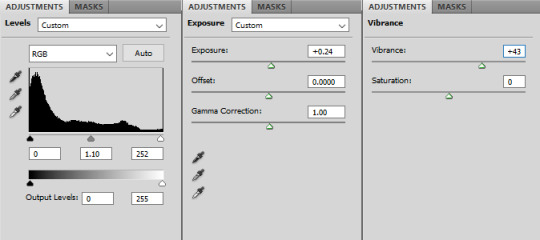

here's the layer order and final result:
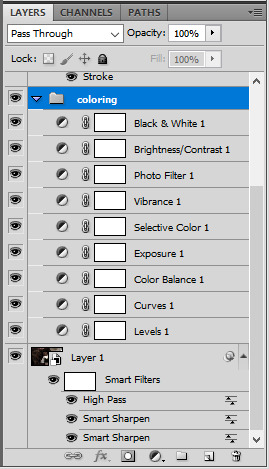
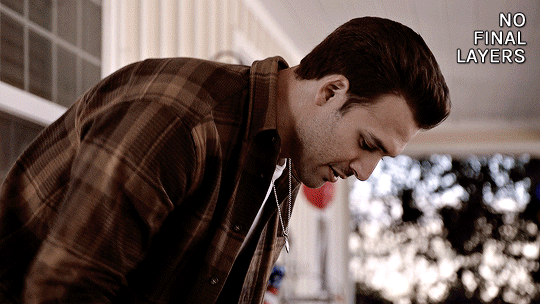

for the maddie & buck gif, these are the layers i added:


and the layers order and final result for that one:
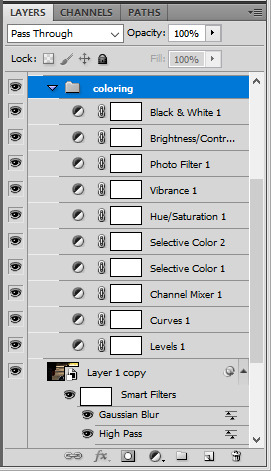

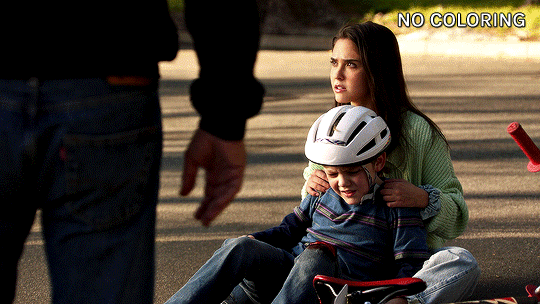
that's it, i hope that helps a little!
there's also this great tutorial by ace/@ajusnice on how to color yellow tinted shots, it's a great reference.
#alie replies#tutorial#*ps help#photoshop#completeresources#usermoonchild#userdena#uservivaldi#userisaiah#userace#userchibi#userraffa#userdean#usercharisse#usershreyu#userpjo#useraish#allresources#resourcemarket#userrebekah#Anonymous
143 notes
·
View notes
Text
5e Villain Arc 2
Last time we discussed 5e's stupid non-name. This time we're going to talk about chapter order.
I saw a post earlier about giving suggestions to 5e Players to "read the rules." While it is always a good time to poke at the children, I don't think that it is actually their fault (entirely) that nobody playing the game knows the rules. The Chapter order of 5e (and most TTRPG books, for that matter) is not conductive to actually knowing how the game works. This is compounded in 5e in particular because the game design is such that you never really have to learn anything outside what your character can do.
It is okay to divide chapters into parts. That's fine. What upsets me is that the Chapters have titles, but the Parts do not have titles. What is weird is that the game's introduction actually provides pretty good names for the three parts, albeit in inconsistent formatting: Adventurers, The Three Pillars of Adventure, and The Wonders of Magic.


Those align pretty much exactly with the three Parts of the book. Why is that not their names? Why must I divine what the parts are by intuition. This is not an abstract art piece--this is a textbook.
More importantly, the order of information is entirely wrong.

The reason why Players do not know how to play that game is because the rules for the game show up in between things that they actually care about. The game is so hyper-focused on a player making a character that it abdicates the responsibility of knowing how to play the game exclusively to freaks who actually want to read the rules in depth. You know: min-maxers and rules lawyers. The average player's interaction with the book is thus:
Read the introduction and get the gist of the game.
Make a Character through part one.
Oh wait, now I need to flip to the end of the book for spells (since more than 3/4 of all characters will have spellcasting)?
The Player FEELS like they have read more of the book than they actually have because they went through the process of flipping through it from beginning to end. However, at no point did they ever get a real understanding of how the game actually functions. They grasp that they have a thing called an action, a thing called a bonus action, and they have some amount of movement, but what these do does not mean much to them outside the confines of what their Character can do with those elements. They never learned what those terms actually mean, because the action economy of the game is not explained until WAY later (page 189). Even if you bother to read this section, it is entirely divorced from other important, very relevant sections. In particular, the exclusion of Saving Throws and Conditions from the Combat Chapter means that it will be even harder to guarantee a player will have read them.
Why are conditions in the appendix? They should not be in the appendix. They are standard things that players will encounter during regular gameplay.
Why are backgrounds AFTER class? Would it not make much more sense to put the background BEFORE the class? It is, after all, your background, the thing you did before gaining a class level. If you pick a background that compliments your Class by giving you similar skills, then you just get to pick random skills instead? This would not be a problem if you picked a background first (which gives you a set of skills without choice) and then you picked the skills from our class. I suppose the problem might still arise from tool proficiencies, but tool proficiencies suck, and they should be done away with, anyway.

Now that I'm looking at it, another case of "why are these in two different chapters lmao."
The reason they designed the book this way is because of the tradition of D&D being laid out in the dumbest way possible. Do not trust Gary Gygax's ability to convey information through text. He was not good at it. AD&D is a disaster of explaining its mechanics to the player, and 2nd edition is not much better.
The formatting of the book also sets a really bizarre trend throughout modern gaming that making a Character is the first thing every new player should do in a system when, like, no? Making a Character is a complicated process in most, if not all, games. At least in the sense that you have to make a lot of decisions upfront. The best way to introduce a player to a system is to have them play a pre-made and put a book in front of them whenever they want to review whatever is listed on their sheet. Once they've played the game, then they can evaluate how to make a Character because they will actually know what they are building towards. The formatting D&D has maintained funnels GMs and game designers everywhere to force new Players into an awkward, decision heavy first couple of hours instead of playing the game.
I'm not saying players can't make a character before ever having played the game. People want to do that sometime for my system; however it is a lot of work and time on my part to babysit you reading the most complex part of the book and answer your questions when MOST of what you are about to ask would be covered during typical gameplay.
Okay, that's pretty much all I have to say about this, I think.
Next Villain Arc Post:
Previous Villain Arc Post:
29 notes
·
View notes
Note
Casual reminder that to know the true amount of reviews an author get on ao3 you need to !
Divide the number of comments by the number of chapters (ex : 24 reviews for a 8/8 chapters story is 3 reviews)
Divide that number by 2 for the author's answers (so 1-2 reviews by chapters)
Big numbers are often just inflated, in particular for big stories ! There are never too much comments
(I know you know as a writer but your public is the more susceptible to care about leaving reviews. Also, would anyone be interested about a guide on how to write a review bc I know it's something people get stuck on)
Hi!
There's a few things I want to talk about in this ask, and I realize that you absolutely mean well, but trying to do breakdowns of comments or even kudos vs hits or anything like that is kind of... against the spirit of fanfiction? I think that's the best way to phrase it.
Comments don't get divided up evenly between chapters. Not necessarily. As a story picks up momentum, more people discover it and comment. Sometimes an author will drop all three chapters at once and people will only comment on the last one, etc. Some authors don't respond to comments, or are perpetually behind on them, so diving by two doesn't really work there. There's many reasons this doesn't shake out entirely.
But, moreover, I really want to encourage readers (and nonwriters I guess, more accurately) to realize that it doesn't matter how many comments a fic does or doesn't have. If you liked it and you feel led, then you should leave a comment. Obviously it's not necessary (and there are days where I'm brain-dead and I don't have the mental capacity), but comments on a fic are better than gold to writers.
There's not a magic number that means you have to leave a comment, or on the flip side, this fic has *enough* comments so I don't need to leave one. The spirit of fanfiction is that it's a fan service someone takes time to craft to share with the fandom, and you can encourage them to do it more by writing some nice words about their story.
Imagine spending hours and hours of your time working on something, thinking about it in the shower, talking to your friends about how to make it better, researching things online to make it better, editing down words, and when you go to share that--silence.
Comments are the lifeblood of fanfiction writers, it's how we know we're doing something that people like. Fanfiction is what keeps fandoms going when the source material dries up or goes on hiatus.
It's so so important to let writers know you like what they're putting out, or one day they might just stop. There is a point when we as writers get little to no feedback and start thinking, "What's the point? No one is reading this anyway." (This happened to me in the Dan and Phil fandom years ago). Now, I have a healthy view of my stories and I write for myself and my close friends (which is why i have such batty stories), but if my close friends didn't even want to read what I was writing, I'd just stop.
I've been very very blessed with a comment section in my time here in the DNF fandom. I've made friends through my comments, including a new IRL friend -- hi @czargasm.
Sorry, I'm not trying to be so preachy or single you out or anything. I think a comment guide would be really really lovely and something that could help a lot of people who would be willing to leave more comments if they had an idea of what to say.
As a writer, my favorite kind of comments to get are 1) in depth analysis, but of course that's a lot so, equally loved are 2) the "i was doing X thing when I saw you dropped a chapter so I ran here" and 3) "I made myself a treat to read this update" comment - extra points if you tell me what the treat was 4) A line you particularly liked or a story it reminds you of, etc.
Thank you for giving me a vehicle to apparently preach about comments. I guess I had a lot to say. Oops.
From the bottom of my heart, writers love comments. Nothing will make us write faster or better than knowing people are into out stories.
10 notes
·
View notes
Note
Only tangentially related to the post you made but I think the reason I find the dual attitudes of fanfic being the same as classic literature but also impossible to critique in good faith so funny is because they really seem to think that classical authors were never, like, challenged or censored or edited. It would be one thing if they were discussing fanfic which had gone through critics or editors, or had been in the works for years and undergone significant changes, but fanfic writers will knock out 200,000 words of the worst first draft I've ever read and then act like THAT'S of equal artistic merit to Dante's Inferno. It's very good
I think the most productive definition of fanfiction for this discussion is that it is a particular type of relationship a fan can have to art that is enclosed by intellectual property law. fanfic is “knock off” “unofficial” artistic articulations of a fan author’s interpretation of a text, which only makes sense in the context of privately owned and enclosed art. It’s not that amateur hobby writing has never existed, it’s not that people have never written derivatives of an original text before - those things have always existed. fanfiction is only historically noteworthy in the sense that it is constructed by a particular relationship an audience has to media IPs.
So like, yea fanfic is real art! that is a given. It is also not the same as professionally produced and edited work, which is good to remember when both criticising it and praising it. the only response fic tends to get is reactive - that is, there is no standard feedback mechanism that happens until after fic is written and published (betas/editors do exist but they are not universal or even common). and because of general hostility to critical or constructive feedback of any kind in the comment sections of AO3/FF.net (framed commonly as “well it’s too late to bitch now I already wrote it! What are you complaining about, you got free art!”), fic authors enjoy a very tight bubble of overwhelmingly happy, positive responses to their writing. Which is FINE, I don’t post fanfiction with the intent to get an essay back from people about what needs to be edited or changed, I wrote it for fun like everyone else, but that also means it exists in a very different social environment from commercially/professionally produced art, and as a consequence I’m not going out and proclaiming that I’ve written the next great western epic in the form a star wars fanfic, and if I were to do so I would be asking for a much larger public audience, an audience who is not going to consume my work as fun hobby writing but instead as serious literature, and respond accordingly
78 notes
·
View notes
Text
Guides and Resources for New Mlp Collectors
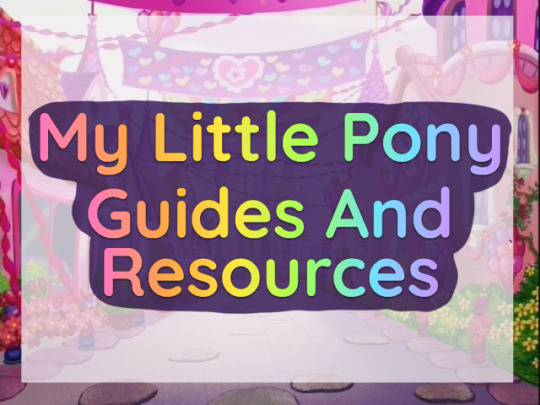
A collection of resources I wanted to compile for fun and for easy access, in case there’s any new collectors who are interested
UPDATE: Since this post is so long and has been a little difficult to manage due to tumblrs editing tools, I am moving this "Resource Masterlist" to my Website Here, and will no longer be updating this post on tumblr. Thank you guys for sharing and supporting this post!
Disclaimer: i am still probably considered a relatively new collector, so im not an absolute fountain of information and there are probably tons of resources I have missed, feel free to add more in the comments and reblogs. I update this post when I can to add resources and give you the most accurate information, so please click on my blog to look at the most up to date version (it is my pinned post ^^)
Identifying Ponies/ Databases and Lists of Ponies
Mlp Merch Database- Visual list with pictures of pretty much every single release of Pony Dolls/merch for every single generation, in release order. Useful for if you want to scroll through a particular generation’s releases with pictures, very thorough and complete. If you make an account you can make checklists or wishlists for yourself.
Strawberry Reef- Visual list with Pictures of Pony Doll Releases. I feel like the pictures are slightly bigger (and thus easier to look at) than mlp merch database but that might just be my computer. G1-5, though I feel like the g4-5 sections are a little incomplete. For g1 and g2 you can sort by release date pretty effectively. This website is ESPECIALLY useful for quickly identifying ponies because you can sort by color, pose, or characteristics! However it’s not as complete a list as mlp merch database or my little wiki.
My little wiki- One of my favorite wikipedias ever (It’s an actual wiki, NOT A fandom wikia). Has lists of every release for every generation (Though the more recent gens might not have photos for every single release yet). The lists are NOT visual lists like the previous two resources so I use it less for identification, more for finding out more specific information about a certain toy. It will list pretty much every single variation/regional variant of every toy, as well as more information about their releases, which accessories they came with, backstories from the back of the box, ect.
Toy Sisters- I use this website less for identification and more for getting really good close up photos at every single pony and their accessories if you want to get some close up, detailed looks before you buy for example. You can sort generally by type, pose and year. As of writing this they do not have g5 info. If you collect other dolls or toys this website may be useful to you because they have more than just ponies.
Ponyland Press- Has photos and information on g1 releases in order, as well as country exclusive releases. Also has some information on certain accessories, ponywear or other merch. Also has some information on cleaning and some restorative information.
Restoration and Cleaning
(IMMEDIATE PSA IF ANYONE IS LOOKING AT THIS LIST TO RESTORE A PONY WITH MARKER OR HIGHLIGHTER ON HER: do NOT use acne cream like removezit or any other creams on her! This can lead to awful, permanent discoloration and staining! Instead I would look at what the mlp preservation project (linked below) says about sunfading!)
How to clean- Very basic guide on thoroughly cleaning toys, plus some styling tips
Hair Styling Tips
More Hair Styling Tips
Hair Styling: How to make twists and buns! This guide is intended for customs and talks about pushing pins into the pony and trimming the hair once you’re done but im sure it can be adjusted for non customs in a way where you don’t actually cause harm to the pony
MLP Preservation Project- One of the most useful guides for restoration, has sections on pretty much every major restoration need you might have. Links to so many different sources, tutorials and guides for fixing your ponies if something is badly wrong with them. godsend.
The Lavender Lagoon- A resource specifically for G2! Has identification and checklist materials but also has guides for hair matching and color matching eye crystals if your g2 pony's eyes have fallen out
Hair Matching Guide- A guide for closest hair color matches using dollyhair colors. Has g1, but it is a wip site. Looks like it will have other generations eventually too
Hair Length Guide- By no means complete, but has a bunch of the exact hair lengths for certain ponies g1-g3 written out, useful for looking for exact hair length measurements for rehairing. (Side note: If you can’t find how long a certain pony’s should be, ask around the community! I don’t bite and would be happy to measure a pony’s hair for you if I have the same pony, and I’m sure there are many other collectors who would be willing to do the same ^^)
Rehairing Youtube Tutorial: Using the main method most commonly used, in my opinion the easiest hairing method
Rehairing Youtube Tutorial: Loop And Lock Method: For if you struggle with gluing hair into the head
Alternate rehairing Method Tutorial
Rehairing with Yarn Youtube Tutorial
Little tutorial I made once about retailing (rehairing the tail)
Youtube tutorial for restoring g1 glitter symbols (Restoring non glitter symbols would be similar, just without the use of glitter)
Aikarin’s Custom Tutorials: A ton of tutorials related to creating custom ponies, also has some stuff that could be used with restoration
More Custom Tutorials: Intended for customs but techniques could also be used for restorations
Reflocking Youtube Tutorial - This video in particular shows reflocking small patches of missing fur. Be sure to look at the guide linked on the mlp preservation project as well
Materials for Restoration
Oxiclean- Good for cleaning ponies
Magic Eraser- Good for cleaning Stubborn marks on dirty ponies. Please be careful of cutiemarks, eyes or other painted symbols. For less stubborn marks or if you dont have a magic eraser you can use a toothbrush with dish soap on it :>
Baking Soda- I have heard that using this can help get rid of bad smells on toys, if your pony has a dirty odor! Have not tried this myself. Cover the pony in baking soda in a baggie for a few days. Similarly if you want to restore smells by scenting a pony you can use fragrances, though be careful because certain chemicals may damage your ponies!
Shampoo and Conditioner- Essential for washing and styling manes and tails. NOTE: If you have a pony with UV based color changing hair (like a g1 Sunshine Pony or something similar) Its recommended Not to wash it with soap or shampoo as it can damage the hairs ability to change color! be very gentle, water should wash it fine
Shimmerlocks- My personal favorite place to buy hair. They have close color matches for pretty much every single g1 (And have it set up for if you just search the pony’s name it will show you the closest hair matches for them!). Each (normal nylon) hair color is about 5 dollars, and they also have affordable rehairing tools and needles for only a dollar each. I’ve emailed them for color matching help before and they respond quickly and are very nice and helpful. They also have (slightly more expensive) color changing hair, glow in the dark hair, and textured hair (that are probably for other, non mlp dolls since i assume you need different hair plugs for them, but super useful if you’re a general doll collector, not just mlp)
RestoreDoll- I haven’t used this one personally but have heard people recommend it ^^
Dollyhair- A little controversial since the previous owner has had links to racist, antisemitic, and white supremacist sites, but the website is now under new ownership and is women and poc owned now! Wanted to get that out of the way since I was originally misinformed about the site and thought it was bad to use, it’s important to know about it’s past but also important to note the new ownership. They offer a lot of different hair colors, textured hair, Rehairing tools, Doll paint and even hair fragrances, with their (normal nylon) hairs being about 4 dollars each
My Little Customs- UK based nylon hair distributor, has a lot of nylon hairs but also other special hairs. They also have flocking and other materials useful for restoring dolls.
RIT Dye- The dye I use for pony hair (I have heard people also can use it for dying pony bodies for customs, but you have to be careful storing them because it could stain other ponies over time!). Good, high quality, long lasting and not fading. If you are repinking a pony with faded pink hair, I always use Petal Pink
Forceps- If you can find some online, wonderful tool for removing hair, rusty tails, or any object that might be inside your pony. Godsend, I use it all the time when rehairing. Tweezers can also work if you dont have.
Fabritac- Glue of choice for Rehairing and gluing heads back on
Fun Flock Cottonball white- Can be use to reflock or flock a pony. Visually looks similar to a g1 so soft, though the texture and look is slightly different. This is what I’ve used to restore a so soft in the past
Mod Podge- Glue of choice for flocking
Apoxie Sculpt- This is what many people use to restore broken or chewed off body parts. Durable, though may be a little more difficult to use and expensive than other basic air dry clays.
Model Magic- Personal choice for air dry clay to use to fix broken/chewed off body parts. You specifically need an air dry clay (as you cant really bake a pony body without it melting) and Model Magic doesn’t crumble and has a soft (? dunno how to describe it) toylike, texture when it dries. Just note you should avoid getting it wet. You could also use your own personal choice of air dry clay.
Rust Removers- I typically just use white vinegar to clean rusty bodys/tails/beddy bye eyes. Letting the rusty pony/hair sit in a white vinegar bath and scrubbing gently with a tooth brush will remove most rust. For harder to remove rust I’ve heard Rit Rust Remover works well, though this is more expensive and I haven’t tried it myself.
EcoStardust Glitter- I specifically sought out a biodegradable glitter for my restorations, and this is the one I’ve used. Has basic colors of glitter in various sizes. (Choosing the finest option they had) It isn’t exactly the same fineness as the original g1 glitters, but it was fine enough to work and look good on a complete cutiemark restoration. Here’s an example of what it looks like on an actual pony if you wanna see how it looks compared to the original glitter. Please note you can use whichever glitter you want, there are definitely better/closer matches to the look (And I’m sure normal glitter is cheaper/easier to get). If you don’t mind using a non biodegradable one look for “ultra fine”, I just specifically felt better using a biodegradable one ^^
Acrylic Paint- Good for custom work but also for restoring Cutiemarks!
Paintbrushes- You’ll need different kinds depending on what you’re doing. Get high quality nice ones if you wanna paint a custom or do detailed cutiemark work. If you have any of those cheapo, bendy, shitty dollarstore paintbrushes: those are great for gluing hair into heads because they’re bendy and can reach hard to reach areas, and you wont destroy an actual good brush with glue.
Hydrogen Peroxide: Can be used with sunfading to safely remove certain stains, read more here
Accessories
HQG1C- This is actually a huge, fan project creating a ton of “high quality g1 customs” they’re very cool. I’m putting them here not only for their customs but they also have cool stuff for customizers and collectors: Blank Pony Bases, Hair/rehairing tools, replacement shells for sea ponies, replacement cowboy hats for a big brother pony like Tex, ect. Here is Clipper’s website (Ships in USA) And here is a UK distributor and also another UK distributor
Sweetheart Sister Earring Replacements- (Sometimes I see these going out of stock, I’m linking someone who’s selling them as of writing this on july 28, 2023)
Flutter Wing Replacements and Windy and Summer Wing Replacements- (Sometimes I see these going out of stock, I’m linking someone who’s selling them as of writing this on july 28, 2023). Also worth noting the pony preservation project has a few tutorials on how to make some wings, these are just links for if you want to buy some.
Custom Flutter Wing Tutorial- This specific one is a custom look a little different from the original flutter wings, but looks gorgeous
Dress Ponywear Tutorial- A pattern I made myself of a basic ponywear dress, free to use. Works for g1 and g3 (have not tried to adjust it for other generations yet)
Pony nightcap sewing tutorial- idk thought I’d throw this in too, very simple sleepy nightcap sewing tutorial that fits ponies, free to use (I made it for a bbe)
Pony Blankets, Bandanas, diapers and other accessories patterns- To replace missing accessories if you wanted to sew them yourself
Community (Forums or Areas you may want to go to ask questions from others!)
My Little Pony Trading Post- A dedicated MLP forum, with sections dedicated to discussions (I often see people asking or answering questions about restorative measures for example), art, customs, or other topics. No profanity is allowed and you have to be over 16
My Little Pony Arena- I know this forum exists and that a lot of people discussed restorative topics on there and used it as a resource for stuff like that, and so I felt the need to mention it: but the site is quite literally unusable if you don’t have an account, you can’t access any pages, and to make an account you have to wait for it to be approved. I tried signing up but it has been awhile and I’ve heard nothing back, so I’m assuming this is one of those sites that are largely inactive in the modern day 😔
My MLP Discord Server- Figured I’d throw this in there: An MLP server I made for fans of all/any generation, not necessarily toy specific either. If you wanna ask me or anyone else a question or advice about toys or restoration or something or you just wanna say hi feel free to pop in :) Very Very causal
MLP Collectors Discord Server- Not mine but very fun, for fans of all gens, some nice people there :) Is a lot larger and more structured than my own server
107 notes
·
View notes
Text
Cupid's Writing Diary - 2/4/25
Entry End of Day February 4th, 2025
As Kiwi inspired us and Bee has started posting these, I wanted to as well! Not that there's much to say, ahaha. [Note: he ended up finding a lot to say LOL]
If you don't want to see these, just block the tag 'Cupid's Writing Diary'. Oh, and they will not be put into the queue like everything else has been.
Wrote roughly 400 words today, which is awesome. I haven't been writing much lately despite how strong of a year I started with. I'm sure this is due to my current distractions but I already wasn't writing before Hello Kitty Island Adventure came out~
I've made the executive decision to stick with one project when it's done. A second project will be picked as a backup in case I need an ADHD switchover distraction, but, again, thanks to HKIA, I do not think that'll be necessary at this time.
I always feel weird saying my fics before they're posted, because I'm worried that'll make them boring when the time comes, but I think talking about the plot for this one won't spoil the fun and magic about it?
So, out of my 29 [yikes] options, I have ultimately decided the one want to work on is a fic I've so lovingly dubbed 'Snautism', a name which is slowly becoming the official title work.
This oneshot project started back in July 2024 when my snake hyperfixation took my life over by storm. And, as all things go since playing Danganronpa in 2020, I immediately had to Saiou it. I'm really excited for the plot of this fic and all of the fun snake facts [about one particular species] I can shove in it. At the end of the day, this one is for fun and just for gushing about my love of snakes/this species. There's also just a morph that I think fits very, VERY well. [Multiple, actually, but one more than the others.] Section 1 is completely done, yay! I'm the type to over-edit and despite editing it 5 times there's still things I'm not satisfied with, but that section is officially ready to go out for beta [not that I'd send it early, it'll all go at the end]. Section 2, however, has been driving me mad SINCE July, honestly. I just cannot make up my mind about the order of events or the feelings of scenes and it's driving me mad. Past me would just write it on passion alone and fix the inconsistencies later smh. Still, I just jumped ahead to a different part today and wrote a good chunk of the first big reveal!! Though I'm worried I'm drawing it out too long that it won't hit as good? Eh, I think I'll leave that one up to the beta as well.
I haven't actually got to talk about what snake it is in the fic, though, and I'm SO excited to do that, because these snakes do something so special that I'm just gidddyyy about how in character I think this is going to be. God I hope the humor in this scene lands ehehe. I've always lived by the rule of 'if it makes you laugh, it'll make others laugh' and thank goodness that hasn't failed me yet!
Well, this was honestly extremely therapeutic! And it made me write so that I had something to talk about lol. Who knows if I'll keep it up. Historically, no I won't. But I'd like to think that it's a good first step. And maybe more people than the same three people I tell everything to knowing might be good for me? Dunno. It's been a long and arduous process picking myself back up from the bootstraps of the hellyear that was 2022, but each lttle bit helps! I can tell I'm a LOT better than I was, and I might even get out more than two Saiou fics this year.
Oop, rambled again. I'm defs a typer/rambler. So thank you for reading if you did. Feel free to send me asks about this project or others! Love talking about writing and reading and Saiou!
6 notes
·
View notes
Note
Hello!
Firstly, I like your blog very much. You give very useful advice and talk about lots of cool things that I wouldn't have otherwise considered :)
One of those things is how much the difficulty of different classes varies. I'm going to be DM-ing for the first time soon and I was wondering if you could elaborate a bit? I want to avoid my players making characters that are too complicated and it being hard for them and me to keep track of, especially since it's a pretty big group and we're pretty much all novices. What do you think I should steer clear of?
I and a few of the players have played a session together before and I watch quite a lot of actual play shows but some of the players aren't familiar with gameplay at all. I'm unsure whether I should encourage them all to read the basic rules first because I think it could be a bit overwhelming and potentially off-putting having to read so much. Will it be okay if I just explain the important bits before we get going and deal with anything else when we get to it?
I'm also a bit nervous about keeping the campaign engaging for everyone and getting the pacing right. Do you have any tips for that or for anything else in general?
Thank you!
I'm going to go ahead and assume you're playing 5th Edition D&D since that's what most people are starting on these days. But my advice should be pretty much true for any version of D&D/Pathfinder.
The spellcasters are the most complicated classes to play. I would put druids, wizards, sorcerers, and clerics as the most complex classes. They all have an extensive list of spells to choose from, and each spell is special and unique.
With that being said, I wouldn't forbid players from playing those classes. Rather, I would discourage those who are less inclined to do bookkeeping/preparation from playing those classes. If you have a friend who already makes spreadsheets for fun, there's no reason they can't handle playing a wizard. They're just going to need a reference handy during the game. Either their own copy of the book, or just using their smartphone to google the spells.
I will say that you should discourage more than one player from playing the same class, if you can. The game is more fun when everyone has their particular niche.
As the DM, I would encourage you to skim the entire player's handbook. A deep reading isn't necessary. It's a reference manual, so it will be useful for you to know how it's laid out so you can find things when you need them.
As for everyone else, they should definitely read the section on whatever class they're playing. But beyond that, I think your instinct is correct. For most players, learning the game at the table through play is more intuitive than by attempting to read the whole book. If you think you understand the action economy pretty well, that's the most important thing to start out with.
I wouldn't be too worried about pacing and such for an entire campaign just yet. For now, try to focus on running a really solid session. A good session of D&D will involve giving the players a chance to use their interesting abilities (most of which pertain to combat). But it should also give them opportunities to act in character and make decisions. I have a guideline for a tutorial session here if you're interested. Once you feel confident about how your individual sessions are going, you can extrapolate out to a larger framework. But really, you don't want to plan too far ahead anyway because you never really know what your players are going to do.
As long as you and your players are enthusiastic about this, you're probably all going to have a great time. Thanks for the question, and good luck!
10 notes
·
View notes
Text
How I organise my (fic) writing in Notion
@this-geek wondered how I organised my works in Notion, and considering I'm nothing if not always happy to ramble about anything concerning lists and sorting my various things, here we are ;) thanks for giving me an excuse to talk about this haha
Under the cut because I have unfortunately rambled quite a bit (sorry!)
Okay so first off: I really only use Notion for my fic writing (I prefer to work on original projects in physical notebooks or Word, for reasons unknown to even me) and I only keep my first drafts in here. I move on to Google Docs for second drafts (again, who knows why I do this? I sure don't!) Anyway, onto the organisation:
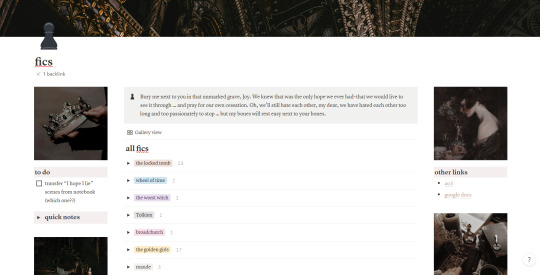
This is what my main page looks like! I have some fancy sidebars I never really use, the to do list is horribly outdated, and I haven't updated that quote (from one of my favourite book series: The Locked Tomb) in ages, but I still think it looks nice!
The thing this is mainly about, though, is the part in the middle that says "all fics". This is what Notion calls a database. It's basically one gigantic collection of pages (in my case: fics) that you can add tags to and display in various different ways. I prefer gallery view because it allows me to add a picture to the overview if I want to. I used to do this for my Locked Tomb fics and it looked pretty fun:
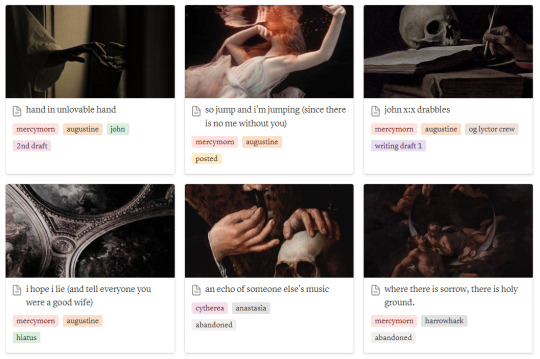
The thing is that it's also a lot of work to find pictures to match your fics (and nowadays I'm more focused on writing than all the thing surrounding it) so my Golden Girls overview looks more like this! I still like the gallery view because it gives you a little preview of every wip :)
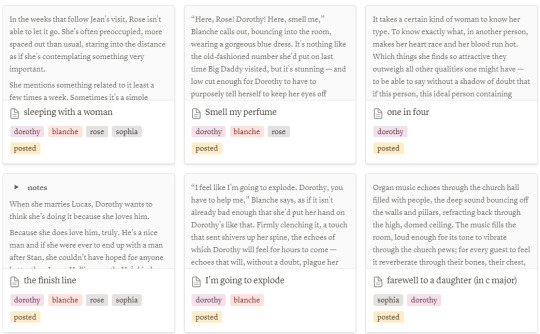
As you can see, there's lots of different tags under the titles. The stuff you see in this view is a quick overview (mostly to help with sorting, so all my posted wips line up, and the rest shows up according to which state of unfinishedness they're currently in)
When you click any fic in this view, you'll be taken to the actual fic, and its complete overview of tags & info! I like to keep track of a lot of things (when I remember to, anyway). Here's a little overview for the things I tracked for the finish line :)
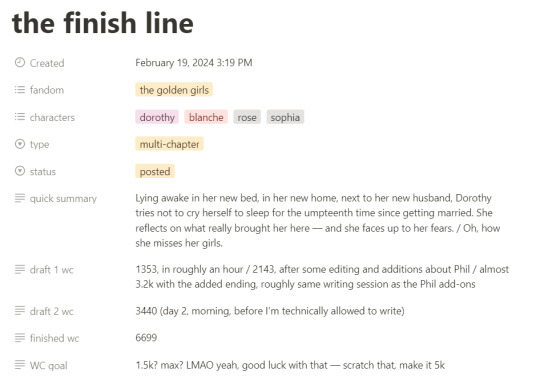
Created: shows me the date I started the document (and therefore the fic). Very useful! I love this feature a lot
Fandom: is mainly there for organisation purposes! I set my gallery view to toggle per fandom, so it's all sorted into neat little sections thanks to this tag
Characters: pretty self explanatory
Type: I've got several categories here: "one-shot", "multi-chapter", "drabble", "ficlet", and (reserved for one AU in particular) "i honestly don't know anymore"
Status: again, there's quite a few options for this one: "plotting", "writing draft 1", "1st draft", "2nd draft", "finished", "posted", "hiatus" and "abandoned" (which I rarely use)
Quick summary: is where I play around with my ao3 summary whenever I'm bored and don't really feel like writing
Draft 1 wc: I usually just put the final word count for the first draft there, unless I remember to track individual writing sessions (in which case I add those word counts as well, like in the example above, because I love looking back on the process!)
Draft 2 wc: I tend to completely retype a fic into my google docs for the second draft. Once I've done that I put the end result into my Notion doc
Finished wc: after I've reread and edited my 2nd draft, and possibly managed to have it all get a little out of hand (like you can see in that doubled word count for the finish line, lol) I put the finished word count here!
WC goal: is just a fun way to see what my initial idea was for the fic (I try to set a goal when I've got a general idea of what I want the work to look like, and always end up exceeding it)
The rest of it is just my writing, basically! Scroll down from there and you get the body for the fic :)
I hope this was somewhat helpful! I'm not a pro at Notion by any means, but if you have any questions or need some help, feel free to ask! I'm happy to try to help out!
#notion#alys.txt#my writing#how does one tag this lmao#notion tour#is that a thing??#i think that's a thing
12 notes
·
View notes
Text
TinyOZlion's GW Episode Guide for People Who Aren't Gundam People: Episode 01 - “The Shooting Star She Saw”
ᕕ( ᐛ)ᕗ OH boy oh BOY! It's time for PGW's first episode analysis! Let’s get started!
First let me pop in my 20 year old VHS tapes! ...Wait, I can’t. I don’t have a VCR player anymore, huh. Well, okay, let me just pop in these 20 year old DVDs! ...Nope, I can’t, computers stopped having disc drives in them. So... I guess. Uh.
Okay. Listen. Hear me out: I’ve bought this entire series on TWO redundant formats already. I’ve bought every manga. I’ve bought posters. I’ve bought model kits, I’ve bought figurines, I’ve bought toys.
I HAVE PAID MY DUES TO YOU, BANDAI! NO MORE!!
–80 minutes and 2 seeders later–
Wow, so this is the Blu-Ray edition huh? Let’s check it out, how different could it bbbvvhOLY SHIT
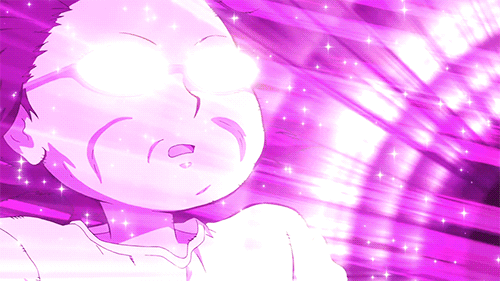
It’s so…… crisp.
This feels intimate. I shouldn’t be seeing the Gundams like this. They’re… they’re so… clean. I don’t recognize any of these people without the artifacting, the scan lines, the VHS blur.
I can see all the cel jitter??
No… NO! This is wrong. This is DISRESPECTFUL.
God never intended 90’s anime to be viewed at 1080p! It wasn’t DRAWN in 1080p!
And yet… the color quality… that seductive line definition …
Fine, The Crispness, you win. I’ll watch my anime in high definition, but I WILL NEVER FORGET MY ROOTS!!!!!!
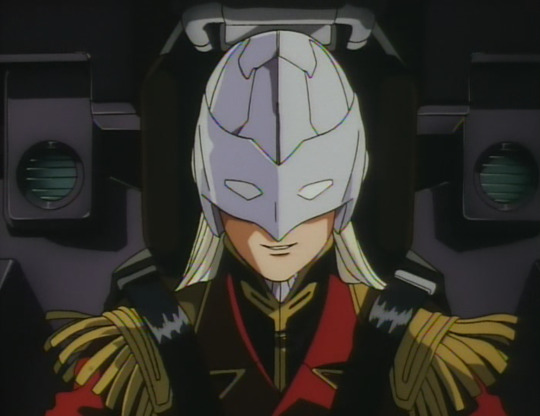

...Actually fuck that, this is gorgeous and I’m never going back. If I ever have a few hundred bucks burning a hole in my pocket I guess I’ll just buy it AGAIN. To be responsible.
OKAY. Now we can start.
Note!: While this Episode Analysis is sort of 1/2 walkthrough for new viewers and 1/2 refresher + commentary for returning Wing fans, what it ISN'T intended to be is a full episode summary (for really good episode summaries, you can go here!) However, I am going to be going over this particular episode with a fine tooth comb, because episode 01 is by far the worst offender of the series. It’s got it all: bizarrely worded dialogue, mistranslations, delivering a bunch of new information to us by taking it out of the fridge and pouring it directly down the back of our shirts... Later in the series I will be grouping episodes together to cover more ground, but this one is a doozy, so it’s getting its own solo entry. Get ready: The pacing of this first episode is BONKERS. Things are going to move very fast, and a lot of new concepts are going to be dropped in quick succession.
*Ahem*
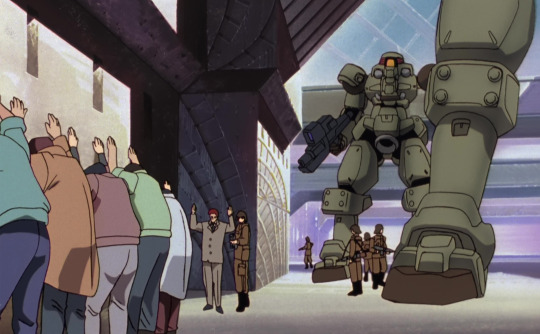
With high expectations human beings leave earth to begin a new life in Space Colonies. HOWEVER– (the way Optimus-Narrator says “However” lives in my brain as a permanent sound bite) the United Earth Sphere Alliance gains great military powers, and soon seizes control of one colony after another– in the name of “justice” and “peace”. The year is After Colony 195– Operation Meteor: in a move to counter the Alliance’s tyranny, rebel citizens of certain colonies scheme to bring new arsenals to the Earth, disguising them as shooting stars. HOWEVER– the Alliance headquarters catches on to this operation...
This intro is actually very succinct, clear, and to the point– IF you already know what to expect from this genre. (In my section on the history of Gundam in Japan and North America, I talked about how Wing's opening exposition was written based on the assumption that everybody watching would already be familiar with the basics of the Gundam franchise, so all that needed to be explained for Wing was what was departing from the original.)
--The main takeaway from the exposition is that A) There are Space Colonies, B) The earth is oppressing them via its military, using big robots to terrorize the small squishy people living in the space hamster wheels; and C) during something called “Operation Meteor”, an unspecified resistance group from the colonies sent secret weapons to earth.
Earth Big Military Bad, Space Colonies Oppressed, Space Colonies Send Five Mystery Weapons To Earth To Do Something About It. Okay we’re all caught up.
--Oh, what are the big robots? They haven’t been introduced yet– presumably because every single person watching this Gundam show already knows what Mobile Suits are, and knows that a Gundam is a big, special Mobile Suit, right? Unless you’re me, and nine years old, and watching it for the first time in America in the year 2000 AD. So just in case you're me from then and I'm me from now, let me clarify: the big robots are called “Mobile Suits” and this is a show about them. They aren’t Transformers, they need a person inside to make them go.
Let’s meet some of them, shall we?

--In this really very pretty opening sequence, we are shown the five mysterious capsules shooting down to the big blue marble that is earth. Fun science note: compare these to the Apollo command modules, and other vehicles designed for reentry!
--We cut to an Alliance surveillance satellite. The crew has picked up the Secret Colony Weapon Gashapons on their radar, but have no idea what they are. It’s probably just space debris, but just in case it’s Something Bad, they decide to let the closest available military person know about it, so someone with guns can deal with it.
--It is indeed Something Bad, and the military person they tell about it already KNOWS it’s bad, because he’s a main character and his name is Zechs Merquise. He’s the handsome fellow wearing a strange helmet/mask.
He is immediately dismissive of the Alliance satellite crew, because to him it’s obvious that space debris wouldn’t “ride the wave course to earth”. I have tried my best to identify what a “wave course” is, to no avail. I’m assuming that here it means a standard or safe path for reentry vehicles to take.
(EDIT: It turns out "wave riding" is a thing from Zeta Gundam! It is indeed a procedure mobile suits use to "surf" with a heat-shielded device for safe atmospheric reentry! Now we know!)
--As alluded to by the Narrator, the Alliance (or at least, this particular and very significant group of people currently associated with the Alliance) does in fact know something about Operation Meteor (or “M”). They being to close the gap on the one capsule out of five that they can catch up with.
–And here’s our first round of confusing dialogue! Goodie!:
Zechs: “One would do just dandy. A hired front line soldier mustn’t rush to battle.” Soft-Spoken Zechs Groupie Who Doesn’t Get A Name So I Will Call Him “Milo”: “That’s quite the bold statement, sir.” Zechs, chuckling: “I told you. I am a True Soldier.”
–Now, what the fuck does any of that entail. Allow me to explain:
Firstly: Zechs indicates that catching up with only one capsule is fine (or “dandy”), because Zechs suspects this encounter will lead to combat of some sort, so even if it WAS possible to catch up with more than one capsule, it would be risky to engage multiple targets of unknown abilities. “A hired soldier” would be especially unwise to do so, because they’re not fighting for anything particularly meaningful– they’re just there to do a job, and why be in a hurry to die for your salary?
--This is our first introduction to Zech’s ethos on fighting and what it means to be a soldier, or “True Soldier”. This is also our first introduction to one of Gundam Wing’s Big Important Vocabulary Terms! Which you can find explained in detail in the Dictionary Section.
Unfortunately for us, “Soldier” and “True Soldier” will sometimes be used interchangeably, but they mean very different things.
Zechs is a man deeply concerned with chivalry, honor, and purpose– the morality and aesthetics of combat. A “soldier” might be someone paid to fight, enlisted with no particular goals, or deployed on a mission that doesn’t involve them– but a “TRUE Soldier” is someone fighting to prove something, to advance their goals, to test their own limits in battle with a worthy opponent, to discover something about themselves in the process of fighting.
Soldier-I’ve-Named-Milo gives him a Look™ and says “that’s bold of you sir” because Zechs is most certainly not a hired soldier-- as we'll soon learn, he's OZ's ace pilot (more on OZ later), known for his exceptionally fast reflexes and high speed MS combat, which has earned him the moniker "Lighting Count". So while he isn't actually the type to jump into things before understanding what’s going on-- unlike some other people we're about to meet in this episode-- not rushing in combat isn't really what he's famous for.
Also, he’s being kind of a prick! Calling everyone else hired guns and then doubling down by reminding them that HE is a True Soldier?? Yikes!
...Or at least, that’s how the scene reads in English.

First-Episode-Zechs is really laying it on thick for us. And if you’ll take a quick peek behind the curtain with me: Zechs isn’t written this way past this episode. Or really, past this HALF of the episode.
But, if one is looking for an in-character explanation for this dialogue as it stands, it’s possible that First-Episode-Zechs is a glimpse into what a cocksure ace pilot raised on Treize’s idealism (more on that later) is like, right at the peak of his so-far spotless career, and in the last moments he’ll be able to afford this kind of unbridled arrogance before the world conspires to humble him.
Honestly, that would be in keeping with the way ALL the characters are depicted in these early episodes: each naive or overconfident in their own way, not yet having been forced to challenge their ideals.
–But! this might also just be one of many localization fumbles. A fan translation of this scene indicates that what Zechs might actually be trying to say here is more like:
“No need to chase after more work than we signed up for, we’re all just grunts on the front lines together after all”
and Soldier-I’ve-Named-Milo is therefore responding to him more like:
“That’s a bit cheeky of you to say, Mr. Best-Friends-With-The-Colonel Ace Pilot The Lighting Count Merquise.”
(...I’ve lamented this before but it’s DAMN HARD to find alternate translations of GW's script, and I'm limited by being a feeble monolingual English speaker. If you’re reading this and have more expertise than I do on this matter and want to share your insights / sources, please know that I'd sign over my soul to see them.)
–On a side note, I love how super crunchy Zechs’ voice is in this first episode. As one astute comment I read once suggested: you can tell Brian Drummond was coming down from playing Vegeta. He still had some of that ol’ Saiyan phlegm in him.
– And now for a brief interlude from our scifi high-politicking to witness some relatable familial drama!
I appreciate this contrast! The important takeaway from this scene is that Relena is the daughter of Vice Foreign Minister Darlian, an important dignitary who mediates between the Earth Sphere Alliance and the Space Colonies. They’re on their way home from one of his frequent business trips to space.
A vague spoiler, but I find it bittersweet how Zechs is unaware that Relena is on the shuttle about to be caught in the crossfire, and by showing up, he is saving her life.
OMG IT’S HAPPENING. IT’S HERE. IT’S TIME TO TALK ABOUT THE “BATTLE SEED”:
Zechs: “So that’s their little battle seed, all ready to sprout into new battles.” Soldier-I’ve-Named-Milo: “Ha. Operation M.”
--I get the feeling that Milo is used to Zechs-isms by now and is just like “Oh lieutenant, you kidder,” whenever he says some wild allegorical shit he just made up.
Anyway, here’s the thing about “battle seed”– this is obviously an idiom that we've done poor service to. But in the original, it’s apparently “Battle EGG”, or perhaps, “EGG OF WAR”. Does that help? No? Well that’s all I’ve got for you. Sorry.
Soldier-I’ve-Named-Milo: “It moves just like a bird…”
Aw, Soldier-I’ve-Named-Milo, you’re so cute when you talk about the enemy death machine. Of course it moves like a bird, it hatched out of a Battle Egg!
Soldier-I’ve-Named-Milo: “Let’s wake him up with our machine gun!” Zechs: “No. No machine gun for him– Shoot him down!” Otto: “But, Lt. Zechs…!” Zechs: “We were told the purpose of this operation was to bring in the weapon, but it’s not the weapon, (the real target) is the fighter pilot inside!”
Now, I know “don’t shoot him with the gun, shoot him DOWN with the gun” sounds stupid, but really he’s just saying “No warning shots.”
Whatever kind of new technology they’re up against, strafing it with a machine gun would be like hitting it with spitballs. What they need to do is get the enemy craft out of the air and capture the pilot, and the carrier ship’s machine guns just aren’t going to cut it. --Which is why Zechs is about to hop out and try and fuck it up with a Mobile Suit.
Fucking things up with a Mobile Suit is what Zechses like best.
--It is worth noting that Zechs immediately clocked the pilot as the most dangerous and valuable part of the enemy operation (because of course! Pilots are warriors, and warriors have honor, and a warrior’s honor is proof of humanity’s worth). Mind you, this is moments BEFORE they see the actual Gundam, but nevertheless, this is a significant value statement that will be important throughout the series: It’s the people that matter. It’s always the people that matter. The weapons are secondary. Even if superior technology grants someone an edge in battle, a weak person behind the controls will always betray themselves.
This is partly why Zechs doesn’t use the Aries MS that’s designed for flight, despite this being aerial combat; he goes in his preferred Leo suit, which is your bog-standard humanoid canon fodder Mobile Suit used as ground troops. This seems like a suboptimal choice, but Zechs lives by the idea that a good pilot can overcome the limitations of their machine.
And this is put to the test literally the instant he drops.
–The unfortunate aspect of this scene happening in Episode 01 is that the viewer will have no context yet for exactly how absolutely, impossibly, ludicrously impressive this stunt is. Zechs not only isn’t dead after this, but he manages to fuck up a Gundam using a Leo, which is testament to exactly how much of badass this guy is.

Oh hey speaking of which check it out, it’s a Gundam.
–Two of Zech’s backup squad are instantly blown away in one shot from the Wing Gundam. This is barely commented on, and I think that’s one of the bigger mistakes of this episode. Those two guys aren’t named, and Zechs’ only remark is that it's "not too shabby" / "unbelievable". Considering how much the death of his subordinates weighs on him later, this seems remarkably flippant.

Soldier-I’ve-Named-Milo: “Are you alright?” Zechs: “Yeah. Sorry to worry you. I did everything I could.”
See? That’s the kind of rapport Zechs and his subordinates usually have; they keep it professional, but the people who work with Zechs respect him immensely, and as their officer he tries to do right by them.
Zechs: “There’s no bright future for soldiers scurrying for their reward.”
This is a fancy-pants way of expressing disdain for the Alliance sailors who weren’t involved in the fight, but were more than happy to claim the spoils. In the fan translation of this episode he literally says “tell them the treasure sunk at these coordinates”. To him, these are just pirates after loot, not True Soldiers.
___
We just talked about Zechs for a long time. Now let’s talk about Heero Yuy.
Unfortunately for our first Gundam pilot, he took a long, precarious, silent shuttle ride all the way to earth only to be discovered immediately by the Alliance military. He fails to shoot down the civilian carrier that's seen him, and then he fails to shoot down the OZ mobile suit carrier ("Wait" I hear you say, "OZ mobile suit carrier? What's OZ? Aren't Zechs & co. from the Alliance?" Aha! Sharp-eared listener, you miss nothing! Have no fear, we will discuss OZ shortly).
Heero barely has time to dry out the wings of his Wing Gundam before he’s blindsided by OZ’s ace pilot and crashing his infinitely valuable Mobile Suit into the ocean. He makes it out alive by the skin of his teeth.
Not a great first day on the job for our boy Heero! Bad luck meeting Zechs Merquise first thing upon entering earth’s orbit.
But a surprise encounter with OZ's top pilot notwithstanding, this... probably could have gone better, right? Why would our first introduced Gundam pilot be so cavalier about crashing and burning the second he makes it to his destination? Why would he recklessly reveal his Gundam and pick a fight on a stealth mission? And what’s with this giddy energy he’s got after making a fresh kill? Heero isn't exactly a cheerful guy; he only seems to laugh when he's exhilarated about having gotten away with something. This is one of those times, and it is his very most unhinged cackle. Finally, he gets to DO something. Feels good. Feels right.
...It’s almost like this boy has zero sense of self preservation and no investment in his future; shooting down enemies for him is a game with no stakes.
–For the returning Wing viewer: if you're familiar the gist of Operation Meteor, remember that it would have been slated to happen directly before the series started; that’s when all the Gundam pilots (at the urging of their Doctors) independently decided to steal their Gundams and ignore the original premise. So Heero just recently made off like a bandit with the Wing Gundam. He stole that motherfucker right out the display case. His primary objective at the moment isn't primarily to take down OZ and the Alliance (though that's obviously the long-term goal), it's to make sure the Barton Foundation DOESN’T get the Gundam. So really, getting shot down immediately upon arriving on earth isn't the worst thing that could happen. Heero smiles when he finally sees the earth because it means maybe this will be over soon. Mission accomplished. Now all he has to do is die! :)

___
Relena Darlain’s father is a very important, very busy man who never has any time to spare for his daughter, even on her birthday, and in this telenovela of her own life, she’s going to graciously pretend like this doesn’t bother her and make her strong, independent, teenage girl way home on foot, narrating her predicament out loud along the way. She’s the main character, after all, the center of the world. Her troubles are the only troubles that are real.
*Record scratch*
Lying there on the beach is someone who is actually in trouble. She’s the only one here. She HAS to help.
___
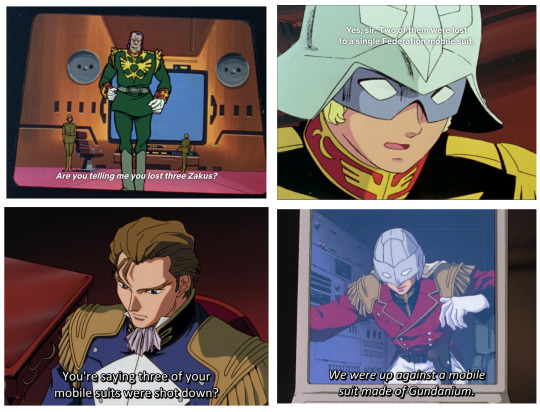
–Alright, okay. I see what you did there, Wing.
--The gentleman in Napoleonic cosplay is Treize Khushrenada. He is a Major General (for now) in the Alliance military (for now), and his eyebrows are so big because they are full of secrets.
He and Zechs are best buddies forever and ever, they have matching charm bracelets, and they can finish each other's sandwiches. Whenever these two are on screen together I am going to have to decipher every. single. word. because Treize and Zechs are ALREADY cryptic bastards, and when they're together they talk in friend-speak where only half of what they're communicating actually gets said.
Just this once, as a treat, they are having a fairly intelligible conversation. First one's free.
...But really Treize, taking a call DURING the performance? Bad form old chap, bad form.

SIDE NOTE: Based on the teeny tiny figures, this could maybe be Petrushka? And I desperately want this to be Petrushka because:
It means Treize has good taste
Petrushkranada
–To put this conversation in perspective: Gundanium is a very sophisticated type of semi-metallic ceramic-like compound that can only be refined correctly in outer space. Think of it as something you’d have to spend all your faculty funding on to buy a gram of for your science department. Suddenly, someone rolls up with a six-story building made out of the stuff. “You’ve got to be fucking kidding me” is the only appropriate response.
Treize: "Something like this never would have happened if you and I had been in OZ 15 years ago; that much is for certain."
--If I may humbly direct your attention to my Policy of Ignoring Stupid Shit, this one of the many reasons why we are going to glance at Zechs and Treize's canonical ages, do the math, realize that 15 years ago, Treize and Zechs would have been 9 and 4 years old respectively, and then we are going to gently slide those numbers into the garbage and crank them both up to a respectable adult age in our minds.
--OH RIGHT! OZ!! Remember, we were going to talk about OZ? Well, Treize is going to tell us about it here in a minute, I'm going to tell you about it now, because we need to know what OZ is in brief before we can make sense of this exchange:
OZ is a secret paramilitary organization hiding inside the official Earth Sphere Alliance military. As an organization, it's responsible for a great deal of clandestine political skullduggery and foul play that has left the Colonies and Earth in a state of easily-manipulated perpetual turmoil. OZ has been around for a while-- that's because its even MORE clandestine and sinister parent organization is even older. In its current incarnation, OZ is hiding out inside the elite mobile suit division called the "Specials", which Treize commands. In addition to being the Special's commander, he personally trained many of its top members when he was serving as an instructor at the Lake Victoria Military Academy. Zechs, and a number of other important characters we'll meet, all graduated from this academy under Treize's tutelage, and now serve him as elite mobile suit pilots in the Specials. Which is OZ. Which is the even more shadowy and sinister organization beneath that. It's a turducken of villainy.
What makes the Specials / OZ noteworthy in the ranks of the Alliance is that they are given free reign to act on their own initiative in combat. They don't answer to the Alliance military, they answer to Treize. This pisses a significant number of significant people off.
Treize pisses a significant number of significant people off. He's under the age of 65, which makes him an infant in the ranks of the brass. He's got elusive, powerful aristocratic backing that makes him untouchable. His followers are fanatically, and I mean FANATICALLY loyal to him. And he has the absolute chutzpah to be really good at everything he does. GOD he's the worst. His eyebrows are insured for $10,000.
--When Treize is lamenting that he and Zechs weren't in OZ fifteen years ago, he is referring to a very, very important sequence of events that began around AC 180 (give or take, if you're following my advice about stretching the timeline); events that brought the Earth and the Colonies within an arm's reach of unification and peace, only to be catastrophically and violently ripped apart, to the detriment of both.
(This is a very important date for Zechs, in particular. It's a very important date for the Gundams as well.)
Treize is making the point that if he and Zechs had been in charge back in the day, well, all this revolutionary sentiment wouldn't be necessary. We would have handled that mess far more sensibly, wouldn't we, Bestie?
-- Zechs has already absorbed this subtext and skips ahead to say "Gundams are on earth." Emphasizing that yes, shit really is popping off. The thing we heard scary bedtime stories about is real and it's happening and we get to be the ones to deal with it. Exciting times we're living in.
Treize: "I'm sure you're aware, but this is an important period. Do not do anything to anger the Alliance." Zechs, smirking: "I fully understand."
The Gundams aren't the only scary thing under the Alliance's bed. Lots of volatile elements are about to collide, all at once, very soon. Treize is just giving Zechs a wink and a nudge-- hey, I know you already know that big things are afoot, I trust you not to rock the boat too early.
--Oh! For the record, OZ stands for Organization of the Zodiac. You may have noticed that the two standard Mobile Suits we've been introduced to so far were called "Aries" and "Leo". OZ is inseparable from the history of Mobile Suit development, and all of its MS are therefore constellation-themed. ...But it's also just straight up a reference to "The Wizard of OZ", because OZ's signature mascot is--
--A LIIIIOOON!!!

...Yes! Thank you Tinylion, now we know why you're here. Back in your teapot now, sweetie. There you go.
--It's a lion, and the insignia for the OZ space corps is the Tin Man. The series lead scriptwriter Sumisawa loves him a book & film reference, you will find them all over Wing.
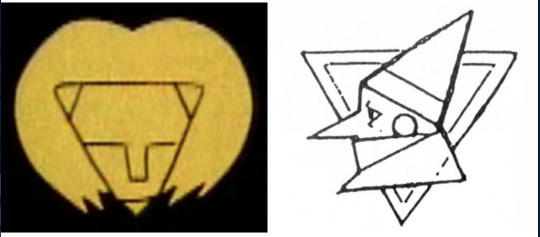
___
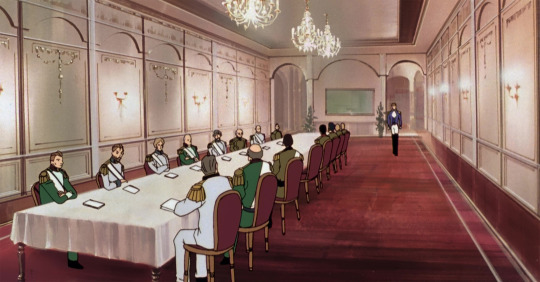
–Gosh, Treize is so SASSY in this episode. Look at this delinquent, showing up late for War Class because he was at a concert and on the phone with his boyfriend. Here he is giving lip to his supervisors, answering questions with totally undisguised disdain. He can’t keep getting away with it. He’s a naughty, naughty boy. Someone should teach him a lesson.
–God yes, General Septem. Fuck yes. The best worst voice acting in the show. Iconic. Immortal. Powerful. Showstopping. Brave. Go off, Nappa.
-VALUABLE KHAMBET RESAWRSEZ
–Treize is sitting at the war table like a fox in a chicken coop, biding his time and thinking: “I don’t owe these complacent, arrogant fools answers for anything. They haven’t left their desks in decades. They’ve never seen the cost of human life first hand. In the depths of their ignorance they think they’re the ones who can steer the course of the future. Hilarious. Thank god for Me.”

__
MEANWHILE: Relena is still on the beach trying to figure out what to do with this sick feral cat she found.
The TNR crew finally shows up with a kitty crate but the cat wakes up and tries to chew its own head off in self-defense. Having failed to die, it bites everyone, hijacks their car, and gets the fuck out of Dodge.
“Ma’am have you had all your shots?”
Relena is not listening. Relena is introducing herself to the Heero-shaped dust cloud that’s still lingering in the air, because what the fuck else are you gonna do.
__
Oh hey look it’s more Gundams!
The Gashapons of War have touched down in different parts of the world and set to work wreaking havoc immediately.
Unbeknownst to the Alliance or OZ, any appearance of coordination between the Gundams is an accident– none of them have any idea there are other Gundams besides their own.
They’re all in the same position as Heero: they refused the original premise of Operation Meteor and now they’re on borrowed time fighting whatever enemies come up on their radar. Each of them thinks they’re in this alone (except for Quatre, who has groupies).
However, just because the pilots aren’t coordinated doesn’t mean the mysterious people giving them orders are. But we'll learn more about that later.
--- Let's meet the rest of the Gundam boys!
–Duo: LEEEEROOOOY JENKINS we only get old memes in the colonies –Trowa: New phone, new name, new Gundam, who may I ask is calling –Wufei: Stealth missions are for casuals who can’t fight their way out of impossible odds. Skill issue. –Quatre: I am literally begging you to not fuck around so I don’t have to make you find out.
Speaking of Quatre: Hey! If this were a different series with a mature audience rating, this scene would be unmentionably gruesome!

___
-Awww, Soldier-I’ve-Named-Milo is bad at math! He’s just like me for real. Anyway, there are (4 + 1 = 5)....Five. Five Gundams total.
-Zechs correctly makes the assessment that the game has just changed, and it’s about to get extremely serious very quickly.

___
And now, the moment we’ve all been waiting for:

Spicy feral kitten arrives at Relena’s school. Relena is more confused than ever, but now this is officially a Mystery. She likes mysteries. She likes Mystery Boy. He’s the perfect foil for her, the main character, in this YA novel that she is the protagonist of.

Feral Mystery Boy suddenly makes it 100% publicly clear that he has no interest in playing nice, or in playing at all. Mystery Boy leans in real close, and says a thing that you might hear from, say, a guy in a black suit you accidentally witnessed murdering someone in a back alley, who then followed you to school.
The telenovela of Relena’s life is hitting its mid-season dark plot-twist, and
She.
Is
Loving.
It.
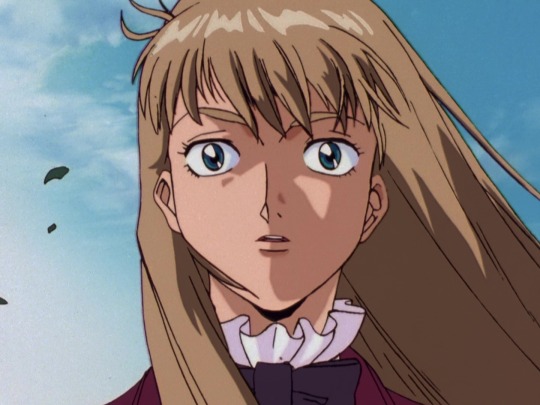
Tune in next week for Episodes 2 - 3!
~TinyOzLion, out.

#Parsing Post#Gundam Wing#Gundam Wing Meta#Gundam Meta#Gundam Wing Episode Guide#Episode Analysis#tinyozlion pgw
33 notes
·
View notes